
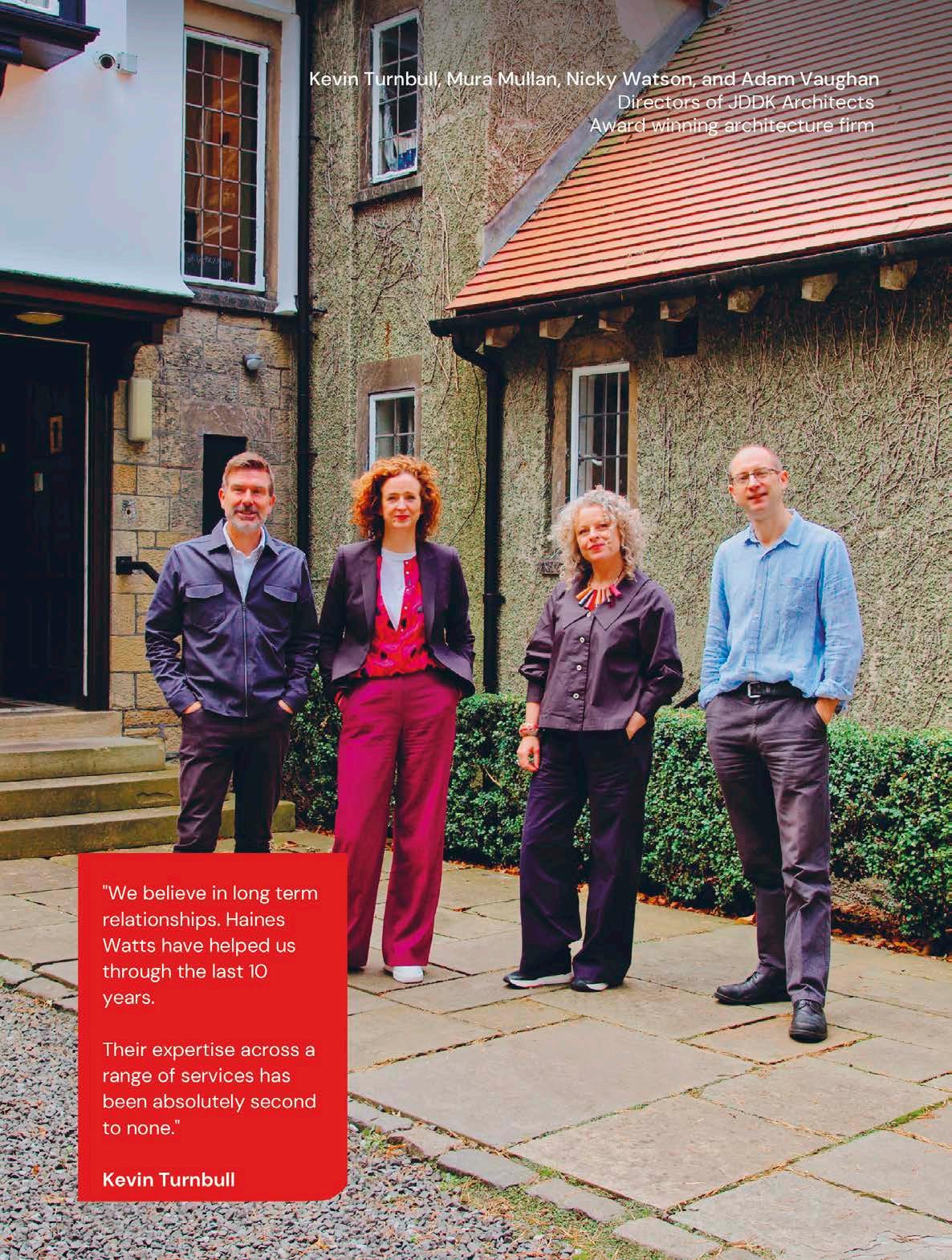
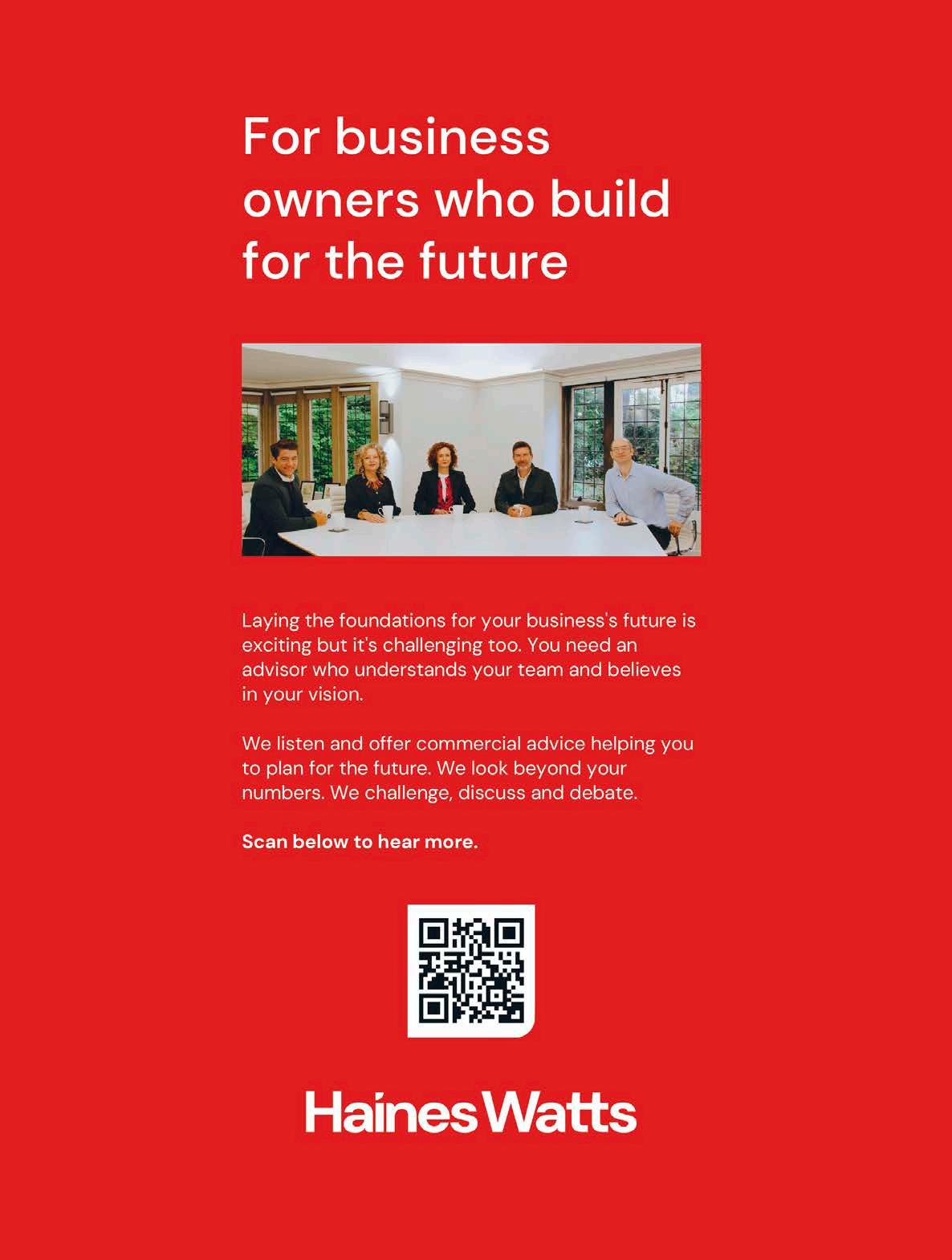



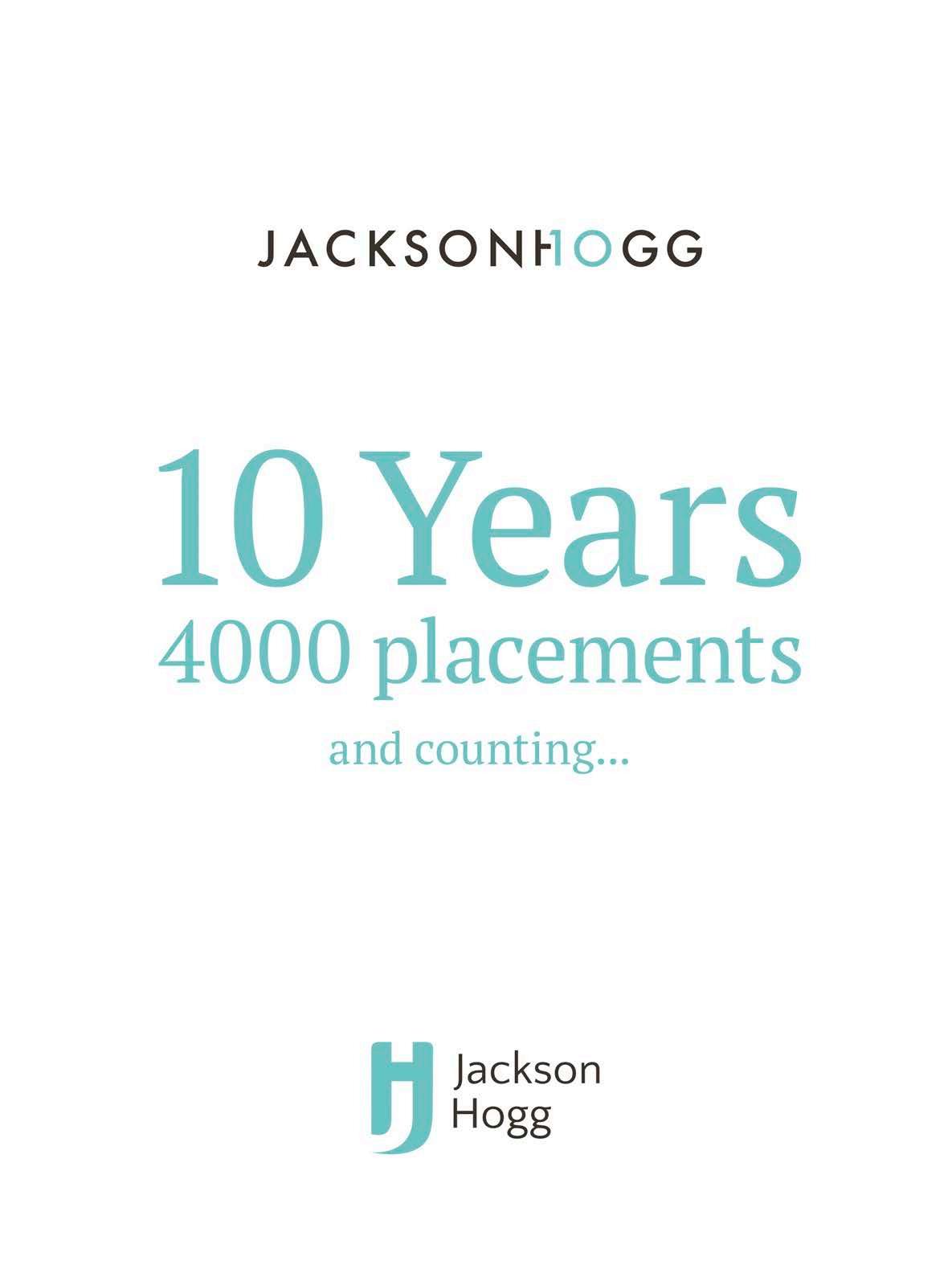
Editor
Steven Hugill steven@netimesmagazine.co.uk
Business journalist
Colin Young T: 07808 974 533 colin@netimesmagazine.co.uk
Head of creative
Ryan Errington ryan@netimesmagazine.co.uk
Business development director


John Duns T: 07920 152 523 john@netimesmagazine.co.uk
Managing director
Peter Mallon T: 07590 064 800 pete@netimesmagazine.co.uk
Partnership & marketing manager









Chloe Holmes T: 07493 555 509 chloe@netimesmagazine.co.uk
Accounts
Jill Brown jill@netimesmagazine.co.uk
Filmography Andrew Lowe andrew@netimesmagazine.co.uk
Contributors: Charlotte Fox Matthew Smith Ian Murtagh John Reece
Photography: Christopher Owens www.christopherjamesowens.co.uk Angela Carrington www.thisisthebiggerpicture.co.uk
Head office
0.09 PROTO, Baltic Business Quarter, Abbot's Hill, Gateshead, Tyne and Wear, NE8 3DF
All rights reserved. Reproduction, in whole or in part without written permission, is strictly prohibited.
Circulation:
To confirm our circulation please contact Andrew Dunn, Stephens and George Print Group, email: andrew.dunn@stephensandgeorge.co.uk
To amend your mailing address or remove yourself from our mailing list contact chloe@netimesmagazine.co.uk
Contact: @NETimesmagazine enquiries@netimesmagazine.co.uk www.netimesmagazine.co.uk
Photography: All photos taken by North East Times staff are copyright North East Times Magazine Ltd, and are taken solely for use in North East Times Magazine or products published by North East Times Magazine Ltd.
If you wish to use or publish a photograph taken for North East Times, please contact pete@netimesmagazine.co.uk

Advertising charges:
There is a £25 charge for every set of amendments, following the first initial set of amendments, which is free of charge for adverts designed by North East Times Magazine Ltd.
Cancellations:
If an advert is cancelled by the booker within a seven day period prior to our print deadline, the advert will be charged in full, plus VAT.
Editorial:
Editorial must be received by the 9th of the month or no responsibility is accepted for errors. The opinions expressed in this issue are not necessarily the views held by North East Times Magazine Ltd.
Strategic partners Partners
Advertisements:
Although every care is taken to ensure accuracy, the publishers regret that they cannot accept responsibility for loss or damage caused by an error in the printing or damage to, loss of artwork, transparencies or photos.
Complaints:
Regarding advertisements will only be considered for up to a week after publication. Advertising must be received by the 12th of the month. No responsibility is accepted for errors.
Print:
North East Times is printed by Stephens & George Limited, a fourth-generation, award-winning printer based in Merthyr Tydfil, South Wales, which is a specialist in sheet-fed lithographic printing of magazines, brochures and programmes.
North East Times is produced using vegetablebased inks combined with innovative chemical-free plate and Heidelberg press technology.
All papers are sourced from well-managed, sustainable forests and Stephens & George’s vast supply chain holds many environmental accreditations.
In addition to this, they hold a Climate Change Agreement along with ISO14001, ISO9001, FSC, PEFC and offer Carbon Balancing via The World Land Trust.

They achieved an E2B Silver award for energy improvements along with an E2B Gold award for recycling; 98.5 per cent of all their waste is recycled.

www.stephensandgeorge.co.uk
@2022 Published by North East Times Magazine Ltd.
8
Credits
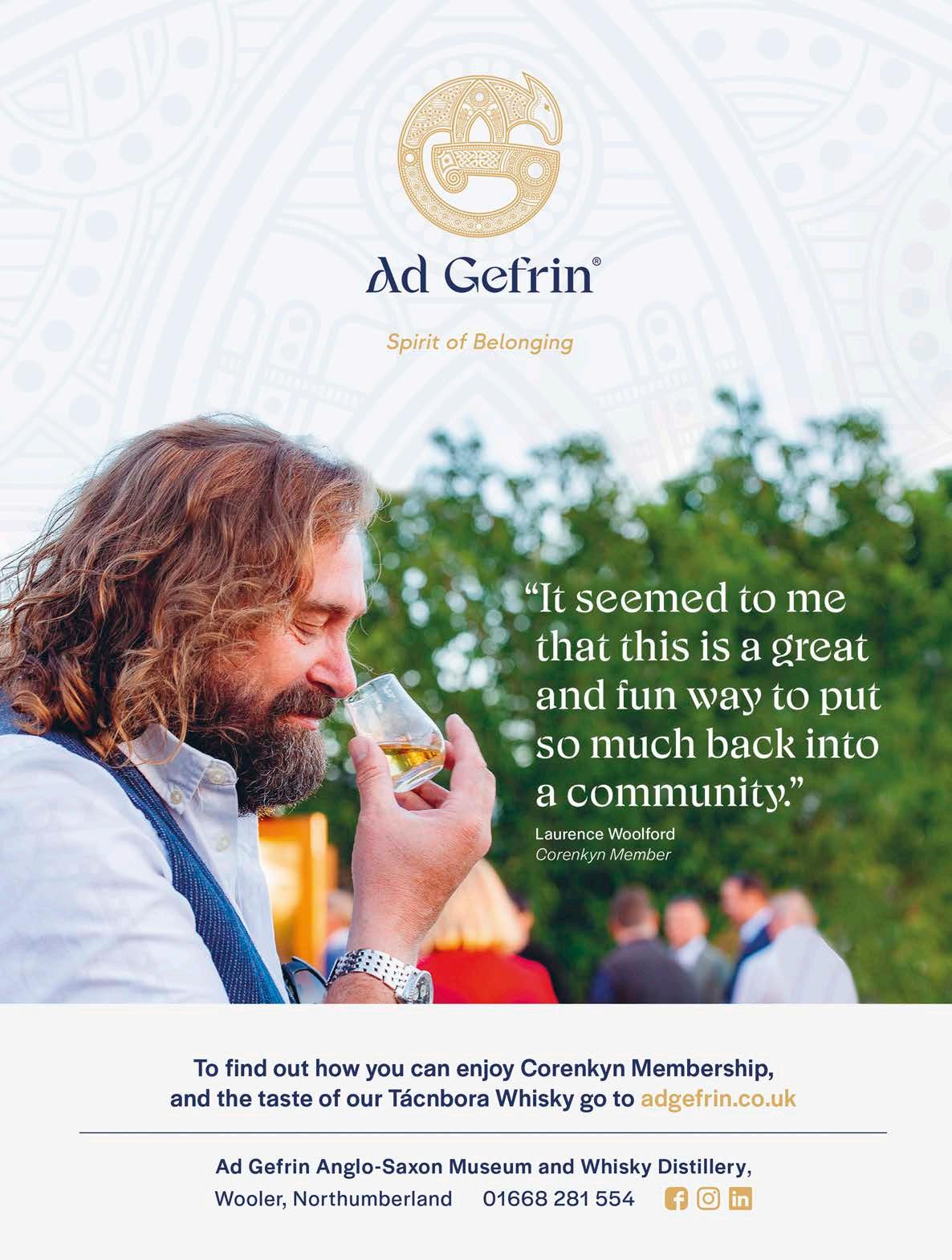

4Politics, eh?
Such has been the extraordinary turbulence of recent weeks, I welcome you to this edition with a nod to a metaphorical disclaimer notice.
With Liz Truss having taken a wrecking ball to the economy, thrown the guy pulling its levers under an accompanying steamroller and seen her second Chancellor tear her economic blueprint to shreds, and then seen Rishi Sunak crowned the Tories' latest leader, we’ve endeavoured to ensure our coverage mirrors the Westminster spin cycle as closely as possible.
Any (further) U-turns, of course, are out of our control…
So, where to start?
Well, watching Truss announce her resignation in typically wooden fashion, I was reminded of a time, in the summer, when she wasn’t fissuring market confidence and ripping the country - and the Conservatives - apart, when instead we had the rubble and debris of Boris Johnson’s final days in office.
Back then, I wrote a piece about Kwasi Kwarteng, who had joined guests at a ceremony to welcome a business to Teesside.
As he smiled and nodded to fellow dignitaries, a school band performed World in Union across the way, providing a perfect backdrop for a quip about Government harmony.
He used his platform that day to call for a new era of stability, before a few
days later putting his political chips on Truss’ number.
Oh, how the circle turns…
Such has been the magnitude of recent weeks that we devote a number of pages to the political scene in this edition, from a new feature - Talking Point - which assesses the impact of the Government’s fiscal floundering, to a focus on Durham-based lender Atom, which, like many others in its sector, was forced to step back from the mortgage market.
We also carry an exclusive piece with Private Eye editor and Have I Got News For You captain Ian Hislop, and Sunday Times cartoonist Nick Newman, who laugh about recent events having done their job for them, and use another fresh platform - The Big Question - to gauge business leaders’ reaction to the parliamentary soap opera.
Away from Downing Street, and providing a sense of some normality in the chaos, we highlight the world of entrepreneurship.
As a fashion-conscious seven-yearold, Charlotte Staerck was teased by classmates for taking what she believed was a designer handbag to school.
The mocking, however, has since transformed into marvelling, with The Handbag Clinic, Charlotte’s Hobsonbased business, a global player in the luxury tote market and a pioneer of eco-friendlier fashion.
And, revealing to North East Times Magazine that a second funding drive
is imminent, she says its growth is only set to continue.
We also chat to James Craggs and Tautvydas Baranauskas, co-founders of Gateshead-based video production company Motif, to learn more about their journey from a start-up founded in the middle of COVID-19 with a few thousand pounds, to the Qatar World Cup, via Croatia and a famous Clapham barber...
Remaining with football, we speak to Darren Eales, Newcastle United’s new chief executive, about his vision for the club, which, among other things includes - breathe easy Magpies fansstaying at St James’ Park.
Of course, to write about the club is to write about its Saudi-backed ownership and the associated arguments around geo-politics and sportswashing, and we ask Darren about the matter in the piece.
Finally, and it’s certainly a case of last and not least, we look at how the North East can stand at the vanguard of global, environmentally-focused progress across the next ten years, through our exciting VISION 2031 campaign.
Using expert insight, taken from a roundtable discussion featuring business leaders from across the region, the feature lays out a blueprint for our area to spearhead the green industrial revolution.
Steven
11
I hope you enjoy this issue.
Steven Hugill wonders where to begin when a Prime Minister’s regime lasts fewer days than the period it took to elect her…
editor’s WORD
WELCOME TO ISSUE 455
FOR FOUNDERS, THINKERS, LEADERS,
the innovators,
CREATORS, ENTREPRENEURS & DOERS


We have embraced a new way of thinking about regional print and its evolution for the next generation. We are firmly committed to being the voice of the region’s business community and championing our area’s industry, creativity and innovation.

12
www.netimesmagazine.co.uk
13 455 Make
an impact
Looking to a new year
4
As another year end looms, and we reach for the promise of another new start, I thought it was an opportune time to reflect on the last 12 months.
At times, it has felt like one step forward, two steps back!
When once again change has been the only constant, it’s been another year of navigating new challenges, and looking for new ways to platform the innovation, forward-thinking mindset and steadfast grit of North East businesses and its people.
And there’s so much to celebrate; our commitment to sharing the journey of entrepreneurs, industry leaders and innovators remains unwavering.
We will continue producing explorative interviews with the people rising to challenges and seizing opportunities across the North East.
We often muse if anyone notices,
but our 40 per cent commitment to independent print coverage has not changed.
In less journalistic terms, this means the three main interview features in every issue are not sponsored, paid-for, or commercially supported. And this includes our cover.
This makes sure things are on our terms, meaning we can tell a story without caveats, to highlight the good and bad of the rollercoaster that leads to triumph.
It is a huge investment. And it will never change.
Almost two years ago, I considered what might be the future of print, and it’s a conversation we are still exploring now.
Print is an opportunity to pause from the digital noise, to step back and consider a story at a more measured pace.
And we’re continuing to find that readers are appreciative of this medium.
And, to take things a step further, we have bolstered our events programme, cultivating an environment that allows for more conversations, drives debate, and shares best practice.
It represents an exciting opportunity as we look ahead to our next 12 months.
There are far too many to name, but there are so many people who support us as a team, whether they’re cheerleading from the bleachers, or offering words of wisdom in the moments we need it.
We can’t thank our partners and advertisers enough, the businesses who advocate for us, and, of course, you, our valued readership.
And we look forward to working with you all in 2023!
Chloe Holmes Partnership and marketing manager
14 North East Times Magazine Looking to a new year_
Chloe Holmes reflects on the learnings of the past two years, and how they continue to guide the future of North East Times Magazine.

p. 022-023
p. 036-037 p. 038-043









With Liz Truss having resigned, and Rishi Sunak installed as the next Conservative leaderand Prime Minister, Steven Hugill reflects on another calamitous period for British politics and says the time has come for decisive change.
Words by Steven Hugill
If a week is a long time in politics, then what of the last two months, following the disastrous impact of the Government’s mini-budget?

 Words by Steven Hugill
Words by Steven Hugill










Launched as the UK’s first app-based bank, Atom arrived on the financial scene with a promise to transform the face of saving and lending. Six years later, and with a balance sheet of more than £5 billion, the Durham operator has done just that.
 Words by Steven Hugill
Words by Steven Hugill
Time to get real


Stopping the walls from closing in...
Investing for the future



16
Contents
p. 052-055 p. 058-063 p. 100-105
With offices nestled between Newcastle’s past and present, independent Chartered accountancy and business advisory firm UNW is well versed in the city’sand wider region’schanging landscape.
North East Times Magazine campaign


A proposition unlike others
Words by Colin Young Charlotte Staerck has gone from playground provocation to the vanguard of sustainable luxury. Once mocked for taking a handbag to school, she has transformed her passion for style into The Handbag Clinic, which is leading the way on eco-friendlier fashion.
 Words by Steven Hugill
Words by Steven Hugill
The film industry is alive and kicking in the North East. And young, ambitious companies like Motif are thriving in the sector and helping put the region on the map. From their small, but expanding, base in Gateshead, James Craggs and Tautvydas Baranauskas are producing clever and innovative features which are taking the film and football worlds by storm.
A design for life
Thinking outside the box
17
Contents
Business spotlight
A budget airline says it will double North East passenger numbers to more than one million after launching fresh flights – but has warned further growth will remain stymied until the Government scraps a costly levy.
Ryanair has introduced six new winter routes at Newcastle International Airport to destinations including Barcelona and Milan.
The Irish carrier told North East Times Magazine the “record” move – which comes after it last year opened a 60-job, twoaircraft base at the site – will propel fliers beyond the seven figure mark in a move that is “very good news for the North East”.
But Jason McGuinness, the firm’s director of commercial, said the picture would be brighter still if the Government axed the controversial air passenger duty (APD) – which applies a £13 charge to EU flights and services to Iceland, Liechtenstein and Norway – revealing it is stopping the airline from running more planes and routes from the region.
He said: “Without APD at Newcastle, rather than two aircraft, I think we could have had anywhere between three and five.
“And rather than 19 routes over the summer, it could have been closer to between 30 and 40.”
The Government previously committed to slashing APD by half for domestic routes, with the move due to come into effect next year.
However, Jason said it doesn’t extend far enough, arguing that until APD is fully abolished, the airline – and the aviation bases it serves, which include Newcastle and Teesside International Airport – will remain somewhat hamstrung.
He said: “Regional airports are currently at a significant disadvantage to their European counterparts because of the £13 tax.
“European capacity is probably somewhere between 15 and 20 per cent lower than where it was prior to the pandemic, and airports are competing for that.
“But bases like Newcastle and Teesside have, in some ways, one hand tied behind their backs because of APD – it isn’t a level playing field.
“If the new Government is serious about levelling-up, one of the first things it should do is abolish APD.”
The warning was issued as Ryanair unveiled its Newcastle winter 2022 schedule, which covers 15 routes and includes six new trips to destinations including Riga, Fuerteventura and Gran Canaria.

Jason added: “It’s a big vote of confidence in Newcastle, and the North East as a whole.
“There are some choppy waters ahead.
“There is a cost of living crisis and a war in Ukraine, and it would be remiss of us not to be a little cautious heading into the winter.
“But we do so with experience of recessionary periods.
“We know people become much more price sensitive and look for reliability – and that is what we deliver.”
18
North East Times Magazine throws a spotlight on the latest news, views, trends and technologies shaping the region’s economic and business landscape
Business Spotlight_
Ryanair ‘will fly beyond one million passenger mark’ - but warns over Government tax Aviation
Ryanair has unveiled new winter flights from Newcastle International Airport, and said services could further takeoff if the Government scraps air passenger duty
Jobs saved as building supplies firm rescued Finance
A number of jobs have been saved after a Northumberland construction tools and materials company was rescued from administration.
Cramlington-based Wack Wholesale (Building Supplies) is under new ownership, having run into financial difficulties following the COVID-19 pandemic.
The deal for the company, based on Nelson Industrial Estate, has preserved 14 roles.
Challenger bank looks to future after licence success Banking
A challenger bank pledging a £3 billion property sector boost “will always be bigger than money” and is committed to making investments that will “make a long-lasting contribution to society”, its co-founder has told North East Times Magazine.
Dr Emma Black says Middlesbroughheadquartered GB Bank “wants to make the biggest, positive impact it can” after securing its full UK licence.
The lender aims to drive new growth across the built environment sector, with its multi-billion-pound commitment - set across five years - earmarked to create more than 100,000 jobs, several million square feet of office space and 20,000 homes.
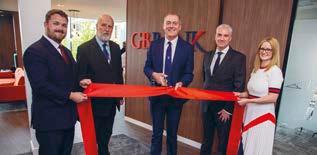
Offering property developers innovative finance solutions between £500,000 and £5 million, it says it will support regional property developers, construction companies and small and medium-sized businesses that have long suffered from industry financial ambiguity.
Dr Black said: “There are great opportunities, and we’ve recruited people who are very passionate about seizing those opportunities, and very passionate about property.
Dr Emma Black, GB Bank co-founder, far right, and chief executive Stephen Lancaster, second from right, pictured earlier this year at the opening of the lender’s Middlesbrough office, alongside, from left, co-founder Stephen Black, Councillor David Coupe, chair of Teesside Pension Fund Committee, and Middlesbrough Mayor Andy Preston
And Dr Black said the lender is well placed to surmount market turbulence.
She said: “We don’t know how market shifts are going to settle, but whatever happens, our adaptability will kick in."
Stephen Lancaster, the bank’s chief executive, said it was filling a vital community void left open by traditional lenders.
He added: “There is so much demand for housing, work places and other development, and there are so many people passionate about repurposing historic buildings, who have been unable to get the finance to do it.
“For too long, banks have taken for granted the people element of their business.
Its sale was supported by Gateshead-based administrator Leonard Curtis and a team from Newcastle law firm Womble Bond Dickinson’s restructuring and insolvency department.
Julian Gill, a partner in the latter [pictured, above], said: “This has safeguarded the future of one of the UK’s largest business supplies companies."
Iain Nairn, Leonard Curtis joint administrator, added: “We are grateful to the team at Womble Bond Dickinson for their support.

“Their knowledge and expertise meant we were able to conclude a quick sale with the buyer, and a new company is now well placed to grow the business over the coming years.”
“We want to work with developers to understand their ambitions and the jobs they want to create, and tell those stories as we grow.”
Thoughtworks makes jobs move after office switch
Technology
A global technology consultancy has pledged to create scores of jobs in an office expansion. Thoughtworks says it will take on 80 people to complement a move to a site on Newcastle’s Grey Street.
The plans come after the business last year unveiled a blueprint to recruit 100 staff by 2024 to deliver operations from the region. Bosses say roles will cover junior and senior positions, and include places on the company's Thoughtworks University entry-level programme, which trains
“And that is why there is genuine interest in what we are doing.
“We’re committed to understanding what our customers want to achieve, and then helping them get from A to B.”
recruits in technical and consulting skills.
Matt Simons, Thoughtworks’ market director, said: “As Newcastle continues its rise as a leading UK tech hub, we will look to make a tangible contribution to the region's growth.
“We are keen to further expand and invest in the area.”
Dawn Dunn, Invest Newcastle digital and tech sector lead, added: "This new base positions Thoughtworks as an integral part of Newcastle's growing tech ecosystem.
“And its entry-level programme will play a critical role in the development of our city's future tech talent pipeline.”
19
Business Spotlight_
Business Spotlight_
Contractor to help build skills in £15 million academy deal
Construction
A contractor has been appointed to create a £15 million skills hub focused on nurturing the house builders of tomorrow.
Tolent will design and construct the Housing Innovation and Construction Skills Academy (HICSA), in Sunderland.
Bosses say the base will provide “worldclass training” and “next generation skills for next generation homes”.
When completed, they say HICSAwhich has been backed by Government cash - will support the development of scores of eco-friendly homes planned for Riverside Sunderland and the city centre.
The academy will be operated by Sunderland College, with support from education and industry partners including the George Clark-led Ministry of Building Innovation and Education.
Construction is earmarked to begin later this year.
Councillor Graeme Miller, leader of Sunderland City Council, which appointed Tolent to deliver the building, said: “This is a development that is of huge significance to the city – it will fuel construction skills that will make Sunderland a leader in modern methods of construction and retrofit.”
North East 'pushing ahead on innovation' Innovation
North East businesses are leading the way in innovation, according to one of the main Government agencies providing support for innovation growth and development.
Innovate UK EDGE held its annual two-day conference at Sage Gateshead recently, uniting innovation and growth specialists under one roof.
The conference, which launched with a keynote speech from Innovate UK chief executive Indro Mukerjee and a round table with several leading North East businesses, brought together Innovate UK’s teams of innovation and growth specialists who are located across the regions and nations of the UK, with their innovation heroes, the businesses they support.
Innovate UK supports and invests in the country’s most dynamic companies, so they can grow and scale quickly and take the benefits of their ventures across the UK and globally, driving UK competitive advantage and prosperity.
Maxine Adam, deputy director for business growth at Innovate UK, said the event had been a huge success, showcasing the work of Innovate UK and the innovative SMEs supported by the organisation.
seeing the whole Innovate UK EDGE network coming together and really understanding the power they have to support our mission.
“We talk a lot about being at the business-end of innovation, and when you see 400-plus people together, all focused on making that happen, and absolutely passionate about the power of innovation to do that, driving economic and social impact, it is wonderful.
“We heard from a number of businesses from the North East, and what really struck me, was they said it is not all about the money or grants we provide.
“They said the money is nice but it was the hand-holding connections, the focus on strategic planning and followon investment and just making sure they have the right help so the journey carries on.
“What also came through is the ability we have to listen and flex.
“It is not about ‘programmes’ to help businesses grow, but being able to respond to what they need in their particular growth trajectory.”
Innovate UK EDGE supports around 7000 companies across the country each year, providing intensive growth and scale support to nearly half of those.

At present, there are 309 companies in the North East receiving such additional support.
AV Dawson expands with Cobra agreement
Investment
A distribution firm says it has “unlocked further opportunities” for expansion after completing a deal for a road salt and fertiliser handler.
AV Dawson has bought Cobra Middlesbrough.
Bosses say the move will add eight acres to AV Dawson’s Port of Middlesbrough base, on the River Tees.
Gary Dawson, AV Dawson managing director, said: “Bringing operations together enables us to provide job security while delivering greater efficiencies for customers.”
She told North East Times Magazine: “The highlight of the conference for me was actually
• See www.netimesmagazine.co.uk for an in-depth feature with Maxine Adam on the work of Innovate UK
20
Council cuts ribbon on £8.3 million business hub Built Environment

A local authority has officially opened an £8.3 million business space to help the firms of tomorrow “flourish”.
Darlington Borough Council has cut the ribbon on Innovation Central.
The base, on the town’s Central Park site, includes 45 offices and five labs, which bosses say offer room for start-up companies and SMEs keen to join the town’s expanding life science cluster.
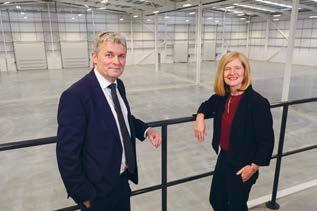
And they say it will further strengthen the town’s reputation as a hothouse for company growth by complementing the neighbouring Business Central commercial hub.
The development also builds on Darlington’s increasing national stature
as a business and financial hotspot, with Government departments, including the Treasury, continuing to bring high-level operations to the town.
In Brief
A selected round-up of stories from across the region
4Family-run transport company Moody Logistics and Storage is spending £1 million on its fleet to meet growing demand. Caroline Moody, managing director of the Cramlington company, said: “This underlines our confidence in the continued growth of the business.”
4Durham’s Artech Lighting is supplying fittings to Newcastle’s Bank House development, the first phase of the Pilgrim Place scheme, which bosses say will deliver more than 400,000sq ft of office space.
Jobs in pipeline after factory completion Development
More than 100 jobs could be created at a £4.5 million factory.
UK Land Estates has completed work on a 48,666sq ft Tyne Tunnel Trading Estate unit.
Bosses are now in advanced talks with a potential tenant for the building, known as L6, revealing it could house as many as 125 staff.
The development was partly funded by a £731,818 grant from the North East Local Enterprise Partnership via the Governmentbacked Getting Building Fund.
Nova’s star rises with £5.25 million backing Environment
A waste-to-energy operator has revealed factory and job plans after securing £5.25 million support.
Nova Pangaea Technologies aims to create its first commercial plant next year to bolster clean power and biomass developments.
The business, based at Wilton, near Redcar, converts woody and agricultural residues into products to make sustainable aviation fuel (SAF) and biochemicals, as well as Biochar, which is used for carbon dioxide removal and soil enhancement.
The firm is also part of the Project Speedbird partnership, alongside British Airways and LanzaJet, which aims to develop SAF for UK commercial use.
Its £5.25 million injection was secured in a funding round led by Mercia Asset Management, Par Equity and NPIF –Mercia Equity Finance.
Sarah Ellerby, Nova Pangaea Technologies' chief executive, said: "This bridge funding will assist with the required resourcing plan to execute on the next phase of the business.”
4Eaglescliffe-based car parts maker Nifco UK says it “expects to reap huge rewards as conditions improve” after the global automotive sector’s welldocumented semi-conductor shortage knocked annual sales down a gear.
4A Northumberland seat maker has opened a German distribution centre. Bazaar Group says the move will help fulfil its goal of becoming a “genuinely panEuropean furnishings business”.
4An energy sector support services firm has secured a contract to operate the SEAL pipeline. Stockton-based PX Group’s Energy24 subsidiary is overseeing the link, which moves gas from the Aberdeen coast to a Norfolk processing terminal.
For more news and views across the North East, visit our website @ www.netimesmagazine.co.uk/news
21
Innovation Central is the latest addition to Darlington’s commercial landscape, which already includes Business Central and a number of Government departments
Tim Witty, UK Land Estates’ development director, with Helen Golightly, North East Local Enterprise Partnership chief executive, inside the L6 building
Business Spotlight_
Opinion POLITICS
Time to get real
With Liz Truss having resigned, and Rishi Sunak installed as the next Conservative leader - and Prime Minister, Steven Hugill reflects on another calamitous period for British politics and says the time has come for decisive change.
4It’s not real, is it?

It must be. Actually, maybe it isn’t.
Even after Liz Truss had resigned, I couldn’t make it stick; it was like the information and images spooling out in front of me were somehow detached from reality.
And then it happened.
Watching the shortest-ever serving Prime Minister disappear back into Number Ten, after rewinding the country’s financial standing, sent me journeying backwards too, to a lecture hall and an essay.
And Jean Baudrillard.
Back in my university days, I remember one particular term spent decrying the apparent madness of this French theorist and his hyperreality principle, determining there and then that once the paper I was labouring to finish was handed in, I’d never seek to look him up again.
For days, he tied me in knots. I just couldn’t get it.
And when I found out he was born in Reims, France’s Champagne capital, I convinced myself he’d over-imbibed on the fizzy stuff, and it was, therefore, all some kind of alcohol-fuelled nonsense.
And yet, a decade-and-a-half later, here I was thinking of him, the seal ripped away by the Westminster maelstrom.
Famously, Baudrillard claimed the first Gulf War didn’t exist, that it was a prepared simulation for the benefit of media output and re-enacted as a news event, the real rubbed out and replaced with imagery.
And it all came flooding back just before Halloween, as Liz Truss performed her own Nightmare on Downing Street, slashing and burning the economy and putting the frighteners up everyone like some budget Freddy Kreuger.
It was such an unreal period - not least because her tenure lasted fewer days than it took to appoint her - that it put me in mind of The Truman Show, the late-1990s film whose main character is unsuspectingly trapped in a world of artificiality for television viewers’ benefit.
Every time I watched Truss at the despatch box, it felt like we’d been unknowingly cast in the sequel, an allseeing, yet unseen, director storyboarding live from a gantry, watching for our reactions, our recoiling at the next twist.
‘Let’s put Theresa May in charge and see how they cope with some slow-burning
Words by Steven Hugill
desolation’, I could hear them chuckle.
‘No, no, wait - I’ve got a better idea’, they would go on.
‘Let’s go with some brazen bullshittery under Boris Johnson, and then an absolute clusterfuck of Liz Truss!’
However, unlike Jim Carrey’s character in the psychological satire, instead of a well put together performance, we’ve been treated to an expensively-funded, terribly acted and appallingly directed parody, in which - unlike Truman - we’ve never had a door to escape the charade.
And nor do we still.
With the Tories pressing ahead to appoint another Prime Minister without any electorate input, the wheel spins again.
But it shouldn’t.
The country needs a General Election.
Because, let’s be honest, after 12 years of Tory rule, what, really, have we got to show for it?
‘Brexit!’, I hear a voice shout from the back of the room.



















In the way an old geography teacher of mine wrote students’ answers on the other side of his white board, so as not to hurt
their feelings, you can have that one.
But look at what it’s given us. Or taken away, to be more precise.
Ever since David Cameron left the EU exit door ajar, the UK has been stuck in a plodding regression, made worse by the Government’s cack-handed attempts to secure a Brexit deal.
Truss’ economic plans merely provided a coup de grâce.
So, what do we have?
Well, beyond another Prime Minister the country didn’t elect, we’ve got a knackered economy, a population wondering how the hell they’re going to afford energy bills over the winter - never mind if their savings, pensions and mortgage offers will surviveand a social care system on its knees.
Parochially, you could look at Teesside and say Conservative rule - aided in no small part by a blue rosette-wearing mayor - has funnelled cash into an area that would have otherwise missed out, but that would be, well, parochial.
Like many Governments that serve a lengthy period, this one is now tired and stale.
It has lost grandees like Kenneth Clarke
and younger talent such as Rory Stewart, it’s got some MPs threatening to cross the divide, others assessing their political futures entirely.
It has reached a dead-end, one in which no amount of U-turns can reverse, no amount of policy recycling and minister seat shuffling can rescue.
In the latest cabinet reshuffle, we've got Suella Braverman back, with serial office holder Michael Gove making (yet another) return.
Honestly...
The country has had enough.
What happens if Sunak fails?

Do we fire up the merry-go-round yet again, and watch as ministers line up behind one candidate before dramatically – and conveniently – changing their tune at the 11th hour, when their preferred choice is bounced out of proceedings?
The country needs a change.
Truman was lucky. He got out.
As things stand, though, we can’t.
We’re still stuck on set, awaiting the next instalment from those unseen gantry dwellers.
It’s time to pull the plug and get real.
Providing care for all Wellbeing
For a good while now, the ‘levelling-up’ agenda has provided the Government with a convenient prop to wave in front of the regions whenever its commitment to fostering greater economic and social equality across the country has been called into question.
Yet, in a world where the focus on ensuring good mental health and wellbeing has never been so strong, it is particularly remiss that Downing Street’s flagship regional equalising strategy has no mention of suicide in its many pages.
Its exclusion is even more pronounced against the backdrop of the ongoing cost of living crisis, so recently compounded by the chaos of the mini-budget.
Michael Gove has been appointed (again) to oversee the 'levelling-up' agenda, and it is imperative he ensures a focus on suicide prevention and good mental health is a cornerstone of policies going forward.
Words by Matthew Smith Co-founder of If U Care Share Foundation
Support shouldn’t depend on a person’s postcode

Having recently completed a near 300-mile run to Downing Street to petition the Government to make suicide prevention a key chapter in its ‘levelling-up’ agenda, Matthew Smith, co-founder of If U Care Share Foundation, tells North East Times Magazine why his feats - which raised more than £30,000 for the charity - must act as a starting gun for Downing Street to provide more help to people in the North East.
4It may not surprise you that running from Chester-le-Street to Downing Street is one of the hardest things I’ve ever done.
It seemed like a good idea when we started organising the 289-mile trek - a year after snapping my achilles playing local league football - with the intention of raising awareness of mental health and suicide prevention provision in the region, and funds for If U Care Share Foundation.
And then we read that the word suicide wasn’t even included in the Government’s ‘levelling-up’ white paper.
Suicide is the biggest killer of young men across the North East, North West and Scotland.
Latest figures from the Office for National Statistics show the North East had the highest suicide rate (13.3 per 100,000) in 2020 - an increase of 15.7 per cent compared to the previous year.
Sadly, this has now been the case for our region in five out of the last ten years.
And so we drew up a letter, which I signed on behalf of If U Care Share Foundation, alongside Samaritans, Beyond, Chasing the Stigma, PAPYRUS Prevention of Young Suicide, James’ Place, Harmless, CALM, Rose Paterson Trust and the CSJ Foundation.
It was during this period that Boris Johnson was ousted and, as we left Chester-le-Street in late August, we had no idea whether his replacement would be Liz Truss or Rishi Sunak. We added Truss’
name as we concluded the run.
Given her busy schedule, it wasn’t possible to hand the letter in at Number Ten, but, thanks to North Durham MP Kevan Jones, we were able to meet Commons Speaker Sir Lindsay Hoyle.
Towards the end of October, Kevan personally delivered the letter to new Prime Minister Rishi Sunak, and he is hopeful of a positive response soon.
Below are some excerpts from the letter.
'At present, there is no mention of suicide prevention in either the ‘levellingup’ bill or white paper.
'We urge you to ensure it is integrated into the agenda.
'Policy intervention to prevent more deaths by suicide must be prioritised, particularly in the poorest areas; the adequacy and level of support should not depend on someone’s postcode'.
If U Care Share Foundation was established 16 years ago, when my brother Daniel took his own life, to support those bereaved by, or at risk of, suicide, and preventing any family from experiencing what we went through.

Since then, the charity has provided support to those who have lost loved ones, as well as help and advice to those who are at risk of taking their own life.
And to help us make more progress, we hope the Government will take notice and prioritise suicide prevention in the ‘levelling-up’ agenda.
24
Guest contributor Matthew Smith_
A tonic for change
The North East has long been known for its innovative qualities.
And now, its healthcare service is extending that legacy, with the Newcastle upon Tyne Hospitals NHS Foundation Trust a test-bed site and key player in the NHS England Clinical Entrepreneur Programme.
Delivered by NHS England’s innovation, research and life sciences group alongside Anglia Ruskin
University, bosses describe the latter venture as the largest entrepreneurial workforce development programme of its kind.
Aiming to provide the commercial skills, knowledge and experience needed to find solutions for challenges facing the NHS, it offers mentoring, networking and training to develop ideas into products and businesses for patients’ benefit.
access to continued professional development opportunities via a technology platform.
Users create their own profile and the website searches and signposts them to relevant courses in the region, nationally and internationally.
They are then automatically notified of new events which ‘match’ their subjects of interest.
The platform supports global, equitable access to healthcare training, allowing people from all over the world to access courses and opportunities.
This aligns with our Clinical Skills Academy, which is leading the design and delivery of a 21st century curriculum to provide people in healthcare with the right knowledge and expertise to ensure the highest standards in patient care.
Words by Charlotte Fox
Newcastle upon Tyne Hospitals NHS Foundation Trust commercial enterprise team’s business innovation manager

Leading the way on innovation
With Newcastle upon Tyne Hospitals NHS Foundation Trust one of ten test-bed sites across the country for healthcare development, Charlotte Fox, the operator’s commercial enterprise team business innovation manager, tells North East Times Magazine why the organisation is primed to continue leading the way when it comes to pioneering interventions and skills development.
4Innovation in healthcare is the driving force behind providing the best outcomes for patients.
My role is all about supporting innovators at Newcastle Hospitals to make their ideas a reality, to work in partnership with industry and play an active role in collaborating with colleagues throughout the regional and national health and care system.

Ultimately, our aim is to reduce inequalities and improve the health of people in the North East, in a sustainable and high-quality way.
As part of the wider commercial enterprise team, I work with colleagues,
SMEs and industry to understand what the issues are – finding the pinch points, the problems and seeking out those innovative solutions to help bring bright ideas through.
And where the ideas don’t yet exist, we look at how to create them through conversations, events and collaboration.
At Newcastle Hospitals, we’re working with some talented innovators within our region and beyond, to test and evaluate their ideas and roll them out to make a difference for patients, families and staff, as part of the NHS England Clinical Entrepreneur Programme.
The first - CPDmatch - the brainchild of Dr Richard Hixson, provides equitable
The academy will launch at the end of 2022, and will be accessible via a website, which incorporates the CPDmatch platform. Initiatives like this are just some of those taking place across the country as part of the NHS England Clinical Entrepreneur Programme, which enables employees to develop and spread innovations and commercial ideas.
Innovators can grow their ideas while working in the NHS, with the aim of fostering an entrepreneurial culture and providing wider benefit to economic growth through inward investment in the health, social care and life science sectors.
It’s extremely rewarding to nurture, support and unlock innovative thinking and opportunities in the NHS.
We all want to provide the best possible services and care for patients, and it is really exciting to help colleagues realise their bright ideas, pioneer new technologies and connect the NHS with industry and companies to collaborate on ground-breaking initiatives.
25
Guest contributor Charlotte Fox_
Healthcare
Entrepreneurs’ Forum North East Entrepreneurial Awards
Celebrating our region's talent was top priority for the Entrepreneurs' Forum as it held its 2022 North East Entrepreneurial Awards on Friday, October 7.
Hosted by presenter Alfie Joey and delivered at Hilton Newcastle Gateshead, the black-tie awards ceremony welcomed more than 300 business leaders, their families and friends, in an evening which rewarded the achievements of those leading our region's most innovative and dynamic businesses.


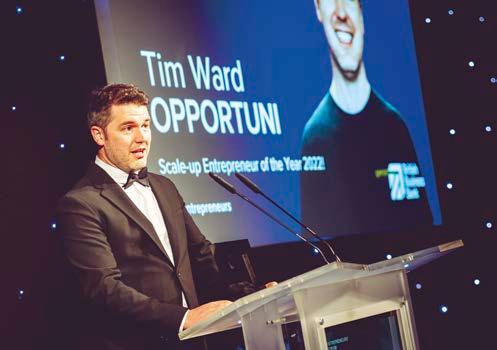
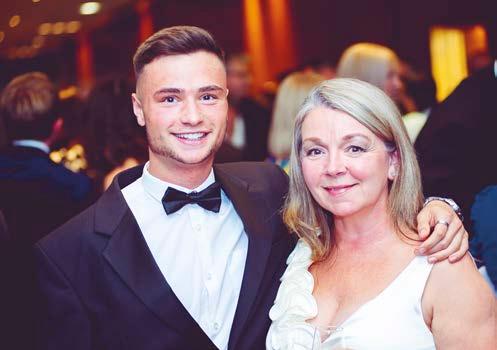
Winners included Chloë Clover, of Wander Films (Emerging
Talent Award); Craig Huntingdon (Mentor of the Year Award); Tim Ward, of OPPORTUNI, (Scale-up Entrepreneur of the Year Award); Mike O'Brien, of Opencast, (Entrepreneur of the Year Award); and Helen McArdle (Lifetime Achievement Award).
The evening was sponsored by British Business Bank, ION, Malhotra Group, RBC Brewin Dolphin and Ward Hadaway.
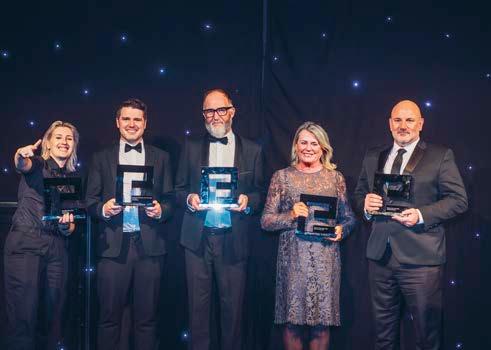
26 Event_ North East Entrepreneurial Awards
Entrepreneurial Awards

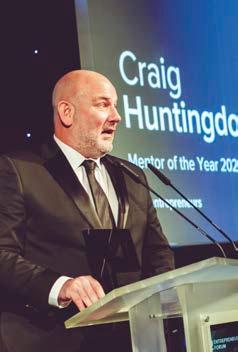
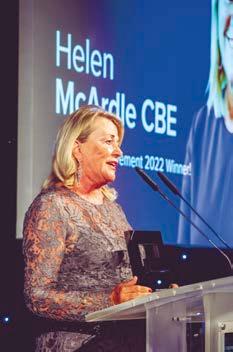




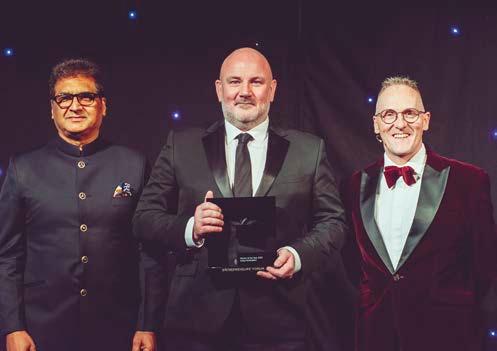
27 Event_ North East
feature_Shrewd HR
A refreshed approach to HR
With the business world continuing to undergo transformative post-pandemic change, organisations of all sizes are recalibrating HR approaches to ensure their compatibility. And one company helping them do so is outsourced services partner Shrewd. Here, Steven Hugill speaks to founder and managing director Martin Potts to learn more about the venture, its place within the evolving HR landscape, and why he is so committed to giving back to the region and its community.
LinkedIn: Shrewd HR www.shrewd-hr.co.uk
MARTIN POTTS HAS JUST RETURNED FROM AN early morning gym appointment, a grey sweatshirt evidencing his efforts to overcome a serious ankle injury.
His strength and conditioning routine, however, isn’t just reserved for personal gain.
It sits at the very heart of his commercial focus too.
As founder and managing director of Durham-based Shrewd, Martin operates akin to a coach, instilling greater health into company HR strategies so they carry the right form to thrive in a constantly changing employment landscape.
Launched at the height of the pandemic in July 2020, Shrewd guides organisations across the entire HR spectrum, from ensuring sound legal structures to encouraging cultural models that fit the postcoronavirus working environment.
Martin says: “The pandemic created so much uncertainty; businesses had to adapt and react quickly to the constant challenges thrown their way, and they needed support in areas they’d never needed previously.

“HR played a vital part throughout and those businesses without an internal HR function were lost in unfamiliar territory.
“I saw this as an opportunity to step in and offer my support.
“Nobody had really heard of furlough and all of a sudden it was being used in every conversationemployers were thinking, ‘what on earth do we need to do?’
“There was a lot of support needed throughout that period.”
The impact of Shrewd was immediate, with clients including Raby Estates, Gateshead-based occupational health operator Recovery4Life and Wynyard utilities firm Everflow reaching out for Martin’s guidance.
For more information about Shrewd HR, and how its services could help your business improve its HR delivery, contact Martin Potts at martin@ shrewd-hr.co.uk
The trio remain anchor clients, with many more from right across the North East having been attracted by Martin’s specialist experience and expertise, honed from more than a decade at the North East England Chamber of Commerce as a HR advisor and, latterly, its people and performance manager.
He says: “I’m really passionate about seeing our region thrive; I’ve always had a desire to make positive change.
“I’m from the North East, I’ve lived, worked and studied in the North East all of my life, and I’ve always worked hard to see others do well,” says CIPD-qualified Martin, who sponsors Hylton Colliery Welfare Football Club’s under nines’ shirts and is presently giving his time free to community project Shildon Alive, as part of a regionwide, one-day-a-month, free charity commitment.
He adds: “That desire was further embedded from my time at the Chamber, and the days of accelerating startups’ growth and helping larger firms excel.
“We’ve got so much talent in this region and really brilliant businesses, but many of them need support and are not sure where to look.
“The North East is a region full of SMEs, businesses that are not quite big enough to have their own internal resource but big enough to need something.
“That’s where Shrewd fits in.”
A key element of Shrewd’s support is a free HR assessment, wherein Martin evaluates firms’ existing practices, policies and systems before offering suitable guidance.
He says: “Businesses often tell me they don’t know what they don’t know, so we spend a couple of hours reviewing what’s currently in place and then advise on any gaps, risks and improvements needed, as well as a route to best practice.
“Most importantly, we listen first, before shaping a
28
Business_ Advertising
Shrewd HR
plan of action to support the business in overcoming their challenges.”
And with the working environment having changed seismically following the pandemic, Martin - who left his Chamber role to run Shrewd full-time at the beginning of September, but remains a consultant for the membership body - says the approach is perfect in ensuring organisations’ HR functions pivot too.
He says: “HR is an ever-changing landscape.
“When I first started working in HR, it was very much about personnel management and admin tasks.
“But HR today is so different.
“It’s about forward-thinking, spending time on managing employee engagement and strengthening culture with a focus on creating diverse and inclusive workforces.
“HR isn't just about policies, procedures and legal frameworks.
feature_Shrewd HR
“Of course, they’re essential in providing the foundations to deliver guidance, setting out boundaries and ensuring expectations are clear to protect businesses - you have to support staff with those processes - but the breadth of HR is vast, and it’s about adding value to organisations and its people.
“Topics like culture and flexible working have been around for some time, but they've been pushed right to the forefront by COVID-19.
“Companies must now think outside the box in terms of their recruitment and retention strategies, how they look after their staff, how they get the best out of them and how they support their career progression to retain them,” says Martin, who hopes to welcome up to two members of staff in the coming months to maintain Shrewd’s momentum.
He adds: “Businesses need to be thinking about what more they can do to attract and retain staff, because if they don’t, they’ll struggle in the current marketplace.
“Enhancing benefits such as parental leave, supporting internal progression as part of their succession planning, and focusing on staff wellbeing are a few examples of how an organisation can improve their recruitment strategies.”
And central to helping instigate such watershed change is Martin’s approach to HR, which sees him work closely with organisations to understand their respective DNA profiles before applying tailored support packages.
He says: “I like to get under the skin of a business, to find out how it operates and learn about its people.
“Doing so provides an understanding of its ways of working, the issues and obstacles they’re facing and what they’re looking to achieve, which in turn allows for the delivery of bespoke advice.
“Shrewd is an extension of a business’ internal team, we care about them as if we were part of the team.
“We pride ourselves on building trust and rapport with businesses, working with owners and management teams to discuss issues openly, and forming unique, longstanding relationships that build the foundations for better HR processes.
“It’s so much more than simply doing a piece of work."
Martin adds: “I’m bringing something new to the market with Shrewd, an outsourced HR consultancy working collaboratively with businesses to provide tailored solutions to their unique situations.
“I love reading stories of North East successes and efforts to give our region a thriving economy, and I’m here to put back into that community, by helping its businesses and people prosper.”

29
Business_ Advertising
Driving a new energy revolution
Having once assessed the potential of North Sea oil wells as a young geologist, Jamie Brown is now helping propel an altogether different energy drive. As partner and commercial property team leader at The Endeavour Partnership, he is linking farmers with power providers to help create huge solar panel developments. Here, Jamie tells Steven Hugill more about that work, how it fits into the firm’s wider commercial property provision, and why services will always be delivered with a uniquely personal touch.
https://endeavour.law @Endeavour_law
“QUITE OFTEN, I’LL BE HAVING A CONVERSATION with a farmer while they’re delivering a calf, lambing or fixing machinery.
“They’re so busy, they don’t have time to sit down for a chat, so I go to them.”
Jamie Brown isn’t your average law firm partner and commercial property team leader.
A former North Sea geologist - whose CV also includes time in the Gulf of Mexico - you’re just as likely to see him over a farmer’s shoulder, braving the wintry chill of a barn in wellingtons and overalls, as you are in a crisp suit behind a desk in a warm office.
But then, The Endeavour Partnership - where Jamie has been a fixture for nearly two decades - isn’t your average legal sector operator, either.
Based in offices overlooking Stockton’s waterfront as Tees Valley’s largest commercial law firm, it elevates services far beyond static advice through a dedicated personal approach that meets clients’ needs while providing them with autonomy to make decisions based on their unique circumstances.
And nowhere is this commitment better emphasised than through the work of its expert commercial property team.
Led by Jamie, it provides advice across the entire commercial property development spectrum, from large-scale acquisitions and sales and purchases for expanding portfolios, to mergers, leases, asset transfers and drafting guarantees.
Its reputation is reflected by a client list that winds from its North East heartland, from local operators, such as family-founded transport firm AV Dawson and the Middlesbrough Development Corporation, to national and international organisations.
The firm is also a leading figure on a legal panel established to support the Tees Valley’s development plans, which include Teesside International Airport’s £200 million Southside Business Park.
Its influence, though, goes further still, into the agricultural sector, where Jamie and his team provide crucial support to everything from small, family-run farms to large, landed estates.

And its impact is becoming ever more palpable as the UK undergoes a green revolution.
With the country increasingly shifting from a reliance on dwindling reserves or imported fossil fuels to renewable means, farmers and power companies are uniting, creating solar panel developments to pump energy into the national grid.
And right in the middle of it all is The Endeavour Partnership, its highly practised team ensuring landowners secure lease deals that invariably include a percentage of the value of the power produced, while allowing for the continuation of animal grazing.
The firm has already acted for clients on a number of projects, notably a 250-acre scheme just outside Stockton, which developers say has the potential to
30
Law_ Advertising feature_The Endeavour Partnership
Jamie Brown, The Endeavour Partnership partner and commercial property team leader, with dog Betty
become one of the North East’s largest onshore solar farm developments.
Jamie says: “When people think of The Endeavour Partnership, they will perhaps look at the headline commercial property deals we support, and may not instantly think of Tees Valley’s largest commercial law firm working on things like agricultural solar farms.
“But we have great experience of working with the farming community, having supported its journey for a long time.”
And in Jamie, that community has someone who is deeply invested in its future, who is receptive to the challenges it faces and the priorities it must attend and who, ultimately, embodies The Endeavour Partnership’s personal approach.
“I really enjoy the farming side of law,” says Jamie, who often helps deliver his neighbour’s lambs.
He says: “Getting out to see farmers and understanding their daily routines, their business plans and their aspirations, right down to the nitty gritty, is hugely important.
“It allows me to tailor support and ensure they’re getting the best possible advice.
“And that is crucial, because farming is a tough sector.
“Farmers feel business pressures like everyone else, and with them comes the need to diversify.

“Some have converted barns into holiday cottages, but others are using their land for solar panels, tapping into what is a valuable income stream.
“And it’s a symbiotic relationship; the energy provider gains access to land for its panels while the farmer gets an income and, if they have them, continues grazing sheep in their fields.
“Founding these solar developments is a very long
The Endeavour Partnership
-
As the largest commercial law firm in the Tees Valley, The Endeavour Partnership is experienced in all aspects of business law. Recognised for its specialist departments and multiple layers of expertise, the firm offers a genuine focus on commercial legal solutions to provide support that goes beyond static advice, and is committed to producing inno vative options for clients while still demonstrating business-focused thinking.
For more infor mation on how its commercial property team could help you, visit https:// endeavour.law/ or contact 01642 610300.
process, and we get involved right at the beginning, working closely with clients to ensure their interests are safeguarded.”
Jamie adds: “And our reputation continues to grow on the back of it.
“A number of land agents, who negotiate on behalf of farmers, regularly come to us, and we often get referrals from smaller firms of solicitors, which have acted for farmers for years.
“They recognise our expertise in this area, having been through the process so many times.”
For Jamie, the energy change he is now supporting can be traced back through the decades to his time as a geologist in the North Sea, where he explored and exploited new and existing oil reserves.
Having witnessed that industry close-up, he is using his experience and knowledge of its finite resource pool to drive forward the switch to cleaner power.
He says: “Working in the North Sea showed me just how unproductive and expensive it was becoming.
“After five years I could see things were looking precarious - that was more than 20 years ago, and it’s all now coming down the line in terms of renewables,” says Jamie, who began studying law while still working in the North Sea, before fulfilling a training contract with a London firm.
He adds: “It is reflected in the fact the big operators, who were in the North Sea, are setting up their own renewable energy subsidiaries.
“They know where the future is.
“Solar power is natural, it's environmentally-friendly and it's far more cost efficient that trying to open up old oil wells.”
And as the energy mix continues to change, Jamie says The Endeavour Partnership will remain where it has always been - right by the side of clients, providing a personal approach that understands their intricacies to ensure future success.
He adds: “We’re committed to supporting the continued energy transition, and how that feeds into the agricultural sector, just as we are supporting the entire commercial property environment.
“The services we provide, and the sectors we support, show we’re anything but another commercial law firm.
“We are Tees Valley’s largest commercial law firm, and we’re immensely proud of that.
“Our roots are here, our people are from the area, and we’ll continue offering our support to ensure it thrives.”
31
Pictures: Jamie Haslam/ROAM
Law_ Advertising
feature_The Endeavour
Partnership
Just how detrimental has the recent political flip flopping been for the UK’s economy, its businesses and personal finances? And do you believe the Government can salvage its reputation and the confidence of the financial community?
QUESTION
Martin McTague North East-based national chair Federation of Small Businesses

The recent political turmoil and flip-flopping needs to be brought to an end to help turn the tide of plunging small business confidence and to focus on addressing the acute cost of doing business crisis.
Stability includes the Government delivering swiftly on its promises to help small firms with energy bills, and to reverse the hike in National Insurance.
Beyond that, there must be clarity as soon as possible on what happens to the energy support package beyond its initial six months.
It’s not so much about political parties and which people are in which jobs, more the actual policies.
While the new Chancellor has initially focused on reassuring the markets, with recessionary pressures causing real problems for small firms, this will need to be combined with pro-growth measures.

THE
I’d like to see more small firms taken out of the archaic business rates system, which sees entrepreneurs slapped with bills before they’ve made a penny.
Action to tackle the anti-growth late payment culture – in which small firms suffer late payment of invoices, often by bigger business customers – would also be positive, and wouldn’t incur additional cost to taxpayers.
With the right support through this cost crisis, small businesses can drive growth and economic recovery.
Elaine Stroud Chief executive Entrepreneurs’ Forum

The actions from the Government following the mini-budget and the subsequent backlash have added to existing, significant levels of uncertainty for our region’s entrepreneurs.
Our most recent survey, which was completed just prior to the mini-budget, found 78 per cent of members were either not very confident or unsure in the economy for the year ahead.
In these challenging times, we need consistent leadership, something which has been sadly lacking in recent weeks.
Despite this, it’s not all doom and gloom.
The majority of our members remain optimistic about their own business prospects for the coming 12 months, provided they can overcome their most pressing concern: how to attract and retain the staff they need to achieve their growth ambitions.

We welcome measures from the Government which support job creation including tax cuts, reduction in red tape and incentives to encourage people to come and live and work for North East businesses.
Above all, we urgently need transparency on the economic plan without which we risk ongoing and worsening volatility, prolonging the agony for our members who just want to get on with business.
super-charged inflation, the Government still looks set to borrow around £720 billion over the next five years.
This deficit will limit the investment our economy needs – in tackling poverty, fixing public services, levelling-up and meeting net-zero targets with good green jobs.
It will be challenging to rebuild confidence in this context.
The Government’s approach remains rooted in the longdisproven idea that economic growth automatically benefits everyone.
Growth needs to be equitable, working in the interests of our communities across the North.
Reheating failed policies of deregulation and unfunded tax cuts simply increases inequality and weakens public services.
What the North needs now is urgent injections for public services and cost of living support.
Longer-term, to unlock fair and sustained economic growth, the Government must deliver on its promise to level up: investing in digital and physical infrastructure across the North, good jobs and skills, good quality housing and devolution.
When governments actively set clear missions like this, businesses have a better idea of future growth opportunities, and confidence can be rebuilt.
Paul Blight Head of wealth management Tier One Capital


Realising the fiscal gap that has been created must close either through cuts, probably to working age benefits or by backing down on tax cuts, it is unlikely the independent Office of Budget Responsibility will put much weight by the Government’s claim that its plan will spur growth and solve the problem that way.
This is not because it is bound to fail, but just because there is too much uncertainty around it.
Unfortunately, the biggest losers from this process are borrowers.
They have seen interest rates rise significantly and the obvious real-world effect of this is there for all to see.
Long before the U-turn, it was already clear that 15 years of corporation tax cuts had failed to boost private sector investment and encourage growth.
UK private sector investment is far below average - among the lowest in the OECD.
The mini-budget simply created uncertainty for business; while the former Prime Minister’s U-turn on corporation tax was welcome, the overall political instability has created a turbulent economic environment which weakens confidence.
Even with the further U-turn on the billions in borrowing, which
However, we should remember that Britain’s institutions were able to restore order quickly and we can hope that once it is clear that the market is demanding a more prudent path, confidence can be rebuilt.
This should allow inflation to fall and interest rates may never get to the six per cent level that is currently feared.
The primary issue for the market is to balance the books, although it is the electorate that is likely to reject plans to do this through swingeing cuts to benefits.
Without these spending cuts or an abandonment of tax cuts, the sums simply don’t add up.
So, for the markets, the Government must change course.
At this point, the problem is political rather than market driven.
Luke Myer Research fellow - North East IPPR North
Have I Got An Interview ForYou… Eventually
Ian Hislop and Nick Newman
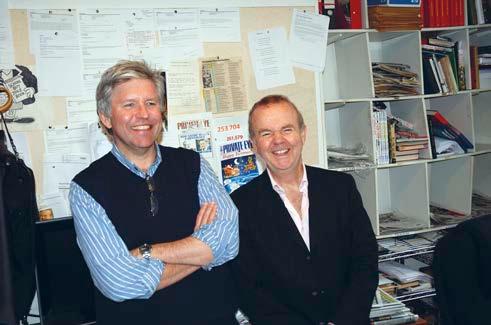
An interview with Ian Hislop and his comedy co-writer Nick Newman, you say? Absolutely.
Of course, it is postponed and rearranged due to a train strike, which denies rail buff Ian a rare visit to the home of Stephenson’s Locomotion No 1. And, of course, left to their own devices, a Zoom call between three men with a combined age of 175 years goes completely awry; Ian is late before his ‘dodgy laptop’ gives up mid-sentence and mid-interview.
But when they did get to Darlington Hippodrome, to see the opening night of their new play Spike - based on the life, and strife, of comedian Spike Milligan - Colin Young was granted another opportunity to meet two of the country’s finest satirists.
“My dad always believed the world is run by idiots.”
The gag was written, and performed, by Spike Milligan more than 70 years ago.
At the start of its UK tour, Robert Wilfort, playing lead character Spike, in the story of The Goon Show creator and writer, didn’t even say the line. But creators Ian Hislop and Nick Newman unearthed it from a long-forgotten Milligan recording, and so added it to the script. On opening night at Darlington Hippodrome six weeks later, it’s a slow burner, but it gets the biggest laugh, and cheer, of the performance.
And in the audience, looking very pleased with their efforts are the two writers - the Have I Got News For You team captain and Private Eye editor Ian and his comedy-writing sidekick, Sunday Times cartoonist Nick.
This is their routine for every opening night on the 12-theatre tour, which finishes in Cardiff at the end of November.
The pair, who have worked together for more than 30 years, take in a Q&A and a glass of wine on stage and engage the audience even further with their obsession with Milligan, whose genius, they believe, is the source of British humour to this day.
“Well, we're very vain,” says Ian before the show.
“We said we thought we really should support the show, but actually it’s just an excuse to go and watch your own material.
“Television is so much colder as a medium, and the theatre is just
completely different every time you do it.
“You get an audience of a couple of 100 in an old theatre like this, and to hear the roar from a joke is just fantastic.”
“Most of the time as a writer is being on your own, sitting in a little box, just staring into space,” adds Nick.
“The thought of going out and actually meeting actors and rubbing shoulders with them, and seeing them perform and a bit of grease paint is very, very exciting.”
“Of course you do it all the time,” he adds, turning to his right, to a man whose mischievous grin is so familiar to Friday night
34
audiences of Have I Got News For You.
“Quite often, people don't really want to ask questions, they want to tell you something,” Ian says.
“And sometimes we find that very useful and put it in the show.
“Half the audience know more about the Goons than we do, and they will tell us they met him, or had we heard this story about him…”
“We always get asked about ‘cancel culture’,” adds Nick.
“We are trying to find things that resonate with a modern audience, and how people respond to situations.
“And in warfare, people make jokes.
"In extreme situations, like bereavement, people make jokes, which I think is fascinating.
“If you read Anthony Beaver’s D-Day, there's not a grain of humour in it.
“But the reality is, men on the frontlineas Spike recounts in his war memoirs - used black humour all the time.
“When he was crawling up a gulley in Monte Cassino, where he was wounded, he recounts somebody had written in chalk on a stone ‘World War Two this way’, and an arrow pointing.”
The makeshift sign appears in the background scenery in Spike.
“There's always a question about would Spike have been surprised or despaired at the politics today, and I think if you’ve been through the Second World War, you don't despair do you?” Ian says.
“He might have been a bit dismayed at the state of the country, but at least it’s not a war.
“People always bring it up but that's great, because we're trying to connect the past and the present.
“That's why we’ve done the play now rather than saying, ‘would you like to go to a museum?’
“We’re trying to get people into our world.”
As well as the theatre and the opportunity to visit towns like Darlington, their combined worlds, of course, consist of Have I Got News For You, Private Eye and The Sunday Times. The BBC show continues to deliver the punches,
although keeping up with the changes in Government has not been without its challenges recently.
The programme is filmed on a Thursday (we meet on the Tuesday of Liz Truss’ resignation).
“Literally, anything could happen before Thursday, and literally anything can happen while we are on air at the moment,” Ian says.
“They’re doing our job as satirists for us, which is fine because we have been busy for years.
“If you’re filming with a live audience, or in a Q&A, you only have to say ‘Liz Truss’ and you get a laugh.
“You don’t need to say anything else. That’s the gag.”
Come Friday night and the cheeky chap on the left of guest presenter Clive Myrie delivers the name and it works…
Like Spike Milligan, Ian has not been without his battles with the Beeb and the Establishment over the years.
And as they discovered when they were handed a treasure trove of correspondence, Milligan’s battle fatigue persisted after the war when he continued to challenge authority.
No wonder it sounds so familiar…
“They wouldn’t show Have I Got News For You for a fortnight while the Queen’s funeral was on, so it was less of a fight than a loss really. Fairly straightforward.
“The play comes to the conclusion that the BBC know they should be putting this sort of stuff on and it’s what people want, and it gives a release.
“It's part of what being British is about, really; we do jokes about our government.
“In some other countries, you get locked up for that. Here, you don't.
“But there's always a desire by management to make things safe, so that you don't get criticised, or so the Daily Mail doesn't lead the next morning on something you’ve said.
“We were doing a Q&A, and in the middle of that week was a front page headline saying, ‘Comic criticises Prime Minister’, and I thought, that's a headline? In 2022?
“It was Joe Lycett, and I just thought,
well, that's funny, Spike was doing this 70 years ago, and everyone thought it was fine.”
He turns again to Nick.
“I think the Sunday Times lets you do more…”
“Working for national newspapers, you don’t know whether there's anything subliminal because they're choosing the cartoons. And it's their decision.
“But in the week of the Queen's funeral, I said to the editor, ‘do you want anything at all?’
“And she said, ‘oh, absolutely, there's far too much misery and solemnity about the whole thing’.
“So I was able to do some jokes, I feel, in good and reasonable taste.”
His cartoons appear regularly in Private Eye, which Ian has now edited for more than 30 years - following Richard Ingram and Peter Cook, who were both influenced - and regularly called - by Milligan.
Sales of the satirical magazine are now higher than pre-pandemic levels, and that can only be good news for lovers of the printed word.
Ian says: “I wouldn't say it's because we're brilliant, but I think it's because everyone else isn’t.
“And that helps hugely, right?
“The local press is much reduced now.
“I could run the whole magazine as the ‘Rotten Boroughs’, just asking where has the money gone?
“The story about the postmasters and mistresses being banged up, accused of being thieves, people losing their lives, and all over a computer error.
“If you run that story once, nothing happens; we ran it about 300 times and, eventually, the ball rolled.
“It's very difficult to do that in digital media, because people get bored.”
Nick adds: “The other thing about digital is that you have experts monitoring what people are looking at, and for how long.
“I can remember at the Sunday Times, someone saying, ‘Oh, your cartoon is only getting a 20-second viewing window, and you think well, that's because it's a pocket cartoon and takes 20 seconds to look at.
“You don't want to do it all by numbers.”
35'He’s a comedy genius, not a cantankerous figure’ – Ian Hislop and Nick Newman on Spike. See www.netimesmagazine.co.uk for more
Economy
Stopping the walls from closing in...
If a week is a long time in politics, then what of the last two months, following the disastrous impact of the Government’s mini-budget? Here, Steven Hugill picks through recent events, assessing the chaos and confusion, and why latest Prime Minister Rishi Sunak needs to hit the ground running.
Talking Point
4To bastardise that well-known Churchillian refrain, never was so much damage caused by so few, in so little time.
We know the Tories like a bit of wartime chat and patriotic embellishment - remember the ‘Blitz Spirit’ fetishized by some MPs during the pandemic, and the game of spot the Union flag during their interviews?
But even they took the idea too far with the minibudget.
Talking about battles metaphorically is one thing, but knifing your original second-in-command after he’s set a howitzer on the financial markets under your orders, all while digging a bloody great trench down the middle of your party, is quite the other.
Given the ridiculousness of Boris Johnson’s tenure, the country was crying out for stability.
Yet, in an astonishing few weeks in charge, Liz Truss not only maintained the chaos, but increased it, with a mini-budget that shot warning flares across the skies.
Her Chancellor’s mini-budget was supposed to be a watershed moment, a wiping of the slate to provide the UK with a foothold to begin the long climb from base camp towards growth.
Instead, it caused an avalanche, which buried the pound, largely froze the mortgage market and forced the Bank of England into Sherpa mode to stabilise prices and stop pension funds from disappearing over a glacier edge.
And then we had the U-turns.
After Kwasi Kwarteng was sent packing, the growing shitstorm was handed to former Health Secretary Jeremy Hunt - somewhat ironic, given
36
Words by Steven Hugill
his involvement in a £44,000, taxpayerfunded office toilet and bathroom row a few years ago.
Flushing away many of his short-lived predecessor’s plans, he laid the ground for public spending slashes and a cut to the household energy bill cap, ready for Rishi Sunak to take command.

Figures from the Institute of Fiscal Studies’ latest Green Budget, which warn it will take £62 billion of spending cuts or tax increases to stabilise or lower national debt, paints a picture of the financial landscape he’s taken over.
And its numbers like the one above that make the Government’s initial mini-budget all the more incredible.
Still facing the consequences of Brexit and coronavirus, and faced with countless warnings about rising inflation and the ever-growing impact of the cost of living crisis on a huge swathe of society, the original blueprint was extraordinary for its lack of sentiment alone.
And the fall-out has plenty worried.
They include John McCabe, chief executive of the North East England Chamber of Commerce, who says the time has come for the “chaos at the top to stop.”
He added: “We all want to see growth, but we need to achieve stability first and the Government’s actions in the last few weeks have not helped.
"Businesses and households are facing uncertainty on energy price support, and we’re very concerned about cuts to essential public services.
“It is crucial Mr Sunak and his ministerial team listen to business concerns in the North East, and that his appointment marks the start of real action to deal with the significant economic pressures facing businesses and households in the region.


“Investment in the North East remains vitally important and there must be a renewed emphasis on greater devolution for the region and 'levelling-up'."
Councillor James Jamieson, chair
of the Local Government Association, added: “Councils are working hard to support residents.









"However, without certainty of adequate funding, councils will have no choice but to implement significant reductions to services.

"The Government, therefore, needs to ensure councils have the funding to meet ongoing pressures and protect the services that will be vital to achieve its ambitions for growth, a more balanced economy, level up communities and help residents through this cost of living crisis."
With markets flinching at the slightest move and confidence shattered, rise it must.

With Sunak, the Tories have pushed the wooden blocks around the war room plotting map again.



And for the country's future, it needs them to line up.
Because if they don't, the walls - after the utter chaos of recent weeks - will come tumbling down.
37
INVESTING FOR THE FUTURE ATOM BANK ED TWIDDY


Launched as the UK’s first app-based bank, Atom arrived on the financial scene with a promise to transform the face of saving and lending. Six years later, and with a balance sheet of more than £5 billion, the Durham operator has done just that. Having come through Brexit, the pandemic and tumultuous Government upheaval, Atom is now rolling out a blueprint for the next phase of its journey, which includes quadrupling the value of its customer support. Here, Steven Hugill speaks to chief customer officer Ed Twiddy, to find out more about the bank’s response to the recent mini-budget, how it has navigated choppy economic waters and how it is ramping up its focus on skills and sustainability.
4Ed Twiddy bends to sit in a purplecushioned pod, resting his hands on a glass-covered work desk.
Above his head, and that of the structure’s circular roof, a high-rising rammed earth wall stretches up and outwards, a uniform of grey in an otherwise kaleidoscopic office.
Its pallidity, however, belies great significance.
For while it may not carry the vibrant palette of Atom’s colourway, its impact on the bank’s ultra-modern Durham-based Rivergreen Centre headquarters is no less striking.
Standing more than six metres high, its mix of sand, gravel and clay creates valuable thermal mass that moderates heat and humidity across offices, meeting spaces and corridors.
In a way, it’s the perfect reflection of Atom, which is regularly dipping a metaphorical thermometer into the country’s finances, absorbing data and sentiment before translating it into support
that ensures savers, business owners and those on the property ladder are not left in the cold.
No amount of focus, though, could have foreseen the recent astronomical rise in the mercury delivered by the Government’s mini-budget, which parched the economy and left many a consumer’s plans equally scorched.
With lenders forced to pull hundreds of mortgage deals amid a radically changing climate, Atom too was moved to postpone decisions.
Now sitting on a grey sofa detailed with blue buttons in a high-ceilinged meeting and recreation space, Ed acknowledges the pain its decisions have had on customers - but says it was impossible to work in such a hot market.
He says: “Like everybody, we didn’t know how to fairly price mortgages after the mini-budget.
“It was an extraordinary moment, which put so much of a question mark against the price of money.
“And it was hurtful to people too.
“For mortgage customers already in a pipeline, thankfully - as far as I’m aware - no lender got themselves in a position where they couldn’t honour that pipeline.
“But then you had people who had submitted applications, or were looking for a decision, and the only way to treat them at all fairly was to ask them to pause for a minute.
“And that felt terrible, because people’s hopes and dreams are often so closely attached to their home or moving house - and there are plenty of reasons not to add anxiety to what is already a stressful process.”
He adds: “But when you’re locking in a mortgage, if you make that calculation at the wrong moment, then that is with you for a long time.
“A mortgage is a multi-year product - you’re not just pricing it for what tomorrow’s cost of living is.
“As a lender, you’re looking through a curve that reflects what the market is
40
Words by Steven Hugill Photography by Christopher Owens
saying the cost of debt is going to be, and when that takes a shock move up, you have to think, ‘do I follow that, or do I hang on?’
“The intervention by the Bank of England has given a sense of stability, and some things have come back a little.
“As we move forward, the price of the mortgage market will be set by the big guys, and for us, it’s about being cautious.
“We’ve paused, and we’ll go back in when we understand more.”
The emotional ethos to which Ed alludes has been a fundamental element of the business since its inception in 2014, and its official market launch two years later.
As a sector, banking carries on its broad shoulders many labels, from those caused by perpetual headlines around bosses’ bonuses to consumers’ frustrations at not seeing the full benefits of interest rate rises.
Atom, though, says Ed - who left a role as the first director of the North East Local Enterprise Partnership to become one of the digital lender’s six original founding members - is different.
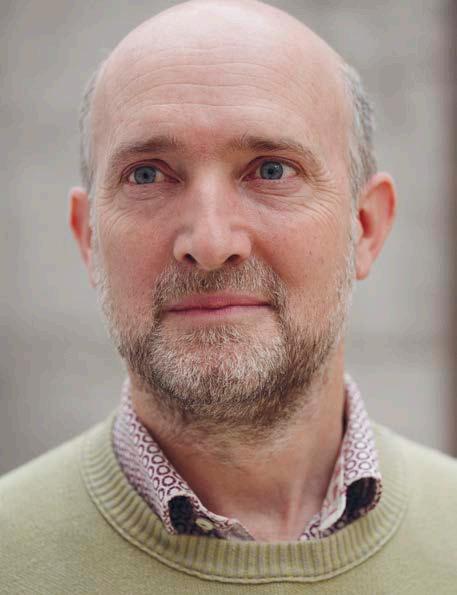
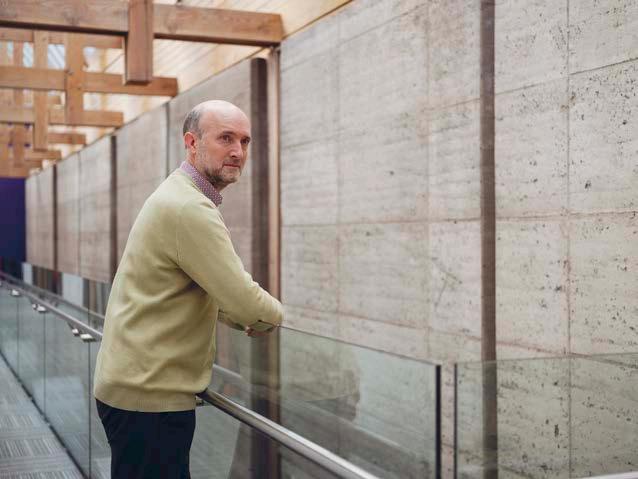
He says: “We’ve always prided ourselves on being there for savers, when others haven’t - and others still aren’t.
“Our one-year saver is at 4.1 per cent and selling like hot cakes, with our instant saver, at 1.9 per cent, providing a more than fair return.
“But many banks, while passing on some of each interest rate base rise, are keeping a lot more - which means a hell of a lot of cash not going to savers.
“Banks, of course, have to be risk averse.
“But, at the moment, they seem to be playing the old game of taking away the umbrella when the rain starts.
“We don’t believe that is right or necessary.”
And that mindset, reveals Ed, is having a profound effect.
Atom’s balance sheet recently tipped over the £5 billion mark, a hugely significant figure for a lender that has had to come through several socio-economic challenges without yet getting to the
point of lighting the candles for its tenth anniversary.
The figure is also conviction of the blueprint rolled out by Ed and the senior team, which, from the very outset, positioned Atom as the UK’s first app-based bank dedicated to delivering services through a tech portal, rather than high street branches.
He says: “With everything you do in life, it’s sometimes hard to see things when you’re ingrained in them.
“We live day-to-day in the markets, but a figure like £5 billion is
41
an important milestone and a moment to recognise.
“We’ve gone from convincing people we exist, and that the app in your phone is a safe and rewarding place to put your money, to launching business lending and mortgages.
“We’ve been voted Which? Money best digital lender for a fifth year in a row, and we’ve supported the Coronavirus Business Interruption Loan Scheme and Recovery Loan Scheme, which have been successful for us, and the businesses involved too.
“I’m not claiming we’re a saintly intervention, but, by lending wisely, sensitively and fairly, we’re bringing something useful to society.”
Ed adds: “We’ve been through a time of the big banks being ringfenced, separating retail customers from investment activities, which completely changed the mortgage market.
“We’ve had the post-Brexit period, and the massive increase of liquidity into banks through the Term Funding Scheme, and seen interest rates go to the floor.
“We’ve had COVID-19, which transformed lives and sent the housing market into lockdown and, either side of that, had a succession of political changes.
“We almost got to the point of thinking, ‘gosh, we’ve seen it all’ and then someone invades a country, you have a further massive change in the UK political landscape, and another dice is rolled…”
Ed’s voice trails away, but it quickly rises back up when he discusses Atom’s response.
It would have been easy to falter during those times, to feel, almost, a sense of selfpity, but, says Ed, its reaction was to the contrary, with the bank’s agile operation and clear aims and objectives providing a stable base.
And it’s one, he says, that is primed to help the lender - which previously attracted pop star Will.i.am as a board advisor - to take its £5 billion balance sheet to more than four times that amount.
Key to achieving this, he says, will be the enduring roll out of Atom’s “quite simple”
business model, which is increasing revenue while keeping costs low.
He says: “You take savings in on one side and have an automated and expert risk machine in the middle that translates them into lending in the real economy.
“And if you arbitrage in the very best way possible between your savers and your borrowers, you stay thin in the middle.
“In the last financial year, we grew income by 200 per cent while costs rose by five per cent.
“And we think we can continue to do that, to become not just a £5 billion business, but a £15 billion, £20 billion or even £25 billion business.
“Once the jaws begin opening between costs and revenue, and you’re doing things fairly and transparently, why not?”
A growing business requires skills, and to that end, Ed says Atom has made noteworthy strides.
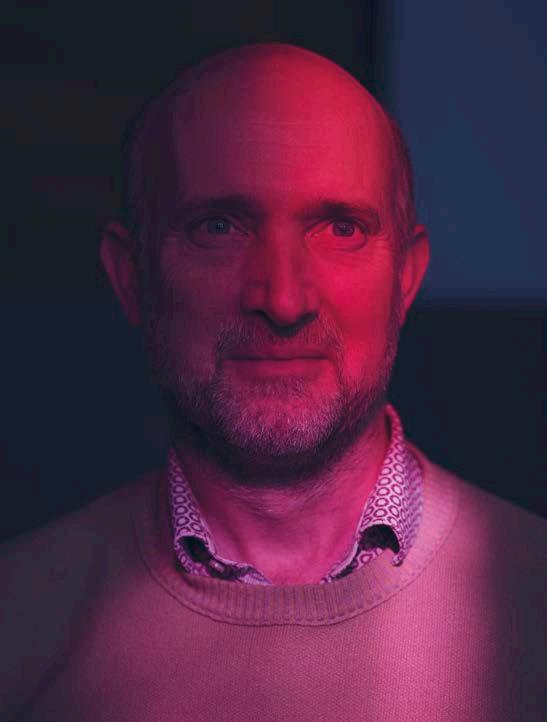
From its founding six, the bank’s
headcount now stands at 480.
Around 430 of those are based in the North East, with a team of 30 developers in Poland and a number of home-based staff on “roving contracts”, who are supporting Atom’s expansion from the Highlands right down to Devon and Cornwall.
And while the pandemic’s breaking down of traditional employment barriers has added some strain to the operator’s access to talent, Ed says the bank nevertheless remains an extremely attractive proposition, with its previously introduced four-day working week proving particularly alluring.
He says: “The most difficult thing for us during the pandemic was the massive surge in demand for digital skills.
“We suddenly found our people were being tapped up by every other bank and retailer, who had realised the massive shift to online.
“We lost people and in response embarked on an employment exercise,
42
with our four-day week a real recruiting sergeant.”
And while Atom was affected, Ed remains pragmatic about the wider economic benefits of employee dispersal.
He says: “For the North East’s sake, in many respects, the change brought by the pandemic has given a new lease of life to a tech sector that was already growing very quickly.
“Businesses have a home and a heart, but they don’t mind now if someone is in Cornwall or even the Faroe Islands.
“And it means there are a whole bunch of people in the North East earning extremely good money, working for businesses all over the world.”
As well as embracing the evolving talent landscape, Ed too has an eye on Atom’s responsibilities around sustainability and inclusivity.
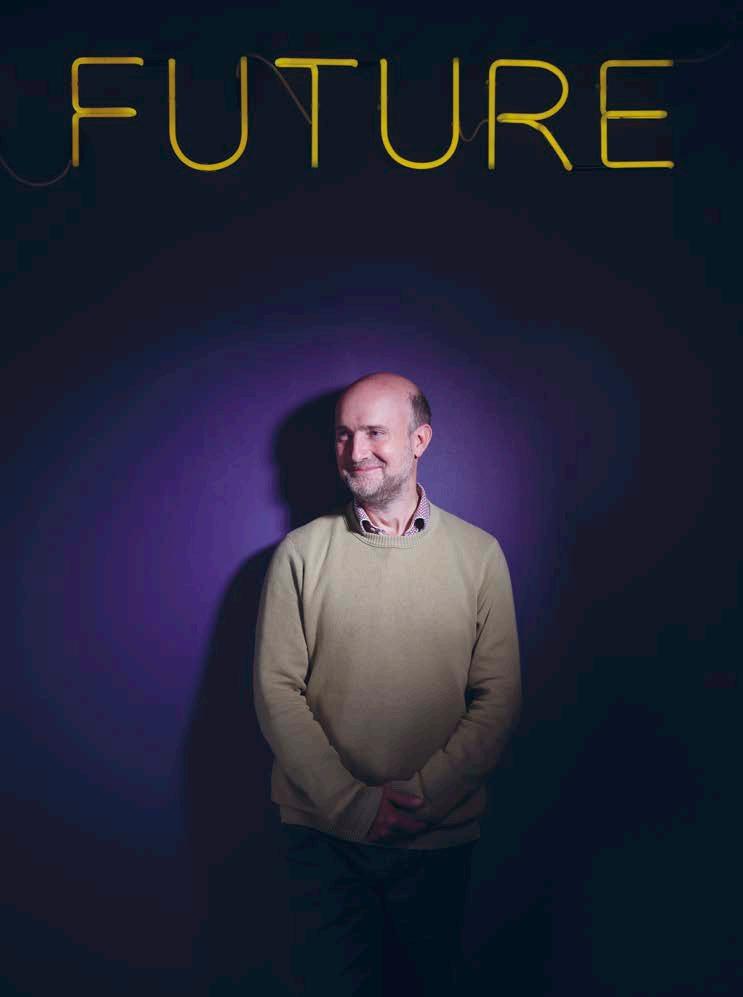
He pinpoints targets he wants to meet over the coming years, which include making the lender carbon positive by the middle of the next decade and building on existing skills partnerships to help more people from diverse backgrounds.
He says: “We’re already a very low carbon business, but we want to be carbon positive by the mid-2030s.
“And from an industry perspective, rightly and understandably, regulators and the Government look to banks and say, ‘we expect you to account for the reasons why the industries and households you are supporting are going to be sustainable’.
“So working with our partners - such as the Durham Energy Institute - to help people live affordably, in a house fit to deal with climate change, is absolutely in our interest.
“But we also need to be truly reflective of society.
“We’re very proud of the work we’ve done with the Prince’s Trust, which has seen us act as a principal sponsor for young people not in employment, education or training, to provide them with skills for their futures.
“And we’re proud of our partnership with the Institute of Coding on the TechUP
programme at Durham University, to help people, especially women, retrain for careers in technology.
“But we need to do more.
“Ultimately, employment is still the best way out of poverty - it’s the best way to stimulate your mind and meet new people, and to go and do something different.
“And we want to make sure such opportunities are available for all.”
He adds: “For us, it’s about sticking to the knitting, about facing the global problems down, facing the regional employment and
opportunity challenges and making a real mark, while keeping things simple.
“Our watchwords are faster, easier and better value for money.
“We want to continue giving people back their time, continue making complicated matters simple and continue helping customers get more for their savings or get a mortgage more cheaply.
“We want to be double, triple, quadruple in size as quickly as we possibly can.
“And we’ll do it safely and sustainably, always with a mind to our customers.”
www.atombank.co.uk @atom_bank


Steering through a turbulent time
This month, Paul Jennings, chief executive at Newcastle-based marine insurer North P&I, steps down as chairman of the International Group of P&I Clubs, after four years in the role. Here, he looks back at a time of unprecedented challenge and great progress at the organisation.
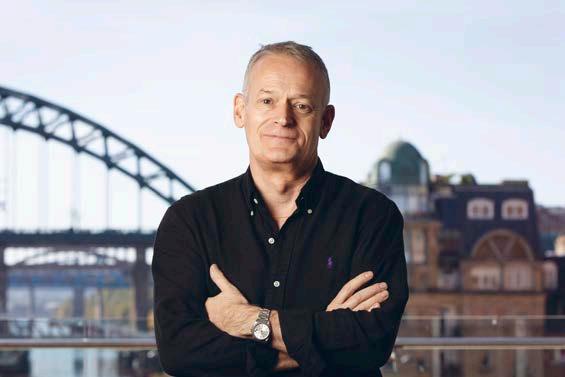
www.nepia.com @NorthPandIClub
THE HEADLINE FIGURES ALONE ARE pretty daunting.
The International Group of P&I Clubs is an association of 13 of the world’s largest marine insurers, which between them provide protection and indemnity (P&I) cover for nine out of every ten ocean-going vessel across the globe.
and complex claims.
So how did it feel for Paul Jennings, chief executive of the only North East-based P&I club in the International Group, to start as chair of the organisation in November 2018?
“It was quite a challenge because you have 13 different views around the table from organisations which are normally in competition with each other,” he admits.
With three Scandinavian clubs, one in Japan, one in New York and seven in London, along with North in Newcastle, the different commercial challenges facing each club magnifies the complexity of achieving consensus on important issues such as decarbonisation, sustainability and safety at sea.
Paul says: “When I became chairman of the International Group, I did think my biggest challenge would be building consensus for an appropriate agenda on the common issues all P&I clubs face, as well as ensuring that the group remained relevant.
“Over 100 years of history is great, but you have to be prepared to change and adapt if you are going to stay relevant – and change is not easy to achieve, particularly when you have 13 different organisations with their own view on the world.
With 95 per cent of all international trade being transported by sea, that represents a hugely important part of the global economy, because without P&I cover – insurance for vessels – everything from small trading vessels to giant container ships cannot operate.
And then there’s the history.
The International Group has been in operation since 1899, when it was formed to help P&I clubs share liabilities, particularly for larger claims.
It’s a role the International Group continues to play today, with members sharing risks and liabilities for large
“However, by that time I had been involved with the International Group at a senior level for about 20 years, serving on several of the 40 committees which the group operates, including chairing the Reinsurance Committee since 2015, so had a good understanding of how the International Group worked.”
Looking back over his tenure, it was the unprecedented challenge from an unexpected quarter which fundamentally shaped Paul’s time as chair.
He says: “I remember being in a conference in Singapore in December 2019, and there were vague rumours about a spreading infection, but no-one thought
46
Insurance_ Advertising feature_North P&I
feature_North P&I
something was coming that effectively meant we would not be travelling for the next two years.
“COVID-19 presented countless challenges for members of the International Group and, of course, shipowners and operators around the world, who were faced with a constantly shifting series of restrictions as they attempted to keep food, medicines and manufactured goods moving in a locked-down world.”
The global pandemic did, however, help to bring out the co-operative spirit among International Group members, who quickly took to technology to try and ease the situation for shipowners through greater insight and understanding of how the virus was spreading.
Paul says: “We moved to a virtual working environment very quickly in response to the lockdowns.
“As restrictions meant no one could travel internationally, people were able to virtually attend more International Group meetings than they would normally have been able to, and we were able to quickly build a consensus around how we could collectively help shipowners get through the pandemic.
“The pandemic helped to underline that as individual P&I clubs, we have more in common than in competition.
“A good example of this comes from here at North, where we developed a fantastic digital technologybased monitoring system, which gave shipowners and operators real-time updates on the situation regarding COVID-19 restrictions in all ports around the world.
“We made this freely available to all members of the International Group because it was the right thing to do for the common good, and we got a great reaction to that.
“I talked to other P&I club chief executives at the time, and there was a real feeling of togetherness about facing the challenges of COVID-19 – it was real co-operation, so maybe the adversity of the situation helped bring us closer together as a group.
“The phrase ‘collectively stronger’ is the motto of the International Group, and we have certainly seen that over the past four years, which is probably the one thing I am most proud of about my time as chair.”
This spirit of collective endeavour continues today with a fascinating project which the International Group is embarking on with Newcastle University’s National Innovation Centre for Data.
All 13 members of the International Group have agreed to share their marine safety and loss prevention data with the innovation hub, heralding the prospect of
North P&I
North P&I Club is a leading global marine insurer with more than 160 years of history in the industry.
Founded and headquartered in the North East, North’s influence stretches around the world, with offices in Asia, Australasia, Europe and North America.
finding ways to improve safety and reduce risk at sea.

Paul says: “I’m absolutely delighted we have agreement on this – and really pleased it is being coordinated here in the North East.”
While Paul will be stepping down as chair of the International Group in November, handing over to Andrew Cutler of Britannia P&I Club, he will still be involved, albeit in a slightly different guise after February next year.
On February 20, 2023, North P&I Club is set to merge with London-based Standard Club to form NorthStandard, where Paul will be joint chief executive alongside Standard Club’s Jeremy Grose.
The new club, one of the largest marine insurers in the world, will see the Newcastle office remain as the registered headquarters, alongside a global network of offices.
Paul adds: “There is a lot of work going on in preparation, but it’s hugely exciting.
“The merger of two such influential P&I clubs is an important chapter in the long and illustrious maritime history of Newcastle and the North East.
“With Standard Club originally established in Sunderland, the merger brings together a good part of the North East’s maritime heritage, but with our attention looking forward and outwards, rather than to the past.
“It’s incredibly exciting and we are all looking forward to it.”
47
Insurance_ Advertising
George F. White
Providing specialist property and business advice to the residential, commercial, development and rural sectors, George F. White has offices in Alnwick, Barnard Castle, Bedale, Berwick, Durham, Hexham and Newcastle. For more information about its services, visit www. georgefwhite. co.uk/commercial
feature_George F.White
Building on momentum
As the year draws to a close, George F. White reflects on the last 12 months, which have included record-breaking turnover, the completion of a significant business merger and three new offices - with another on the horizon. However, as managing director Sally Hart [pictured, right] explains, the best is still to come.
www.georgefwhite.co.uk @GeorgeFWhite
BUSINESS MERGER
The year got off to an excellent start with the acquisition of Tyne and Tweed, a residential sales and lettings agency based in the heart of Berwick-uponTweed.
Following this, in May, George F. White welcomed Johnson Tucker LLP into its consultancy practice, to further strengthen its commercial property footprint in the region and beyond.
Sally Hart, managing director, says: “We are delighted to welcome Johnson Tucker into the George F. White family.
“The team prides itself on attention to detail and driving the right deal through holistic advice.
“We offer a specialist service comparable to large national firms, while maintaining the flexibility of a regional, client-focused business.
“The merger builds on our expertise and expands our range of specialist services, allowing us to apply both to larger projects more than ever before.”
OFFICE EXPANSION
As well as acquiring a Berwick office, the Newcastle team moved from Westgate Road to Dean Street, thanks to the growth of its commercial and development team over the last 18 months.
New offices continued to be a key theme for George F. White as 2022 progressed, with its most recent launch in the market town of Hexham allowing the firm to support its large client portfolio in the Tyne Valley and introduce its existing residential service,
due to demand in the area.
A team of experts across the rural, residential, planning and development and commercial sectors are already in place, including Tim Michie, Victoria Linsley, Elliot Taylor, Craig Ross and Gary Robinson –all who have extensive experience in the region.
The firm is looking to further expand the team in the coming months to support the growth of its client base.
Sally says: “I’m delighted to see this new location open as we have an increasing client base in Hexham and the surrounding Tyne Valley, Cumbria and Western Scotland, particularly across our rural, planning and development and commercial sectors.
“It also puts us in the best position to take advantage of new opportunities, alongside our expansion into the residential property sector.”
George F. White launched an office in Durham two years ago, in the midst of the COVID-19 pandemic.
This winter, the residential property team will move from Pity Me to the city centre, owing to greater demand for services within the city itself.
LOOKING TO THE FUTURE
It is fair to say 2022 will be a year to remember for George F. White, the cherry on top being the record-breaking 12 per cent rise on the previous year’s turnover.
The milestone is the highest in the company’s 43year history.
Continued growth is top of the agenda, as it aims
48
Built Environment_ Advertising
feature_George F.White
to almost double this year’s growth by the end of the next financial year.
Sally says: “The property industry has evolved at a rapid pace over the last couple of years, and we’ve taken advantage of the opportunities to grow our portfolio.

“Building on this momentum is essential to our growth strategy, supporting more businesses and creating local jobs.
“Our business model is constant innovation and not being scared to invest, even when it is risky, which is demonstrated through growth.
“We remain nimble, but take hold of opportunities and push teams to look at what the next big thing is
and how we can maximise our offering.
“However, such considerable growth isn’t possible without a strong team with shared values, which I’m proud to say we have, and our success belongs to each individual playing their key part.”
Sally adds: “We want to keep growing and work with more clients, open more offices and create more jobs.
“We have ambitions to grow the team by 15 per cent in the next 12 months, with some exciting roles now open across our services at varying levels.
“It truly is an exciting time to join George F. White, as we continue to adapt to market changes and capitalise on new opportunity.”
49
Built Environment_ Advertising
Engineering positive change
From designing energy sector infrastructure products to founding a recruitment company dedicated to supporting firms’ growth, engineering positive change is ingrained in Richard Hogg’s psyche. And now, with Jackson Hogg, the specialist recruitment and outsourced people services partner he set up a decade ago, having recently expanded into new offices and switched to a four-day working week, he’s ready to mark its tenth anniversary with further advances. Here, Steven Hugill speaks to chief executive Richard and chief operating officer Anthony Broadhead to find out more.
www.jacksonhogg.com @JacksonHoggRec
“A LOT OF MY COLLEAGUES HAD THEIR headphones in all day - but if you love people, that isn’t the right place for you.”
Richard Hogg leans back in his chair, the collar of his blue shirt open as his mind spools back more than a decade.
It stops in an office, its four walls housing meticulous designs and Richard himself, sat at a desk fathoming complicated sums.
Mathematical answers, though, weren’t the only thing he was working out.
“I worked on things like a new oil pipeline insulation system, which was backed by the large operators, but as much as I enjoyed it, my real passion was people and business.
“I think I always had an entrepreneurial flair - it just took me a good few years of doing hard calculations in design offices to fully realise it.”
The upshot was a switch into the world of recruitment, swapping energy sector connectivity for linking companies to compatible individuals, which led to the launch of Jackson Hogg.
Today, the firm, which employs around 130 staff, is growing rapidly, both domestically and internationally, thanks to its expert sourcing and delivery of candidates for professional entry to board level roles across the science, technology, engineering and manufacturing sectors.
Such is its pace of expansion, the business - which this year chalked up record profitability and turnover - recently moved to larger offices in Wallsend’s Cobalt Business Exchange, from where staff work a newlyintroduced four-day week, all while retaining full pay. It wasn’t always this way, though.
When Richard founded Jackson Hogg as a homebased operation a decade ago, the venture had to provide much-needed functionality as his young family grew.
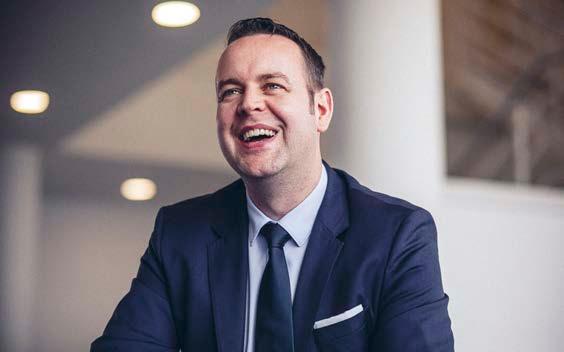
For while he enjoyed the pragmatism of engineering strategy, another passion burned brighter still; one that focused on building a great business, while having the freedom to solve problems and impact many people.
He says: “It took me a little bit of time to understand myself.
He says: “My little boy had been born, and my wife Gina was working up and down the country in pharmaceutical sales, so it made sense to have as much flexibility as possible."
“It was hard work for the first couple of years, but I built the business organically, identifying companies
50
Recruitment_ Advertising feature_Jackson Hogg
Richard Hogg, Jackson Hogg’s founder and chief executive
on a growth trajectory and working with, and speaking to, friends from my engineering days,” adds Richard, who studied mechanical engineering at Newcastle University across the turn of the millennium.
Such was the strength of the foundations he’d dug, Richard was able, in mid-2015, to press ahead with an ambitious growth strategy, which began with the opening of a Newcastle Quayside office in early 2016.
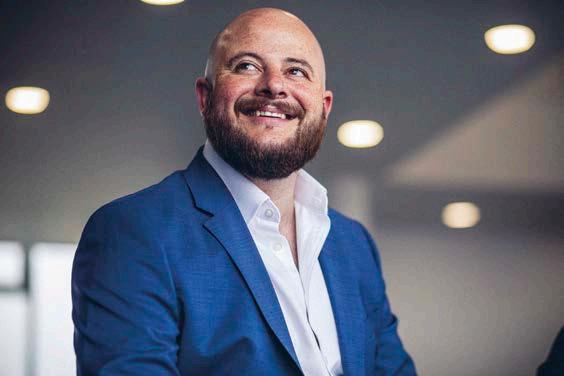
Now flanked by director Anthony Broadhead - who has since become chief operating officer - Richard rolled out a blueprint to go far beyond standard recruitment services and operate as a strategic talent partner.
The firm’s Talent Partnership - introduced in 2017created a platform for clients to hit headcount plans, increase the speed of recruitment and control costs, with its executive search and employer branding services following soon after.
In 2019, Jackson Hogg’s HR Partnership team entered the marketplace, providing clients with everything from day-to-day assistance to fully outsourced services, while in the same year, the firm expanded into the US tech recruitment sphere from the North East.
It is now making an increasing play in the evergrowing life science sector, doubling down on investment to ensure operators have access to highlyskilled staff.
All of the above – and more - help provide a highquality service to clients - ensuring they achieve talent objectives - while living out Jackson Hogg’s values, with their influence having enabled the business to grow largely through referrals, rarely losing a client over its years of trading.
And everything is underpinned by the three peoplefocused pillars Richard has carried with him from his early days: care, trust and respect.
He says: “We want to be there for our community.
“We have a serving mindset; our whole focus is to help clients grow, to help people progress their careers.
“I talk a lot about loving people, and some laugh because they think I’m talking romantically.
“But I always say, ‘what does it mean to love people, and care for them like they were family members?’”
Another key element in Jackson Hogg’s success is the relationship between Richard and Anthony, which, they say in unison, is built on “honest and vulnerable trust”.
Richard says: “When you have the confidence of working together like we do, it allows you to make decisions that are right for the business, its culture and its values.”
Anthony is equally effusive, pointing to the positive impact their approach continues to have on the company’s team, which was emphasised recently in an internal assessment that recorded an Employee Net Promoter Score of 97 out of 100.
He says: “Richard once said to me, ‘imagine if we could create an organisation where people love coming to work, where our clients and candidates love us, and where the whole marketplace would see a huge black hole if we were ever removed'.
“We’re still working to get there, but on the way we’re delivering great service that is helping solve clients’ headaches, all while creating a great, flexible working environment, wealth and employment for the region, and collaborations with some fantastic external partners.
To find out more about how Jackson Hogg’s Executive Search support can help your business recruit high-level professionals, and its wider programme of bespoke outsourced talent services and HR Partnerships, visit www.jackson hogg.com, email info@jackson hogg.com or call 0191 580 0495.
“And we’re proud to have reached this point without external investment.”
Richard says: “I live in the future, and we have an incredibly strong platform to deliver some amazing ventures down the line.
“It’s now all about further bringing out the depth of our support and our network, to extend our service to our community.”
Anthony adds: “We’re really only just getting started; we’ve got endless ambition.
“We are delighted with where we’ve got to - but there’s still so much we want to do.”
51
Anthony Broadhead, Jackson Hogg’s chief operating officer
Jackson Hogg
Recruitment_ Advertising
feature_Jackson Hogg
A proposition unlike others
With offices nestled between Newcastle’s past and present, independent Chartered accountancy and business advisory firm UNW is well versed in the city’s - and wider region’s - changing landscape. And, having recently bolstered its ranks with numerous appointments, including Durham-born partner and head of corporate finance Chris Wilson, it is using its knowledge and expertise to help clients usher in new eras of their own. Here, Steven Hugill speaks to Chris to learn more about UNW’s growth plans, its enduring independence, its unrelenting support for entrepreneurial businesses and his delight at returning to the North East.
Identity is important to Chris Wilson.
A son of Durham, and having been schooled in Newcastle, his character is marked by the North East.
It is perhaps no surprise then, that Chris is part of the growing team at independent Chartered accountancy and business advisory firm UNW.
For just like Chris, the Newcastle-based company is a beacon of North East identity, its ethos a mirror of the region’s innovation and individuality, of its people and geographies, a tag synonymous with going above and beyond to achieve excellence.
“The North East is home; it’s where I was born and grew up,” says Chris.
“It has a very strong, cohesive community.
"Having worked outside the region in recent years, when the opportunity arose to return, and with a firm like UNW, I grabbed it with both hands."
The opening to which he refers presented itself earlier this year, when Chris joined the business as partner and head of corporate finance.
But it wasn’t just the region’s counties and boroughs that lured the former Newcastle schoolboy turned KPMG corporate finance director back to his roots.
UNW’s unrelenting focus on the privately owned
marketplace - where it has provided assistance to clients such as Cleveland Containers, Perfect Image and Lanchester Wines - across areas including mergers and acquisitions, finance raising, due diligence and grant support and subsidies, meant he felt right at home.
Furthermore, the company, whose Newcastle offices abut the city’s famous medieval Morden Tower, recently refreshed its branding.
And, just like Chris, identity sits right at its core.
Reflective of the business’ growth momentum and vibrancy, the marketing features the tag line ‘unlike others’.
Highlighting UNW’s individuality, it also points to the firm’s agility, which allows its expert teams to intimately understand clients and tailor services to their unique needs.
Chris says: “The privately owned business sector is the backbone of the regional markets, and I have a real passion for working with its people.
“You get to work with some really interesting individuals, find out what they are doing and where they want to take their business.
“And helping them with strategic thought planning and supporting their growth journeys through to genuinely life-changing transactions and outcomes is incredibly rewarding,” says Chris, whose time at KPMG included nine
52
Campaign: UNW In collaboration with North East Times Magazine
In the corporate finance team, we have two partners from the North East on the ground in the region, with almost 50 years’ experience between us...

53
www.unw.co.uk @UNWLLP
years in Newcastle, where he worked extensively with businesses across the region.
He adds: “The fact UNW has such a strong commitment to that market made it an easy decision to join the team.
“The firm’s whole raison d'être is around privately owned businesses.
“And it is working very well; I’ve stepped into a business that is firing on all cylinders, which has grown consistently year-on-year."
“There is a modesty and humility to UNW, and we’ll never lose those traits,” continues Chris, who studied economics at The University of Edinburgh.
He adds: “But, at the same time, we genuinely do stand out from others in the marketplace.
“In the corporate finance team, we have two partners from the North East on the ground in the region, with almost 50 years’ experience between us of advising clients on strategic transactions.
“This provides us with a real edge, as well as a breadth and depth of experience that we can draw upon when advising clients.
“We are independent, and this is our business - each client relationship is personal to us, and is so important to us.
“When we say we're going to do something, we stand by it.
We are independent, and this is our business - each client relationship is personal to us, and is so important to us
“Our ability to work with clients, to closely interact with them, to take ownership of decisions and then deliver the outcomes, is genuinely empowering.”
The experience which Chris cites was bolstered in no small part by respected industry figure Paul Mankin, who joined in early 2022 as partner and chair of corporate finance.
Bringing almost four decades of experience to the companypredominantly helping businesses across areas including acquisitions and disposals, finance raising and valuations - from time spent at PwC in the North East and Yorkshire, Paul’s knowledge and experience is a fundamental part of UNW’s two-partner-led corporate finance team’s proposition.

54
Chris says: “Our offer is incredibly strong, and there is a really exciting opportunity to grow from what is already a very good base.
“The team has delivered consistent volumes of transaction activity, and the pipeline of opportunities is very full.
“We have scale, which puts us as one of the largest corporate finance teams in the region by headcount and, therefore, capacity.
"And we have ambitious plans to grow further – both through continued investment in the existing team and more strategic recruitment.
“And Paul adds another dimension; for a long time, he was the most senior and experienced corporate financier in the region.

“He has worked on countless transactions, and UNW, and by association our clients, are now benefiting from his vast experience.
“And, alongside my experience with KPMG, it makes for a seriously compelling offer,” says Chris, who spent 17 years with the Big Four firm, which included spells in Leeds, London and Cambridge.
He adds: “We’re hands-on, and there is very little we cannot do.
“And when you couple that with what is happening in the market, it is a really exciting time.
"UNW has always focused on providing real expertise, delivered in a thoughtful way, at a competitive price.
“That will never change, and our ambition now is to grow and maximise the opportunities in front of us, to broaden the offer and continue to be the best at what we do.”
A key element in ensuring UNW is able to do so will be its talent pathway, which complements experienced industry protagonists such as Chris with the next generation.
Expansions to its apprenticeship and graduate programmes - which provide trainees with practical learning
experience while working towards Association of Accounting Technicians and ICAEW Chartered Accountancy qualifications, respectively - boosted the company’s ranks by 20 in September, taking its headcount to 160.
And Chris says UNW’s commitment to recruitment at all levels will remain as it seeks to further strengthen its client offer.
He says: “We have a brand and a proposition that attracts talent, from the culture of the firm to the clients we work with, the environment we have created, the host of extracurricular activities we roll out through a year, and the opportunity for people to work with equally exceptional colleagues.
“The experience we offer is as good as, if not better than, anywhere else in the region, and that translates to a great pipeline of people coming through.
“And we do have genuine talent here.
“A very high proportion of our trainees are prize winners in the qualifications they’ve taken; we have the best of the best who deliver exceptional work for clients.
“We are very proud that UNW
students recently made up six of the top 20 trainee accountants in the North East and Cumbria, based on the latest ICAEW exam results.”
Chris adds: “And further recruitment will be a top priority as we seek to continue our growth and double down on who, and what, we are as a firm, and where we want to go.
“We already deliver outstanding services and add real value for clients both regionally and nationally, and we’ve got an existing, underlying growth strategy that is working very well.
“But we’ve also got a huge market opportunity to really accelerate our growth, and it’s one we’re determined to take.”
55
Campaign: UNW In collaboration with North East Times Magazine
UNW has always focused on providing real expertise, delivered in a thoughtful way, at a competitive price


A DESIGN FOR LIFE


58
TheHandBagClinic
Charlotte Staerck
Feature
www.handbagclinic.co.uk Instagram: The Handbag Clinic
Words by Steven Hugill Photography by Christopher Owens
Charlotte Staerck has gone from playground provocation to the vanguard of sustainable luxury. Once mocked for taking a handbag to school, she has transformed her passion for style into The Handbag Clinic, which is leading the way on eco-friendlier fashion. The business works internationally with the largest names, repairing, buying and selling goods to ensure their future use. And with a second fundraising drive imminent, it has plans to further expand its presence. Here, Steven Hugill speaks to Charlotte to find out more about the company’s origins, its global standing and how it is continuing to help change environmental perceptions.
4“I mean, who takes a handbag to school as a seven-year-old!?”
For a moment, Charlotte Staerck is back in the classroom, a smile sweeping across her face.
“I’ve always been very fashion conscious - I would argue with my mum about what I was going to wear to nursery,” she laughs.
“And when I was a little older, my auntie - and godmother - bought me a black velvet bag, which had purple flowers embroidered on the front.
“It would have been from a craft stall, but it had a label inside, which I thought was the be-all and end-all, and I took it to school with me.
“And I got teased for it.
“I remember one day flicking it over my shoulder and shouting, ‘it’s designer!’ before walking off.”
Charlotte’s grin spreads wider as she reminisces her riposte, the vision of her triumphant heel spin as clear today as it was then.
And there’s good reason.
For while her fleet of foot helped her avoid her tormentors, it highlighted something far more seminal.
The seed of fashion and glamour had been sown, and as Charlotte grew, so did the outline of what today stands as The Handbag Clinic.
“As a teenager, I worked at Jane Norman, in the Metrocentre, and opposite the store, right in my eyeline, was House of Fraser,” says Charlotte, who spent her childhood years in the former mining settlements of Rowlands Gill and High Spen.
“As soon as I got my wages, I was straight over there.
“At the time, Mulberry was the highest designer handbag brand you could get, but I couldn’t afford it, so I got a DKNY one instead.
“And after that, I saved up for another, and kept them for a while before selling them on eBay.
“I realised that once I’d sold two, I could get a Mulberry - and things went from there.”
Like all good commercial success stories, Charlotte’s includes a
59

60 The HandBagClinic Feature
CharlotteStaerck
great deal of entrepreneurial nous, as well as an obliging helping of serendipity.
Before the days of her high-end venture, she worked in Gateshead Council’s waste and recycling department, having begun at the local authority as a reception desk apprentice.
And one day, with her favourite tote in need of attention, she searched for a solution, which would have put her directly on course with her future partner, but for a misplaced piece of paper.
Charlotte says: “The dye off my jeans had transferred to my handbag, so I was looking around to get it repaired.
“My boss at the time said, ‘I’ve seen this company’s van driving around, why don’t you contact them?’
“She gave me their number on a PostIt note, it was the contact details for Furniture Clinic, the company my now husband Ben was running alongside his father.
“But I lost it.”
However, it was, Charlotte admits, like they were meant to be drawn together, like fate had intervened to bind their personal and commercial strands into a combined thread.
For, a couple of years later, their paths did cross during an evening in Newcastle, with Charlotte - rather ironically - carrying on her shoulder the very handbag that was once in need of repair.
By this point, she had swapped the council for the NHS, running a buying team that ensured healthcare sites from Ashington to Carlisle were suitably stocked with pharmaceuticals and surgical supplies, such as artificial joints for knee replacements.
And as she grew closer to Ben, so too did their commercial partnership blossom.
With the Furniture Clinic servicing increasing numbers of totes for Charlotte, the decision was taken to spin The Handbag Clinic out of the family company. That was nearly a decade ago.

And the pace of its growth has remained unrelenting ever since.
Today, the venture - whose Hobson headquarters straddle County Durham’s northerly border with Gateshead - is
recognised globally, with in-store concessions in Fenwick’s Newcastle and Colchester stores matched by a base in Leeds, another on Chelsea’s expensive streets and shops in the equally lavish surrounds of Monaco and the Middle East.
Famed for its expert restoration team, which repairs and rejuvenates 700 bags every month from workspaces in its industrial estate base, the company is also a hub for buying and selling the world’s largest brands, and the trusted provider of authentication to the country’s most eminent auction houses.
It also recently launched an endeavour to sell handbags directly on brands’ behalf, finding homes for goods that may have originally struggled for market traction, been part of an overstocking issue or are in need of repair.
Such is its momentum, The Handbag Clinic chalked up record 130 per cent year-on-year growth across the last 12 months, with an 87 per cent uptick in handbag acquisitions and a near 40 per cent rise in restoration sales, leaving it on track to achieve a £2.8 million turnover target this year.
Even COVID-19 failed to restrain things, with the business turning over £1 million and retaining all staff - while adding new
roles - despite the turbulence.
And its growth trajectory is poised to increase yet further.
Having secured £800,000 a year ago through the North East Venture Fundthe cash pot supported by the European Regional Development Fund and managed by investment house Mercia - Charlotte reveals The Handbag Clinic is embarking on a second fundraising drive.

Its first tranche allowed the business to recruit ex-Claire’s Accessories boss Beatrice LaFon as chair and welcome WhoCanFixMyCar.com founder Ian Griffiths as digital strategy consultant and former END financial controller Sarah-Jane Veitch as financial director, with further roles filled across product management and development.
Their arrival has helped nearly double staff numbers to close to 50 and, with such foundations in place, Charlotte says the firm is ready to move to another level.
She says: “We’ve taken a whole new turn.
“We’re really pushing through the targets we set ourselves and making the most of the initial investment.
“The first round allowed us to build a base infrastructure, and now we’ve got that, it’s time to go above and beyond and
61
grow further.
“We have plans for geographical expansion in the UK, and are looking to grow the North East team too.”
Sitting in the company’s base, its office walls appropriately whitewashed as the site goes through its own rejuvenation, Charlotte sits back in her chair, the colourful adventures of the last ten years flashing through her mind.
She says: “I’m a girl from the North East - I don’t have all the connections and I didn’t go to school with such-and-such’s uncle.
“My path isn’t what you’d normally see for someone running a fashion business.
“Some people do fashion degrees, but
I learnt a lot of my skills from the council and NHS.
“I’m very comfortable working with customers, clients and finding solutions to complex situations thanks to my time at the council, where I had to deal with issues like stolen bins, and I’ve got great purchasing and supply experience from my NHS days, which I’ve been able to build on.”
A look at The Handbag Clinic’s order book attests Charlotte’s acumen, its pages brimming with work from international fashion houses and celebrities, right down to those needing help following a domestic catastrophe.
She says: “Barring three of the 20-plus
key handbag brands you could name, we work with all of them.
“And that speaks volumes for what we do.
“We work on hundreds of bags every month, from repairing a £40,000-plus Hermès bag to shortening a shoulder strap.
“I remember us once helping a lady who’d found one of her mum’s handbags.
“It was unbranded, but she just wanted it to look great again.
“When we’d repaired it, she rang us in tears; she was so happy to have a part of her mum with her once again.
“Our clinic is like a treasure trove of stories like that - from the naughty puppy that’s chewed a tote to restoring a Chanel bag after its owner’s daughter has drawn Cinderella on it - we cover everything."
“Celebrities come to us - everyone from reality television stars to your top models,” says Charlotte, who reveals the business has also worked on shoes, leather jackets, backgammon boards and even sword cases.

She adds: “The big fashion brands have all approached us over time, including one very well-known name that came to us after seeing our YouTube channel.
“I created it during the pandemic, to show customers what happens to their bag when they send it to us.
“I shared a video of a Chanel restoration, and it went crazy.
“This client saw the video and was so impressed that it told the other brands in its group they should work with us.
“We train store staff for a lot of brands and work with their aftercare teams to assess and fix items.
“We’re the preferred partner for customer recommendations for some brands, and we provide support around manufacturing issues - if 50 zips need fixing on 50 handbags, for example, we will do that.
“We work closely too with the auction houses, providing pre-sale cleaning and repair services for Christies, and authenticating bags for Bonhams and Chiswick.”
And with such an impressive contacts
62
list, and the impending impact of its second round of financial support, Charlotte says The Handbag Clinic will remain a fixture at the vanguard of sustainable fashion.
She attributes a portion of the company’s environmental focus to her time in local government, which she says “opened her eyes” to the necessity of watershed change.
And she says she is proud to have made a significant impression on the fashion industry’s green agenda and certainly that of its clientele, who haven’t always been so universally understanding of the sector’s impact on the environment.

She says: “We were definitely ahead of the curve on sustainability, and we still are.
“All the cloths we use in the clinic to apply products to handbags are old linens and towels from hotels.
“We’ve adapted our building with things like solar panels, and we’re looking at fully sustainable packaging too - everything we do is circular.”
Charlotte adds: “I remember living in a flat in Chelsea a few years ago, and walking past big townhouses that had Chanel handbags slung at the side of the road.

“There was nothing wrong with them - I
couldn’t believe what people were willing to throw away.
“I also remember going to networking events and being asked, ‘why would you want to buy an old bag?’
“People thought it was bizarre.
“But the tables have completely turned, and people are now asking if we can fix something they’ve found in a wardrobe, or help find them a Chanel handbag.
“The change in conversations, even from just three or four years ago, has been so dramatic.
“We’ve been talking about this for a decade, and it’s great the world has caught up.”
63
Charlotte Staerck
Feature
feature_Melius Cyber
Make Cyber Essentials Plus a key objective for 2023
With cybercrime an ever-increasing threat to business, Richard Brown [pictured, below], chief executive at Newcastle-based Melius Cyber, says it is vital firms put investment in online security at the top of their new year to-do list.
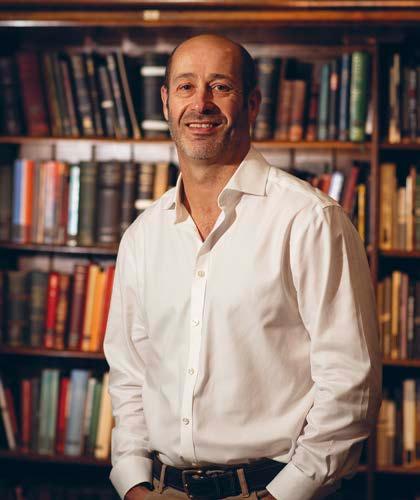 www.meliuscyber.com @MeliusCyber
www.meliuscyber.com @MeliusCyber
MOST BUSINESSES INVEST IN TECHNOLOGY
out of necessity, rather than to seek growth or innovation.
And many do so reluctantly, often solving a problem that could have been avoided with planned investment.
The same is true with cybersecurity; businesses play Russian roulette under the impression that it won’t happen to them.
But while 39 per cent of UK businesses reported a cyberattack during 2022, the levels of prevention and response remain surprisingly low.
The security of your business and its data is only as strong as the weakest link in your IT infrastructure.
Melius Cyber
For more information on how Melius Cyber’s expert support could help your business, visit www. meliuscyber.com or contact its Newcastle office on 0191 249 3003
In recognition of this, the Government backed a cybersecurity certification scheme, known as Cyber Essentials/Cyber Essentials Plus.
This is a simple, but effective, scheme that helps organisations protect themselves from a range of the most common cyberattacks.
The scheme is designed to be achievable regardless of organisation size and structure.
While awareness of Cyber Essentials is growing, a recent Government survey states only 16 per cent of respondents were aware of the scheme.
With Government suppliers now required to be certified, uptake has increased and IASME not too long ago announced the issuance of its 100,000th certificate as companies seek public sector contracts from lower credit risk clients.
Compliance is not just confined to Government procurement, though.
Latest data shows 27 per cent of medium-sized firms and 44 per cent of large firms are now screening the cyber risk posed by their supply chains, with Cyber Essentials Plus seen as the benchmark to offset risk.
Additionally, a number of industry bodies, including the Law Society, now recommend members gain certification.
The above scenarios are exactly why Cyber Essentials and Cyber Essentials Plus were designed; to provide a cost-effective way of ensuring the key pillars of cyber hygiene are addressed in an organisation.
The basic Cyber Essentials certification is a selfassessment option that gives protection against a wide variety of the most common cyberattacks.
This is important, because vulnerability to simple attacks can mark you out as a target for more in-depth,
64
Technology_ Advertising
unwanted attention from cyber criminals.
Certification gives you peace of mind that your defences will protect against the vast majority of common cyberattacks, simply because these attacks are looking for targets which do not have the Cyber Essentials technical controls in place.
Organisations assess themselves against five basic security controls, and a qualified assessor verifies the information provided.
Cyber Essentials Plus is a higher level of assurance, which involves completing the online assessment and then a technical audit of the systems that are in-scope for Cyber Essentials.
"27 per cent of medium-sized firms and 44 per cent of large firms are now screening the cyber risk posed by their supply chains"
feature_Melius Cyber
This audit includes a representative set of user devices, all internet gateways and all servers with services accessible to unauthenticated internet users.
Your assessor will test a random sample of these systems (typically around ten per cent) and then make a decision whether further testing is required.
While the costs vary according to the size and complexity of the IT estate, testing fees for Cyber Essentials range from £300 to £500, and from £1500 for Cyber Essentials Plus.
These fees exclude the work involved in preparing for the audit, but in general, when compared to penetration testing and other solutions, they represent real value for a business; particularly when their achievement can open up new opportunities or secure valuable long-term customers.
When considering the average cost of a cyberattack to UK SME businesses is £11,000, the cost of certification appears good value.
In addition, there are ongoing annual savings, as SMEcertified companies were 60 per cent less likely to make a claim on cyber insurance, thus reducing premiums and claims experience.
"Implementation costs of Cyber Essentials and Cyber Essentials Plus can be reduced by adopting a solution which provides 24/7 penetration testing and monitoring of your infrastructure"

Finally, Cyber Essentials can highlight inefficiencies in your IT security and allow surplus products and services to be cancelled or streamlined - so the investment can certainly yield dividends.
Both qualifications last for 12 months, and it is worth noting your business will need to be tested annually.
The implementation costs of Cyber Essentials and Cyber Essentials Plus can be reduced by adopting a solution which provides 24/7 penetration testing and monitoring of your infrastructure.
This will provide up-to-date scanning against the latest known threats, and will highlight areas of vulnerability at the earliest point, enabling immediate remedial work to eliminate the threat.

Using this type of service ensures businesses are fully in control of the cybersecurity across their infrastructure, and are fully aware of potential vulnerabilities and the severity/impact they could have.
This also makes re-certification to schemes like Cyber Essentials Plus quicker to achieve without the exercise being labour-intensive or costly – ensuring a fixed known cost annually.
The message is clear; don’t think cyber solutions cost the earth and are a drain on your budgets - there are cost-effective solutions out there, aimed at businesses of all sizes.
At Melius Cyber, we specialise in helping businesses and professional services firms achieve Cyber Essentials and Cyber Essentials Plus, using our remote monitoring tools to assist in achieving certification and continuously monitor your business throughout the year.
If you would like to discuss your cybersecurity, and learn more about how Cyber Essentials can help your business, please get in touch.
65
Technology_ Advertising
IA Growth
For more information on how IA Growth’s expert support could help your business, contact Graham Sleep on enquiries@ iagrowth.co.uk or visit www. iagrowth.co.uk
Don’t sweep away your success
Building an effective market strategy alongside a financial plan is a key factor in any business success story. However, if the two are not closely aligned, then it can lead to a disastrous final chapter, as Graham Sleep, director of Durham-based IA Growth explains.
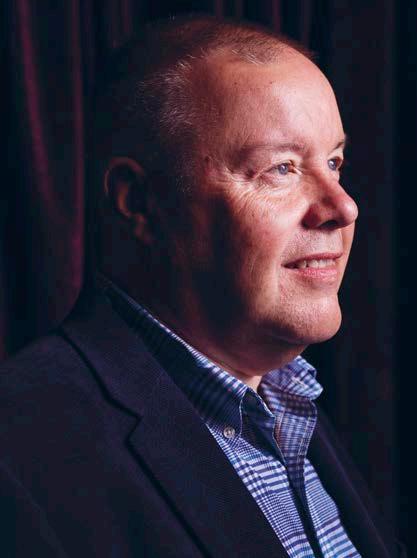
www.iagrowth.co.uk @IaGrowth
FOR MOST PEOPLE GROWING UP IN THE 1970s and 1980s, there was only one vacuum cleaner: the Hoover.
Invented in the early 20th century in the US, the product revolutionised household cleaning and soon became a great success in the UK, so much so that Hoover became - and remains - a generic noun.
But its success was swept away by an ill-thought out marketing campaign, which had catastrophic consequences for a very simple reason.
It didn't add up.
For all its previous successes, by the early 1990s, Hoover was on the slide, its sales hit by the impact of an economic downturn and a sharp increase in demand for competing brands.
The UK was entering the throes of a recession, and Hoover faced stiff competition.
Between 1987 and 1992, Hoover’s profits fell by more than half, with ill-fated products, such as a ‘talking vacuum’, which warned users when to change the dustbin, failing to address its woes.
In short order, excess inventory began to pile up in its warehouses — and its 50 per cent market share in England diminished.
The long-established company felt it needed to do something dramatic, daring and attention-grabbing.
The solution, so thought its marketing team, was a massive promotional campaign based around free airline tickets.
‘Hoover free flights’ was launched by the British
division of the company in late 1992, offering two complimentary round-trip plane tickets to the US, worth about £600, to any customer purchasing at least £100 in Hoover products.
Convinced of its market appeal, a massive advertising campaign across television and newspapers
66
Business_ Advertising feature_IA Growth
was rolled out.
However, consumer response was much higher than the company had anticipated, with many buying only the minimum £100 of products needed to qualify.
It was perceived as two US flights for just £100, with a free vacuum cleaner included.
The resulting demand was disastrous for the 84-yearold company.
Hoover cancelled the ticket promotion after consumers had already bought the products and filled in forms applying for millions of pounds' worth of tickets.
Reneging on the offer resulted in protests and legal action from customers who failed to receive the tickets they had been promised.
As U-turns go - and we’ve seen a few of those recently - it was a disaster, a financial catastrophe which ultimately led to the loss of Hoover's Royal Warrant following the airing of a 2004 BBC documentary.
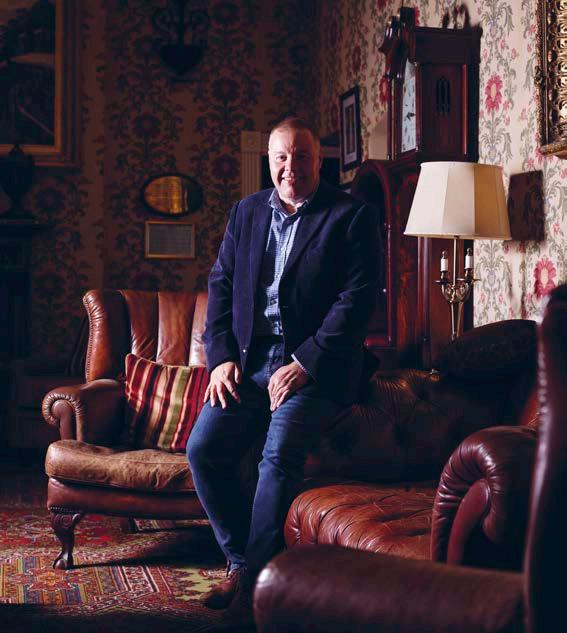
The European branch of the company was eventually sold to competitor Candy, having never recovered from the losses, the promotion and the subsequent scandal.
So, what can be learned from this sad tale?
Well, first and foremost, the numbers must add up.
In the case of Hoover, just as for any business, accurate war-gaming of initiatives is essential.
Key questions around finance must be at the heart of any planned activity - companies must ensure they know the answers to areas such as:
• what is the best and worst-case scenario?
• what is the likely return on investment?
• what can go wrong and, if it does, what is the correct way to deal with it?
These key questions need to be asked, together with data-driven market research and carefully planned communications.
In challenging times, like those we’re experiencing right now, businesses in difficulty often seek a silver bullet solution to address their fortunes.
However, life is rarely as simple and, in truth, a business’ issues are usually very deep-rooted.
That’s where our team at IA Growth comes in.
We have expertise across key disciplines and, most importantly, scenario planning and decision-making, so we may help prevent these types of disasters from occurring.
We think in a diverse way, because diverse thinking enables a business to avoid going down a blind alley and steer instead towards success.
Just ask Hoover.
67
Business_ Advertising feature_IA Growth
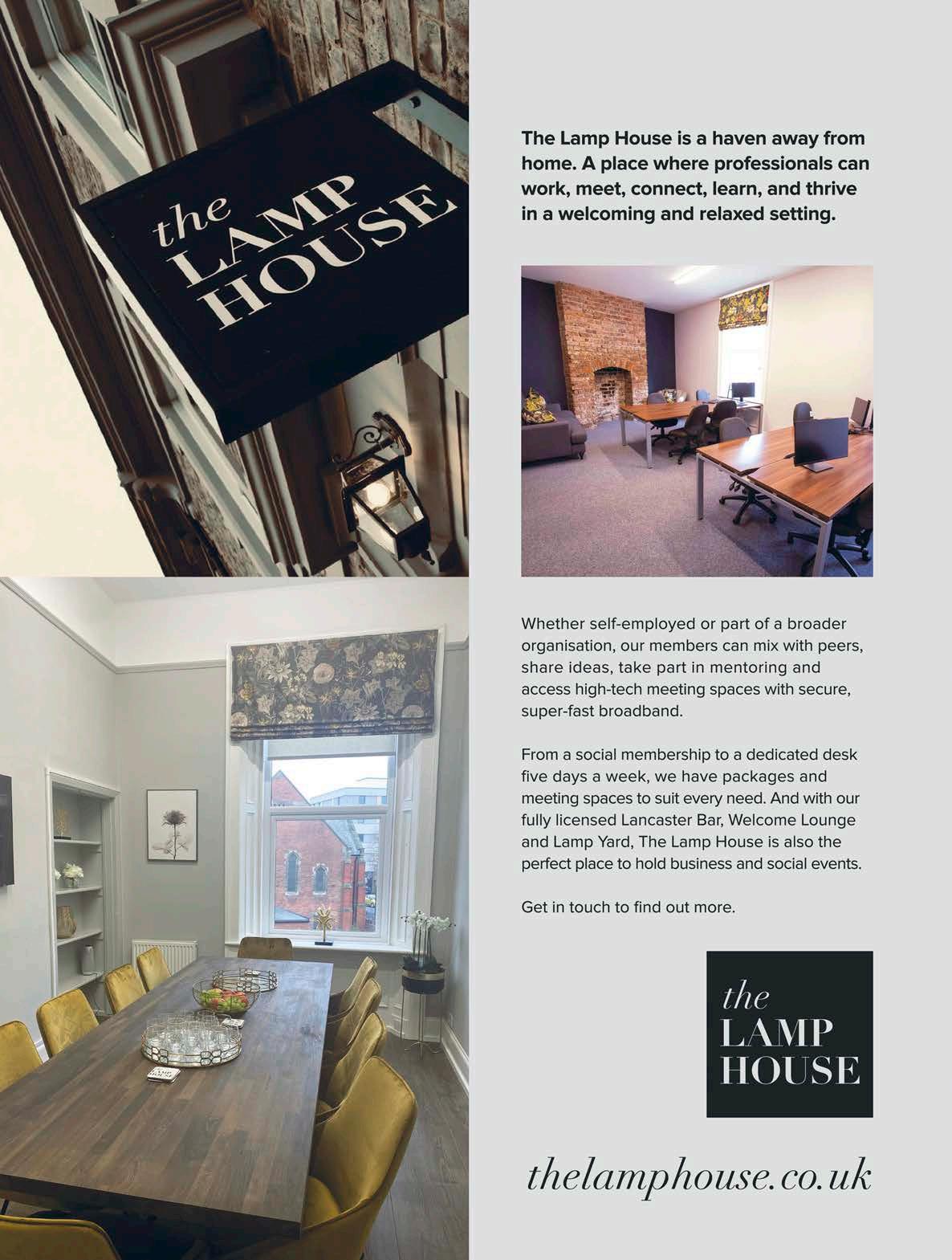 Mouldings
Mouldings
Innovative. Collaborative. Forward-thinking.
Plastic Mouldings Northern is a regionally rooted business that has built a prominent reputation across the global manufacturing sector. The 20-year-old Bishop Auckland-based company was set up by Freddy Bourdais and Mark Rigg, and has grown year-on-year. Here is an insight into its story.
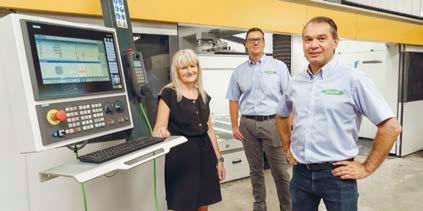

www.pmn-ltd.co.uk @pmn_ltd
PLASTIC MOULDINGS NORTHERN HAS DOUBLED turnover, expanded its workforce to 22, completed a new site acquisition to increase its footprint to 45,000sq ft and invested in key logistics over the last two yearsall in the face of the pandemic.
Its main output is the production of vacuum formed plastic parts, which involves the supply of high-quality and often very intricate moulded parts to an array of industries, from automotive to precision engineering.
The company supplies clients domestically and internationally, with recent contracts established in Australia and New Zealand.
It is the only stockist of new plastic containers and plastic pallet boxes in the North East, and is also the largest dealer of reconditioned plastic pallets in the UK.
Plastic Mouldings Northern
A manufacturer of custom-made packaging and material handling solutions, the company supplies an expansive and sectorspecific range of products, from Euro stacking containers and pallet boxes, to food handling and spill containment goods.
It partners with French firm JOUPLAST®, and holds the exclusive contract to distribute the latter’s innovative range of landscaping products across the UK and Ireland.
Turnover in this part of the company alone hit more than £1 million last year.
69
Manufacturing_ Advertising feature_Plastic
Northern
AT THE VANGUARD OF CHANGE: THE NORTH EAST AND THE GREEN INDUSTRIAL REVOLUTION
The North East’s central role in the green industrial revolution
Welcome to VISION 2031, the campaign launched by North East Times Magazine that will lay out a blueprint for how our region can stand at the vanguard of global, environmentally-focused progress across the next ten years.

Over the coming months, VISION 2031with support from North East Times' partners Northstar Ventures, main sponsor Northern Accelerator, EY, Jackson Hogg, Lloyds Banking Group and Weightmans - will pinpoint areas of success, innovation and improvement to drive the region forward.
Words by Steven Hugill Photography by Angela Carrington
Here, in the first high-level roundtable event of the series, individuals from a number of leading organisations assess the area’s prowess in spearheading the green industrial revolution.

70
















71
THE PANEL INCLUDED:
SPONSORED BY:
Dominic Endicott Director, Northstar Ventures
Professor Tony RoskillyChair of energy systems at Durham University; director of Durham Energy Institute; member of the Hydrogen Advisory Council Research and Innovation Working Group
Mike Capaldi Dean of innovation and business, New castle University
Chris Beck Director of clean growth and innovation, Tees Valley Combined Authority
Tom Nightingale North East stake holder manager, Equinor
Neil Spann Chief executive, Power Roll
Chi Onwurah MP for Newcastle Central and chair of the all-party par liamentary group for diversity and inclusion in STEM
John Duns (chair) Director, North East Times Magazine
Dr Tim HammondDirector of commercialisation and economic development, Durham University; project lead, Northern Accelerator
Alex FogalAssociate partner, EY
Richard HoggChief executive, Jackson Hogg
Gary ChapmanCo-head of North region and director - industrials and infrastructure, Lloyds Banking Group
Paul WighamPartner, Weightmans
Professor James WidmerFounder and chief executive, Advanced Electric Machines
4There’s a storm brewing in the North East - and it’s got the potential to create an almighty power surge.
Once the cradle of the railways, today the region is nurturing another brainchild: the green industrial revolution.
From Nissan’s £1 billion EV36Zero development alongside Envision AESC - which promises a new allelectric model and battery factory - to carbon capture and storage developments at Teesworks, the scene is rapidly evolving.
Add in the Faraday Institution’s regional office at Newcastle University, the Driving the Electric Revolution (DER) programme - which will establish a power electronics, machines and drives component supply chain - the Sunderland-based DER Industrialisation Centre and the North East Battery Alliance, and the region’s place at the forefront of change becomes clearer still.
But other clusters too are showcasing their potential to lead sustainable, knowledge-driven, economic development and growth.
From the Blyth-based Offshore Renewable Energy Catapult to Equinor’s decision to lay foundations at Port of Tyne to operate the North Sea-based Dogger Bank Wind Farm and SeAH Wind’s £400 million Teesside arrival, much is happening around offshore power.
Staying in the south of the region - which already produces more than half of the UK’s hydrogen - and the Teesworks venture is transforming ex-Redcar iron and steel land into a green energy hub.
The endeavour includes Net Zero Teesside Power, which is headed by BP and moving ever closer to delivering a gas-fired power station with next generation carbon capture and storage capabilities.
Additionally, Newcastle University, alongside Northern Gas Networks, Northern Powergrid and Northumbrian Water, has established the InTEGRel industrial testbed, with digital twinning through Siemens Mindsphere, on Newcastle Helix, to deliver an integrated, low-carbon energy system.
The North East has a proud heritage of breaking new ground.
And it has much promise to lead from the front again when it comes to the green industrial revolution.
WHERE DOES THE NORTH EAST STAND IN THE GREEN INDUSTRIAL REVOLUTION?
To site the region’s place in a new commercial era, requires first to look at what went before, to the birth of the railway, the ‘black gold’ of coal mining and the
days when huge ships loomed large over residential rooftops.
All were economic dynamos that drove the North East and its economy, providing employment for thousands and fuelling the region’s reputation as an industrial powerhouse.
Today, the railways have shifted from steam power, the mines’ winding towers have long since made their final turns, and the shadows of the shipyard superstructures have disappeared.
Out of change, though, comes opportunity, and where carbon-intensive industry once prevailed, today a new age of clean energy and sustainability is taking over.
And for the North East, charged by its forefathers’ pioneering and ambitious spirit, this rapidly transitioning landscape represents significant potential.
So much so, Mike Capaldi, dean of innovation and business at Newcastle University, told the VISION 2031 roundtable the region is ready to lead again.

He said: “The North East used to be the centre of UK industry; it once made 40 per cent of the world’s ships.
“But it dropped away.
“The South East has grown, and the North East has competition from the ‘golden triangle’ (the university cities of Cambridge, Oxford and London) and the Midlands, so it has to fight much harder.
“But, if you look at new technologies in batteries, power electronics, machines and drives, offshore wind and cable technology, the North East is going to be a major contributor to the green revolution.
“There is almost a second industrial revolution starting here.”
“The opportunity to create manufacturing in the UK, and the North East, is massive.
“The model of making things in China and shipping things around the world, is going to change”
72
Neil Spann
Mike found support from Tom Nightingale, North East stakeholder manager at Equinor - which will oversee operation of Dogger Bank Wind Farm - who pointed to the region’s knowledge base.
He said: “There are some well-established clusters around the UK when it comes to offshore wind, and I would say the North East is the strongest.

“We have very good industrial heritage, thanks to the region’s oil and gas experience, and the ability to transfer that to offshore wind.”
Professor James Widmer, founder and chief executive of Washington-based electric motor and powertrain system maker Advanced Electric Machines, added: “The region has really exciting potential.
“The fact we already have a (Nissan) battery plant, and have another (Envision AESC) going up, is a huge boost, as is the work around offshore wind.”
Gary Chapman, co-head of North region and director - industrials and infrastructure - at Lloyds Banking Group, also nodded towards the region’s infrastructure, highlighting the prowess of its marine bases, and the swathes of greenfield and brownfield space at prospective companies’ disposal.
He also spotlighted Teesside’s Government-backed freeport status as a chief catalyst in catapulting the area into the consciousness of investors, both national and global.
Incorporating Teesside International Airport and the Teesworks development, the freeport offers tenants trade incentives including tax reliefs and simplified customs procedures.
Gary said: “We have high-quality assets, from the ports of Blyth, Tyne, Sunderland and Teesport, to the freeport area.
“There is a huge bank of land available to support the supply chain for the likes of Dogger Bank too.
“For every job created in a port, there are three created in the real economy, so these are great assets to be stimulated.
“And because sterling has depreciated heavily against the dollar over the last 12 months, sterling assets are far more attractive than they have ever been to overseas investors.”
The positivity was echoed by Alex Fogal, associate partner at Newcastle-based professional services firm EY.
She said: “If you look across the North East energy sector, there is far more happening here than across the North as a whole.
“I was in London recently, and the number of comments about what is happening in our region far outstripped anything happening in the capital.
“Our region is the place to be.”
Alex’s optimism was backed by Paul Wigham, partner at Newcastle-based law firm Weightmans.
He said: “New funds are coming to the region, people are listening more, and we are starting to break through in terms of the clean energy and offshore wind message.”
And the region’s repute was further emphasised by Professor Tony Roskilly, chair of Energy Systems at Durham University and director of Durham Energy Institute.
He added: “There are other regions that have had a higher profile, and done well to promote themselves, but the North East is catching up.
“The hydrogen and carbon capture and storage projects provide huge opportunities.”
INTEREST AND INVESTMENT IN THE REGION IS PALPABLE, BUT MUST THE NORTH EAST DO MORE TO MAINTAIN ITS MOMENTUM?
Barring its Brexit wobble, Nissan’s near four-decade residence on Wearside has long acted as a kingpin for the North East in terms of raising its standing as a place to lay commercial roots.
As well as making millions of cars, including its flagship all-electric Leaf hatchback, the Japanese company has acted as a lodestone in the creation of a sprawling Washington ecosystem around its equally expansive factory.
And, said Dominic Endicott, director at Newcastlebased investment house Northstar Ventures, it is an ethos that must be channelled to ensure the region’s place at the vanguard of the green industrial revolution.
73
“The quantum of opportunity in the North East, when you look at the collective across infrastructure, regeneration and start-ups and scale-ups, is a really big number”
–Dominic Endicott
“If you look at new technologies in batteries, power electronics, machines and drives, offshore wind and cable technology, the North East is going to be a major contributor to the green revolution” Mike Capaldi
He said: “The quantum of opportunity in the North East, when you look at the collective across infrastructure, regeneration and start-ups and scaleups, is a really big number.
“And what we need to say to investors is, ‘we are the premier of energy - we will be truly outstanding against other regions’.
“We need to integrate our story and feed it into the City in a way it will understand.
“We must show investors they can re-invent themselves up here, that they can create a hub of attraction in the region, that we are the place to come and build.
“There aren’t many places that can show progress quickly, and that represents an amazing opportunity for the North East.
“The moment investors see the business opportunities, they will get on the train.
“We should be getting ahead of the curve.”
Chris Beck, director of clean growth and innovation at Tees Valley Combined Authority, concurred, saying the region’s impetus will be maintained by complementing its inventive spirit with tangible investment.
He said: “We are at a precipice, a turning point; we’re going from nice ideas to seeing reality happen.
“We’re seeing offshore wind with UK content coming through in Newcastle and Blyth, and on Teesside we’re seeing carbon capture and storage.
“But if we are really going to make this region different, we’ve got to start looking at how we commercialise it, not just the university spin-outs, but how do we get those big companies in, and get the cluster effect going, so we can grow around it?”
“The big firms are where the capital and skills are,”
agreed Neil Spann, chief executive at Seaham-based solar film developer Power Roll.
“How are we empowering the big corporates to the table?
“They need to be part of the ecosystem because they can accelerate processes.”
Tom was equally approving, highlighting the impact of Equinor’s work with the national Catapult network, which includes the Blyth-based National Renewable Energy Centre.
He said: “As a region, this is our opportunity to lose.
“We’ve done a lot of work with the Catapult, and I’d like to see more large centres of innovation like that, because they draw in more businesses.
“The North East is so well positioned with its many big projects, and we need to build on the momentum.
“And supply chains are really important to that.
“It’s not always easy, but as soon as you get one big project, and you can get the supply chain to come, that is a huge advantage.”
Prof Roskilly, who is also a member of the Hydrogen Advisory Council Research and Innovation Working Group, added: “The region has to embrace the circular economy.
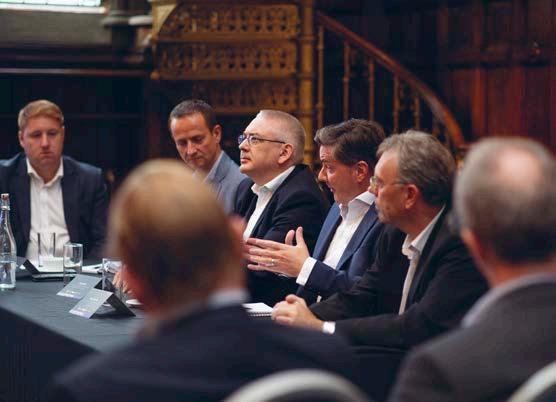
“That will be really important to the sustainability of the supply chain.”
HOW COULD THE REGION FURTHER STIMULATE INVESTMENT IN THE GREEN ECONOMY SUPPLY CHAIN?
Using the example of Middlesbrough-headquartered GB Bank, which has pledged a £3 billion lending boost to the property sector, Dominic asked whether something similar could be introduced to boost the green supply chain.
GB Bank offers loans of between £500,000 and £5 million to developers, small and medium-sized businesses and construction companies, which it says will help create more than 100,000 jobs, several million square feet of office space and 20,000 homes over the coming years.
And the idea of transposing its blueprint to the North East’s role in the green industrial revolution was not lost on Gary.
He said: “We’ve set up a regional regeneration team to look at incremental lending opportunities over and above business as usual, to support job creation in the regions.
“We are spending huge amounts of time looking at getting behind regional regeneration - it’s a core pillar of our Helping Britain Prosper strategy.
“We have committed £15 billion in sustainable finance
74
“There are other regions that have had a higher profile, but I think the North East is catching up now. The hydrogen and carbon capture and storage projects provide huge opportunities for us”
Professor Tony Roskilly
“What the market needs, in abundance, is very fast reskilling and upskilling, and courses that can transition to different sectors to cope with demand”
Richard Hogg
“We have very high-quality assets, from the ports of Blyth, Tyne, Sunderland and Teesport, to the freeport area on Teesside.
And for every job created in a port, there are three created in the real economy”
by 2024.
“We see the opportunities.”
A KEY STRENGTH OF THE NORTH EAST IS ITS FIVE UNIVERSITIES, WHICH - BOOSTED BY THE COLLABORATIVE NORTHERN ACCELERATOR PROGRAMME - ARE TRANSFORMING RESEARCH INTO WORLD-LEADING INNOVATION. HOW IMPORTANT A ROLE WILL THE INSTITUTIONS PLAY IN THE REGION’S GREEN AGENDA?
“Where we have done well, and where we need to do more, is the collaboration between the universities,” said Prof Roskilly.
“We have, for example, collaborated very successfully with Teesside around hydrogen activity.
He said: “Across the wider energy arena, the region has projects like Net Zero Teesside Power, but where I think it probably excels is that an ecosystem has been bubbling away and building for many years around the universities.
“And the universities have projects we’ve found so easy to join and support.”
SKILLED WORKERS ARE THE BACKBONE OF SUCCESSFUL COMMERCIAL VENTURES. BUT DOES THE NORTH EAST HAVE A SUFFICIENTLY STRONG, AND PRACTISED, EMPLOYEE BASE TO DRIVE FORWARD THE GREEN INDUSTRIAL REVOLUTION? AND IF NOT, WHAT ACTION IS TAKING PLACE TO STRENGTHEN THE TALENT POOL?
Having an engineering and manufacturing heritage is one thing, but harnessing that legacy to write a new chapter in the North East’s industrial story is something entirely different.
And the panellists were united in their belief that while the region has many plus points in leading the green agenda, a major negative could be a lack of skills, with much discussion over the need for a robust talent pipeline and retraining programmes so workers can traverse sectors.
Mike said: “The elephant in the room is that the North East still has the lowest school-leaver attainment level in the UK.
“Unless we get to grips with that, it’s going to be tough to see how we can supply the workforce capable of fuelling this industrial development.
“The North East feels really energised. And it is getting noticed elsewhere - our region is the place to be”
“As a region, we are more collegiate.
“Most projects are multi-discipline, and we have got the strength across the universities to provide the skills needed to compete not just in the UK, but internationally.”

Chris said: “The collaboration really comes through, and that doesn’t happen in a lot of other regions.
“It’s a strength we should recognise.”
“We are at a precipice, a turning point; we’re going from nice ideas to seeing reality happen”
Paul added: “Certainly, over the last 15 to 20 years, I’ve seen a big change in the way the universities have come together.
“It’s fundamental for the North East because we don’t have that many private sector investors and collaborators rushing to us.
“What the universities are doing is good to see.”
Tom was equally effusive, underscoring the strength of the academic ecosystem from Equinor’s perspective as a company arriving in the region.
“Another challenge is that because technology is moving so fast, a lot of schools and colleges don’t know what the future holds, and what they should be teaching.
“At the moment, we’re not set up to create and provide a workforce that’s going to feed the beast.
“We need to get the number of engineering graduates up again.
“We need to talk to schoolchildren about the great things that are happening around electrification and green energy, to get them excited so they want to build things and come out as engineers, rather than media stars.”
He added: “But it’s about reskilling too.
“We need the infrastructure and capabilities in place, for example, to retrain people working on combustion engines to electric vehicles.”
Prof Widmer agreed, saying a strong skills base would add greater weight to the North East’s investment pull.
He said: “Regionally, we are fantastic at making
75
Gary Chapman
Alex Fogal
Chris Beck
things and for fundamental research, but there is a gap in between at the moment.
“If we get the skills here, the companies will follow.”
Chris, however, issued some caution, warning the fostering of young talent before a jobs environment is truly engrained runs risk of merely adding to the region’s ‘brain drain’, wherein workers have decamped to other UK cities and geographies in search of career progression.
He said: “You cannot train people up until you have the jobs.
“We have to balance skills with opportunities.
“We need to see where industry is going, and play to our strengths.”
He added: “A frustration I have around training is when people say, ‘we need to do new skills for hydrogen’ - we don’t.
“A boiler fitter is a boiler fitter - what they need to be able to do is fit a hydrogen boiler as well as a gas boiler.
“A car mechanic is a car mechanic, and they need to work on an electric or hydrogen vehicle.
“It’s about retraining.”
Richard Hogg, chief executive at Newcastle and Teesside-based specialist recruitment and outsourced people services partner Jackson Hogg, took the discussion further, advocating a system that allows a much more efficient reallocation of skills.
“There is a lot of movement across the sectors, and there is such a need for collaboration, probably far more than what is happening now,” said Richard, whose company works with clients across the science, technology, engineering and manufacturing (STEM) industries.
He added: “Oil and gas skills are massively transferable to other sectors.
“The question is, how can we better move resources between all of the different opportunities?
“What the market needs, in abundance, is very fast reskilling and upskilling, and courses that can transition to different sectors to cope with demand.”
“We know young people react best to young people, so having young engineers, from diverse backgrounds, talking to students is something we could do”
DEVELOPING AND TRANSFERRING SKILLS IS FUNDAMENTAL TO GROWTH, BUT SO TOO IS CREATING AN ENVIRONMENT IN WHICH EVERYONE CAN FLOURISH. IS THE REGION DOING ENOUGH TO MAKE SURE ITS SUSTAINABILITY DRIVE IS DIVERSE AND INCLUSIVE?
“We need to push much more diversity,” said Tom. “One of the things we’re trying to do is university scholarships.
“I go around schools promoting offshore wind and Dogger Bank - having that connection between industry and education is critically important.
“You can’t be what you can’t see.”
Tom’s latter point was taken up by Richard, who highlighted an existing gender divide across areas such as engineering and manufacturing.
He said: “There is not enough senior female talent - there is a real gulf, so anything that can be done to reduce that would be welcomed.”
And Richard found support from Chi Onwurah, MP for Newcastle Central and chair of the all-party parliamentary group for diversity and inclusion in STEM.
The Chartered electrical engineer told the roundtable an ambassador programme was needed, to catalyse interest in youngsters while eliminating career stereotypes.
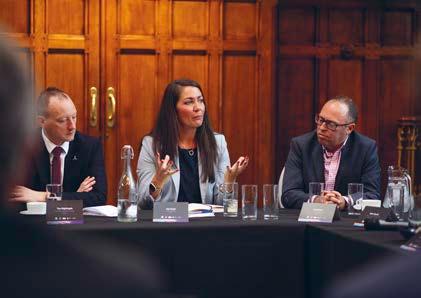
She said: “We know young people react best to other young people, so having young engineers, from diverse backgrounds, going into schools and talking to students is something we could do.”
THE NORTH EAST HAS MANY STRONG CONSTITUENT PARTS TO PUSH FORWARD THE GREEN INDUSTRIAL REVOLUTION, BUT DO SUBREGIONAL DIVIDES THREATEN PROGRESS? DOES IT NEED TO CONVEY A MORE COHESIVE MESSAGE?
Stand on the football terraces of any North East team, and it doesn’t take long to get a handle on the rivalry towards clubs elsewhere in the region.
It may seem a rather extreme example, but it has felt, for a good while, that the North East itself has been somewhat fractured.
That was certainly the feeling of roundtable members, who said to truly compete - and succeed - against competitors and secure fresh investment and jobs, the region must come together with a united voice.
The situation was laid bare by Mike, who spoke of conversations businesses had previously held with Lord Grimstone, the ex-minister for investment at the Department for International Trade, and the Department
76
Chi Onwurah
MP
“The lack of transport links to certain areas of the UK is definitely slowing down the opportunities and the growth of the North East.
“It was tragic to see the cancellation of plans to bring HS2 to the region, and sorting out links to Scotland would be a great idea. We also need a rail link that works to the Midlands”
Professor James Widmer
“We need to push much more diversity. Having that connection between industry and education is critically important - you can’t be what you can’t see”
for Business, Energy and Industrial Strategy.
He said: “We held a North East Battery Alliance dinner, where three people said they’d been speaking to Lord Grimstone.
“He said to each of them separately that one of the problems with the North East is that ‘we keep seeing lots of different people with lots of different messages’.
“What we need is a coherent, consistent message.”
Prof Widmer agreed.
He said: “There is a unity problem - the south of the region is competing with the north, which is competing with the middle.
“At the moment, we don’t look like a cohesive region to the outside.
“We need to get together, devise a strategy and get on with it.”
Alex concurred, saying the time has come to bring the commercial community closer.
She said: “If all of us around the table started talking in the same language, and started using the same statistics, that would be very powerful.
“If we could bring all the educators together in one room, build the vision and make them feel the empowerment, that would be a big step towards building a collaborative ecosystem.
“By bringing businesses of all sizes together, you share the same outlook, and it is the next step in making change happen.”
Alex found support from Richard, who said, “it is important to present things in a coherent way, so people can understand what they can invest in."
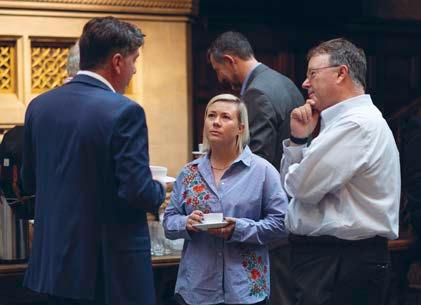
Dominic too urged clarity, saying, “we need to sharpen our story to be really distinctive, if we want London and the City to engage.”
And Alex was backed by Neil, who said, the creation of a single narrative would provide much potential, not least in showcasing the North East’s prowess that would, in turn, present openings to secure work presently taking place abroad.
He added: “The opportunity to create manufacturing in the UK, and the North East, is massive.
“The model of making things in China and shipping things around the world, is going to change.
“The opportunity is right now; Made In Britain is a strong badge.”
LOOKING ACROSS THE NEXT DECADE TO 2031, WHAT DOES THE NORTH EAST NEED TO DO TO LEAD THE GREEN INDUSTRIAL REVOLUTION? AND HOW WILL SUCCESS BE MARKED?
“It’s about looking at co-ordinating where the innovation is coming from, aligning it with the direction of market travel and the infrastructure needed to deliver it,” said Dr Tim Hammond, director of commercialisation and economic development at Durham University, and Northern Accelerator lead.
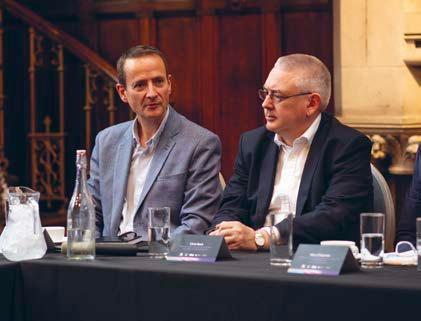
He added: “It’s great to have ideas, but we need the means to take them forward.
“How we’re taking innovation forward is very important - whether it is transport, energy, insulation or decarbonising construction - it is one big picture.”
Prof Widmer said spades in the ground would signify progress.
He said: “We need some successes; and we need to grow our own.”
Chris added: “We need to talk ourselves up.
“And on top of that, there are three areas we must focus on - skills, opportunity and pride.
“You’ve got to have the skills to do the job, you’ve got to have the opportunities for residents to earn a good living, and you’ve got to have pride in the place you live.
“If we get those things right, we’ve delivered.
“Clean growth fits us beautifully with our offshore, engineering and manufacturing past.
“We are at the cusp of the wave.”
77
Tom Nightingale
“The region’s five universities have worked really closely together over recent years. We don’t compete; we work collaboratively and complement each other”
Dr Tim Hammond
“New funds are coming to the region, people are listening more, and we are starting to break through in terms of the clean energy and offshore wind message”
Paul Wigham
Styled Interior Design: Revamping the Riverside
When bosses at Middlesbrough Football Club decided they needed a new look for their tired hospitality suite, they turned to Styled, the Saltburn-based interior design company that’s making waves across the region. Here, Styled head of interior design Bethany Walker talks North East Times Magazine through the process, revealing how the firm created a very modern space in a traditional home of football.

www.styledinteriordesign.co.uk
Instagram: @styleduk
When Bethany and the Styled team first entered the Riverside Stadium’s hospitality suite, one of the first things they noticed was how dark, dated and heavily branded it was.
Not such a problem on matchdays, perhaps, but at odds with the club’s desire to reach a wider audience.
Bethany [pictured, on opposite page] says: “The ultimate aim of the project was to create an appealing and multi-purpose space for all to enjoy, and encourage private events, such as wedding receptions and baby showers, as well as the usual matchday hospitality.
“That’s where we came in, to offer our eye for
design and expertise to bring the project to life.”
As well as the Middlesbrough Football Club (MFC) branding, the original room was, says Bethany, “quite dark, had not been updated for several years and had little design consideration.”
A major job, then, made even more pressurised by a tight timescale of less than eight weeks from the initial meeting with the client to the finished product.
A vision for all
MFC’s goal was ultimately to increase revenue by being able to use the suite for more than just matchday hospitality, making flexibility a
78
Design_ Advertising feature_Styled
key consideration.
The existing layout of the suite was very crowded, so the team set to work creating a space that had enough breathing room for guests, with luxury touches to appeal to the Insta generation.
Furniture was all made to spec by local suppliers and subcontractors, in order to maximise the available space and allowing for more creative freedom.
The previous layout was replaced with a variety of small and larger tables to make the most of each corner of the room, along with booth seating to the window area, creating a more usable and flexible space.
Meanwhile, the bar area was ripped up and started again; a new bar was commissioned, featuring custom-built brass shelving for drinks and glassware with a bronze mirrored wall, marble worktops and a cladded front, with pendant lighting above the bar ceiling area finishing the look – again, appealing to the aesthetic sensibilities of a younger generation.
“However, as the space is still heavily and primarily used for match days, we wanted to keep a nod to the club’s branding in a more subtle way,” says Bethany, revealing this was achieved by adding soft red accents throughout the backrests in the chairs, doors and custom cabinetry for the serving area.
A tight turnaround
“This project had an incredibly tight deadline, so the pressure was on to complete it in time,” says Bethany.

“To do this, our team worked with local companies and subcontractors for the works, including everything from decorating, bespoke joinery, the new bar area and the furniture.
“As part of The SDDE Smith Group, a huge part of Styled’s business is helping to create better places to work, live and stay, which is why choosing local companies for this project was a fantastic way to reflect this – and they all did us proud.”
For more informa tion on how the Styled team can transform your commercial space, get in touch on 01287 348311 or visit www.styledinteri ordesign.co.uk


A question of colour
The Styled team started from the ground up –literally.
“Our starting point was to replace the floor; getting rid of the dark carpet and replacing it with much more durable, herringbone effect luxury vinyl tiles throughout the main suite and accompanying boxes,” says Bethany.
She adds: “As our goal was to create a space that is adaptable to a range of different events, we opted for a lighter colour palette consisting of soft blues, greenery and accents of terracotta, which would be carried through into the furniture, wall murals and custom cabinetry.
A new era
The result was the Styled Suite, a modern, versatile space with a warm and vibrant atmosphere, suitable for everything from baby showers and wedding receptions to its original use – matchday hospitality.
“It is a great feeling to have not only our designs showcased in the club, but to also have the suite renamed after us,” says Bethany.
“Having our work showcased in such a popular venue in the local area will be a huge boost for us.
“There are so many businesses who partner with the club and attend events there, so it is great brand awareness for Styled.”
79
Styled
Design_ Advertising feature_Styled
Charity event raises more than £50,000 for disadvantaged North East children
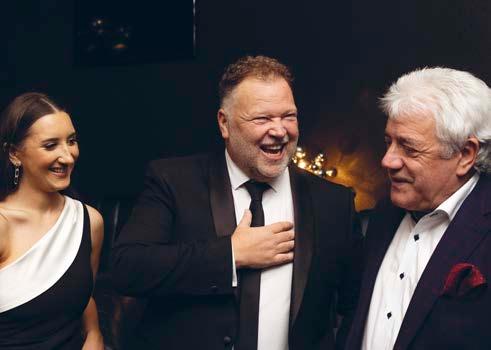
A charity supporting disadvantaged children escaping domestic abuse in the North East has received a huge boost thanks to a fundraising event held at Sunderland’s Stadium of Light on October 20.

MORE THAN £50,000 WAS RAISED FOR KIDSOUT –a volunteer-led charity which aims to bring fun and happiness into the lives of disadvantaged children.
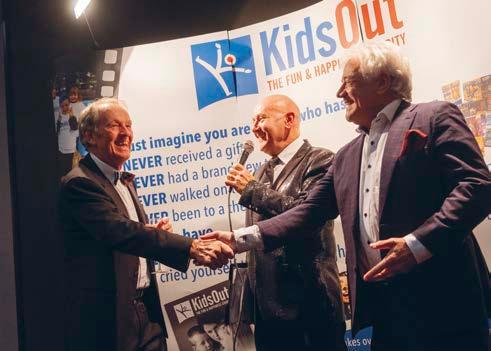

It was the first time the event had been held in the North East, and included a special guest appearance from former
Newcastle United player and manager Kevin Keegan. The event was organised by a committee from various organisations including law firm Ward Hadaway, housebuilder Gleeson Homes, development land agents Wisemove, development consultants Pegasus Planning and Durham County Cricket Club.
80 Event_ KidsOut
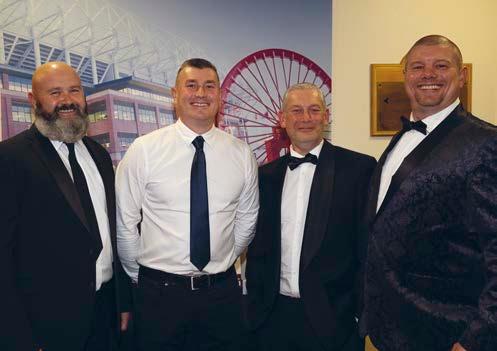
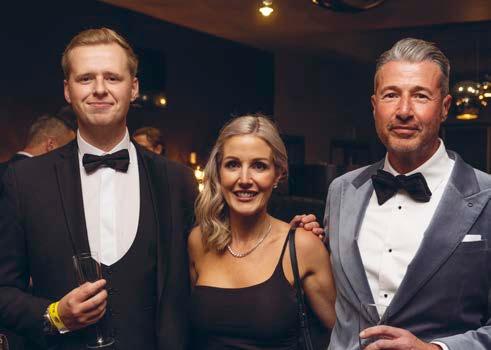
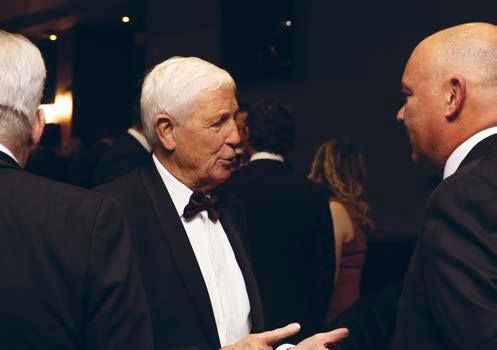
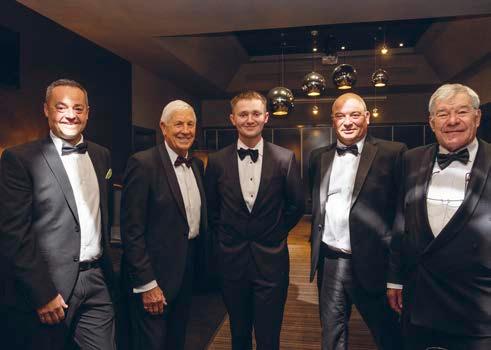



81 Event_ KidsOut
HELPING TO DECARBONISE BRITAIN
With an expert internal capacity to deliver complex building performance modelling, Wilson Gray Consulting would welcome a discussion about your intricate net-zero aspirations. Having worked on major built environment projects nationwide, we possess the necessary expertise and experience to guide you through the design requirements associated with the important recent changes to building regulations. www.wilsongrayconsulting.com

We would be delighted to talk to you, or your team, about the ways we support planning applications.
We work very closely with developers and planning consultants on all the mechanical, electrical and public health (MEPH) aspects of planning applications for landmark projects throughout the UK.

Contact Lewis Clark to find out more: lewis@wilsongrayconsulting.com

Goals for the future
Darren Eales

www.nufc.co.uk @NUFC
There’s real momentum building at St James’ Park. With Newcastle United’s new regime having recently celebrated its first anniversary, and the team performing on the pitch, confidence and a sense of enjoyment has returned to the stadium, replacing the dark days of the Mike Ashley era. Here, national football journalist Ian Murtagh, who has covered the Magpies for almost 30 years, sits down with the club's new chief executive Darren Eales to discuss his vision, business plan and methods to deliver success for the club’s loyal fanbase.
Words by Ian Murtagh
Darren Eales wants to tell you a story.
Once upon a time, there was a sleeping giant that was awoken from its long slumber, and after being revived, nourished and cared for, became a mighty force across the world.
Newcastle United’s newly-appointed chief executive is a master strategist, who describes himself as the club’s facilitator in its mission to become a sporting superpower.
But it’s when he talks the language of football fans that the 50-year-old’s eyes light up and you understand why the owners headhunted the former chief executive of US Major League Soccer club Atlanta United.
When he rules out the possibility of the Magpies’ moving away from St James’ Park, he doesn’t reel off a list of financial figures, instead factoring in the Geordie social scene.
“Where the stadium is located, there are 108 pubs within half a mile,” says Darren.
“The next best is Wolves with 34 – and only one for away fans.
“Here, it’s party city. Everyone has a
great time.
“We’re in a great place, with 52,000 packed in every week.
“That’s part of the magic of Newcastle United.”
With more than £200 million invested in the first team squad, the Benton training ground having been given an expensive makeover and the women’s team now very much playing a key role in the club’s future, Darren has an enviable set of tools at his disposal.
But financial fair play means Newcastle aren’t able to replicate what Chelsea and Manchester City have done, and splash the cash so they can compete with the elite immediately.
That’s why Darren must box clever.
Being the wealthiest club on the planet is one thing, possessing a magic wand, quite another.
He says: “We haven’t got a blank piece of paper where we can just spend what we want.
“There are regulations in place where we have to get from A to B in a smart way.
“It would be easy to think, ‘crumbs, this
85
is difficult to solve’, but part of my role is to be a facilitator.
“Yes, we’ve got a vision and a strategy, but there are constraints too, so it’s always evolving.”
And if financial fair play acts as a brake, momentum and ambition keep pushing the accelerator.
He says: “This is an exciting storyline.
“I had a great time in Atlanta; to build a club from scratch, you don’t get that in English football.
“So to have it with a club like Newcastle, with the history, heritage and potential, is fantastic.
“People have been saying for years it’s a sleeping giant.
“Having this opportunity with an ownership that’s engaged and well resourced, that can put in a strategy to take the club forward, is a huge honour and responsibility.”
The source of Newcastle’s vast wealth, though, is an issue which divides opinion.
While supporters have widely welcomed the Saudi-backed ownership,
separating football from geo-politics, the club’s critics claim the Magpies have become pawns in an unseemly sportswashing project launched by a country with an appalling human rights record.
Head coach Eddie Howe and sporting director Dan Ashworth have both argued that once the takeover bid last October passed the Premier League’s owners’ and directors’ test, they had no issues.
Darren chooses to dead-bat questions on the Saudi’s 80 per cent stake in the club, other than to explain how the kingdom’s Public Investment Fund (PIF) and its worldwide contacts can only benefit Newcastle moving forward.

He says: “From my perspective, I am obviously going to be out there in discussions with companies.
“I think the important thing for me is to speak about the club, what we stand for and the exciting journey we’re on.
“We tick a lot of boxes in terms of what companies and brands are looking for in the Premier League.
“It is the journey of a club that can really create something special.
“Like everything, when you are talking to brands, everybody has different priorities but from my perspective, from what I have seen already, there is a heck of a lot of interest, not just in the brand, but the storyline too.
“I think that’s the bit that has really overwhelmed me.
“I knew in a way this was a crazy city for the fans, but we went to the ECA (The European Club Association), where you’re talking in the world of global football, and people were really excited about what Newcastle can become.
“That gives me great encouragement; we can really deliver on our ambitions.”
Revenue streams, which under the Mike Ashley era became a trickle, will be flooding through very soon.
Darren says: “Everyone understands that at a fundamental level, we need to bring increased commercial revenues to give Eddie and Dan what they need to put the best team out on the pitch.
86
“In the year since the takeover, you have seen all the changes there have been under the new owners in terms of infrastructure, so we have already laid the bedrock for what we need to do in terms of delivering on commercial.
“We have a long way to go.
“But we have something here that is going to be attractive to commercial sponsors because it’s a one club city and a club that hasn’t won a trophy since 1969, and a domestic one since 1955, yet the fans still turn out in numbers and that is unique.
“Part of the attraction for commercial brands is coming on our journey and saying they were on board at the start and then became part of our continued success.”
Darren doesn’t rule out St James’ Park’s naming rights being handed over to a Saudi company or Saudi advertising emblazoned on shirts, shorts and billboards.
He adds: “It would make sense in terms of some of the doors that could be opened by the PIF.
“They invest in a number of countries globally, and I think, when you look at a country like Saudi Arabia with a young population - 35 million and growing - with football the number one sport, then there is some natural affinity in terms of having the commercial value of an association with Newcastle.
“For us, we are looking globally.
“The reality is the Premier League is the best in the world with incredible reach, which is a great advantage when you’re talking to brands.
“When you layer on top of that the exciting journey we’re on with Newcastle, it really does give us some great opportunities.
“But we’re going a little bit from a low bar.
“It’s going to be incremental, not just a case of flicking a switch.”
Mike Ashley infamously renamed Newcastle’s home the Sports Direct Arena, much to the fury of the fanbase.
If naming rights are sold, Darren says it will only be after consultation with paying customers.
He says: “There is sometimes a danger if you’re just chasing revenue.
“If you do that, it can slip through your hands.
“One of my big learnings from my time in the States was building a club from the ground.
“We wanted to be competitive on the pitch, have the best fan engagement and wanted to be out in the community.
“It sounds simple, but every decision we made was with those three rules.
“Our aim wasn’t about getting the
biggest crowds in the MLS, it was about pursuing our goals through that lens and creating a club averaging 50,000 fans with incredible commercial revenues.
“If we’re up front and engaged with our fans, the revenue follows.
“All our decisions have to be strategic, but we have to bring supporters with us.”
It didn’t take Darren long to realise Newcastle United is the heartbeat of the city, and its success - or otherwise – invariably influences the mood of its citizens.


And he believes club and community feed off each other.
He adds: “It’s about what we can do for the region.
“There are so many opportunities here to make a real difference, for me as leader of the club, and the employees.
“That’s why we come to work; it’s that passion for the club.
“That’s what energises us, and I think that’s what makes a difference.
“You wake up and it’s a privilege and a great honour.
“Our job is to deliver on this opportunity we’ve got.
“Our vision is a stable, top-six club competing for trophies consistently, and we want to be quick getting there - but it has to be sustainable.”
87
www.nufc.co.uk @NUFC


88
Planning for the future
National whole of market financial planning and wealth management firm Perspective Financial Group has set the scene for further success after welcoming a record intake of trainees. Here, Dan Stokoe, head of the Perspective Academy, highlights the company’s commitment to the next generation.
www.pfgl.co.uk @perspectivefgl
THE SAYING GOES THAT TO STAND STILL IN business is to fall behind, that those who succeed are the ones who see the future in the present day.
Perspective Financial Group is one of those organisations.
The firm has just welcomed a record intake of more than a dozen staff members to its Perspective Academy, new faces ready to write a fresh chapter in an everincreasing success story.
Launched in 2014, the training hub provides support for school and university leavers, as well as those seeking a career change, delivering valuable employment and economic opportunities while strengthening Perspective’s industry-leading expertise and support.
Its latest cohort includes a number of graduates from Northumbria, Manchester and Lancaster universities, an ex-professional footballer and those who have switched careers.
They are now embarking on a two-year tutoring programme at training sites in Newcastle and Chorley, in Lancashire, as well as offices across the UK, to gain insight and understanding of the financial services sector.
During their time in the Academy, the trainees will work closely with members of the company’s experienced and highly-qualified team, to equip them with the technical and soft skills required for a long and satisfying career within the industry.
Dan Stokoe, head of Perspective Academy, said: “We created the Academy in 2014 to grow our next generation of financial planners and paraplanners, so
Perspective Financial Group
Operating from more than 20 offices across the UK, including bases in Newcastle and Darlington, Perspective’s local offices provide financial planning advice on matters including retirement, laterlife and long-term care planning, inheritance tax, investments and protection and corporate planning.
If you would like to speak to a member of the Perspective team to better plan your finances, call 0191 217 3340 or 01325 289400.
they share our client-centric and ethical approach, which is firmly embedded within our business.
“Investing in employees’ development, to assist them in reaching their full potential while creating a robust succession plan, is very important to both our business and our clients.
“Our clients are accustomed to our industry-leading expertise and trusted advice, and there is no better way to provide this in the future than cultivating talent through our Academy, where they will be trained to the highest standards.”
Trevor Clark, director at Perspective (North East) Ltd, second left, with, from left to right, Academy trainees Jonathan Lyons, Sean Berry and Owen Brown
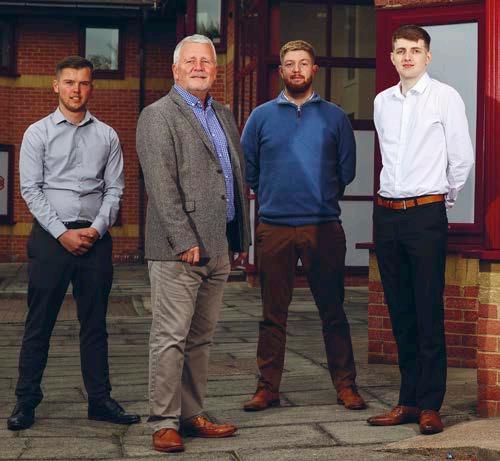
89
Finance_ Advertising feature_Perspective Financial Group
The only way is ethics…
John Devitt, chief executive of leading occupational health expert Recovery4Life, reflects on the recently-held World Mental Health Day, assessing its importance and the vital link between ethical behaviour and employee wellbeing in the workplace.
www.recovery4life.co.uk @Recovery4LifeNE
WE LIVE IN UNSTABLE TIMES.
The global pandemic, Russia’s Ukrainian invasion and major domestic political uncertainty and economic strife have all combined to make life tougher for the vast majority.
And, for many of us, it has had a profound effect on our mental health.
foundation of workplace health and wellbeing.
Yet, there is much work to be done, as research in the US demonstrates.
According to the 2018 Global Business Ethics Survey, less than one in four US workers thought their company had a ‘well-implemented’ ethics programme. *
Recovery4Life
If you are an individual or business that would like to find out more about Recovery4Life’s expert support around ethical behaviour and employee wellbeing, or wish to learn more about its other support services, which include occupational health services, testing and mental health and addiction support, call 03333 448 288 or email john.devitt@ recovery4life. co.uk
Reference: *University of Redlands business and society blog
The World Health Organisation recognises World Mental Health Day every year, with 2022’s edition urging all to ‘make mental health and wellbeing for all a global priority'.
Mental health problems exist in our lives, families, workplaces and communities, impacting happiness and causing uncertainty and insecurity.
Yet, despite these challenges, there is much that can be done to make work life, in particular, an enjoyable and fulfilling experience.
Let’s face it, we spend a massive proportion of our time working, so it’s good to enjoy it.
A proven way to make work life better is for companies to behave in an ethical and responsible manner.
Over the years, we have seen some terrible examples of unethical behaviour, which has caused untold misery and, ultimately, business failure.
The collapse of US commodities and energy services business Enron in the 2000s is a classic example.
Some 20,000 people were employed by the business, with its revenue reaching $100 billion before its collapse.
It was found to be institutionally fraudulent, with a ruthless and dishonest culture.
Imagine the mental health impact of such an unethical culture on its staff.
Ethics and culture go hand-in-hand; they are the

Almost every company now has a business ethics programme.
In part, that’s because technology and digital communication have made it easier to identify and publicise ethical mis-steps.
To avoid the negative implications, companies are devoting more resources to business ethics.
In one survey of accountants, for example, 55 per cent said they believed the importance of business ethics would continue to grow over the next three years.
In addition to establishing formal programmes, companies are creating ethical workplaces by hiring the right talent.
High integrity and honesty is the second-most important skill for business leaders, according to another recent survey.
Today’s professionals must understand the link between business ethics and business success.
Referring again to the 2018 Global Business Ethics Survey, employees are more likely to apply ethical reasoning when their company clearly demonstrates why business ethics is important, with 99 per cent of US employees who had experienced a strong ethics culture saying they would be prepared to handle ethical issues.
Companies that advocate for business ethics motivate their employees to perform their roles with integrity.
90
Health_ Advertising feature_Recovery4Life
The ‘great resignation’ and the global skills shortage mean this is no-longer a ‘tick-box’ item to keep shareholders happy, but an essential tool for attracting and retaining talent.
The first step in building this kind of ethical culture is to create an ethics programme.
According to the US Department of Commerce, a complete ethics programme should touch on all business functions, including operations, human resources, marketing and, most importantly, how a company looks after the health and wellbeing of its people.
The global research company Gartner advises companies to integrate their ethics programme with business operations, saying it can maximise a programme’s impact by making ethical processes part of employees’ workflow.
But it has to go further than this.
Here at Recovery4Life, we often see people whose mental and physical health has been affected by unethical workplace culture and practice.
Quite often, this is not intentional but a reflection of business pressures clouding values and purpose.
The impact, nevertheless, can be stark.
The types of bad behaviour are multivarious – from setting unreasonable targets, to ignoring welfare issues and bullying.
However, without clearly stated visions and values, which are culturally embedded, the potential toll on mental and physical health will always be a concern in any business – and talent will vote with its feet.
Here at Recovery4Life, we look at four key areas when advising clients on their health and wellbeing strategies and programmes – vision, mission, culture and climate.
These four key areas, and the operating principles which underpin them (our ‘pillars’), will be different in each company, taking into account their unique cultures and the sectors in which they operate.
But the combination of the four principles and how ‘real’ they are in operational terms will dictate how a company manages risk and supports its people.
Using such clear guidelines allows us to do the very best for our clients and our people.
If we look at where problems emerge in any business, and its impact on the health and wellbeing of employees, you will see a disconnect between what a company says it believes/does and the reality.
For us, ethics is not a county in the south of England and a reality TV show, but the guiding principle which allows us to build trust with all our stakeholders.
Our vision, mission culture and climate
Vision: To transform the health and wellbeing of the workplace and the lives of the people who work there
Mission: Managing risk, supporting your people
Our culture:
Open
Our climate:
These areas are then underpinned by six key pillars for our business, which are:
Relationships based on trust
all that we do
complex
training
91
•
• Flexible and friendly • Supportive and empathetic • Positive • Constructive challenge • We go the extra mile
• Focused • Supportive • Driven • Engaged • Fearless • Passionate
• Ethics •
• Clinical excellence in
• Solution focused – however
• Continuous improvement through
and supervision • Integrated governance Health_ Advertising feature_Recovery4Life
Celebrating 20 years of charitable giving
Charities across the region have joined leading independent law firm for business Muckle LLP to celebrate the 20th anniversary of its Community Fund, which has helped hundreds of charities, community groups and not-for-profit organisations across Tyne and Wear, Teesside, Northumberland and Cumbria.
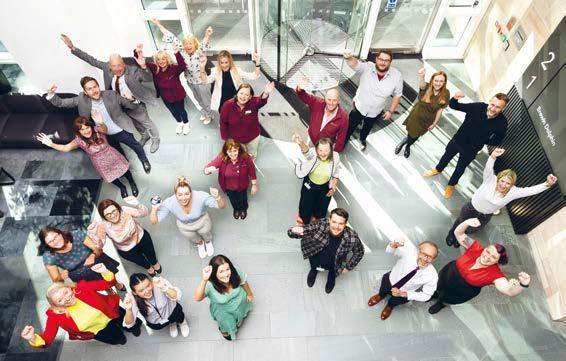
www.muckle-llp.com @MuckleLLP
ESTABLISHED IN 2002, THE MUCKLE COMMUNITY Fund at the Community Foundation Tyne & Wear and Northumberland, has awarded £603,370 in 662 grants to charities and organisations across the North of England.
As well as donating one per cent of its annual profits to the fund, Muckle also gives up to £140,000 worth of free legal advice to charities and community organisations annually.
Senior partner Hugh Welch is a driving force behind the firm's philanthropic efforts and a trustee for several North East charities.
He says: "We are delighted to achieve this milestone in the same year as winning the Heart of the Community Tyneside and Northumberland Award.
“Through the Community Fund, we have built lasting relationships with local charities making a huge difference.
“We look forward to the next 20 years of working together to improve the region for everyone."
Since the fund’s creation, the Community Foundation has used its local knowledge and expertise to match Muckle’s giving with important community causes.
Some of those local charities joined Muckle to celebrate the 20-year milestone and share stories of how they have benefited from the fund.
Success4All received around £9000 for projects including the conversion of a double-decker bus into a digital learning hub, which helps disadvantaged people gain skills and qualifications.
Caroline Afolabi-Deleu, founding director, says: “Working with Muckle gives us important access to their contacts and wider relationships, which helps us network and fundraise further."
Over the years, Muckle has helped Oasis Community Housing with grants, fundraising and volunteering, and has won the charity's silver, gold and platinum Shared Value Awards in the last three years.
Hazel Ditchburn, corporate relationships manager, says: "Muckle is deeply passionate about making a positive impact on our communities, and our relationship
Muckle LLP
For more information about the Muckle Community Fund, and to apply for a grant, visit www.muckle-llp. com/about-us/ environmentalsocialgovernance/
goes beyond the typical corporate/charity partnership.”
Muckle has also offered grant funding, legal support and networking to The Recruitment Junction, a recruitment agency connecting ex-offenders with employers. Beverley Brooks, founder and director, says: "Muckle is a force for transformation and genuine good in our region."
The Country Trust is among the local charities benefiting from Muckle staff volunteering, which has seen members of the agriculture, estates and rural property team use their extensive network to support the educational experience.
Sue Thompson, senior fundraiser, says: “We're so grateful to the Muckle volunteers for taking the time to get involved and spread the word."
Looking to the future
Hugh adds: "We recently launched our five-year plan to move from a corporate social responsibility (CSR) model, to a more sustainable and accountable environmental, social and governance (ESG) framework, and we are aiming to achieve B-Corp status too.
"We are putting our values right at the heart of what we do."
92
Law_ Advertising feature_Muckle LLP

Five minutes with…
Claire Goodliff and Deb De Luen
In the first of a new series, Colin Young speaks to Amazing Jane co-founders Claire Goodliff and Deb De Luen, to learn more about their Sunderland-based activewear business Amazing Jane. Charting its growth from chance service station meeting to popular market brand, it highlights the company’s recent rollout of TrackHer leggings, which aims to ensure women’s safety and independence while exercising outdoors.
4Claire and Deb, you’ve invented leggings with a hidden pocket for GPS trackers aimed at helping protect women when they are exercising and walking. Before we get on to your new product, though, can you tell us how you first met…
Deb: “Randomly, we met in a petrol station, buying lunch in Bristol.
“We were both on a training day for a dance fitness brand.
“We started talking, and then both ended up working for that company.
“The rest, as they say, is history.”
4What were you both doing prior to setting up the business? And how has it developed?
Deb: “I owned a ladies-only gym in Sunderland, and Claire taught community-based fitness classes across Northumberland.
“We set up Amazing Jane in 2013, testing different products and selling leggings, but faced lots of manufacturing barriers, such as high minimum quantity orders.
“We both went away from it for a while, continuing with our other businesses until 2020, but found that towards the end of the year, we both still had the passion to do what we originally set out to do.
Claire: “We knew our vision; we knew the exact type of products we wanted to create.
“It took a while to find the right team, and now we have a fantastic supply chain and design team, which help take our ideas and turn them into reality.
“Every day is still a rollercoaster, but we’re seeing good progress with the brand.
“We’ve got some fantastic opportunities for 2023, including a launch in the US and Middle East and working with some amazing charities, and our customer base is growing every day.”
4So tell us about TrackHer leggings. What have you invented, and what is the technology behind it?
Claire: “The new innovation embodies our ethos, to empower women to lead healthy, active lifestyles through the power of clothing.
“Every item we create is designed to build confidence in women.
“We mainly design our clothes to make women feel great about themselves, but we also address other barriers to women being more active.
“One of the topics we talk about daily is women’s safety, which is even more poignant given recent headlines.
Deb: “We developed a small hidden pouch within the leggings, just the size to hide a personal tracker, with the intention of women being able to keep their loved ones updated of their location.
“And in any event they are in trouble, it means their location can
94
topics such as violence against women.
“The reality is, though, that our safety is at risk in too many situations.
Deb: “Runners World states 46 per cent of female runners in the UK say they have been harassed while running, and data from End Violence Against Women found that one in two felt unsafe walking alone after dark in a quiet street near their home, compared to one in seven men.
Claire: “And End Violence Against Women also highlighted that two out of three women aged 16 to 34 experienced one form of harassment in the previous 12 months; with 44 per cent of women aged 16 to 34 having experienced catcalls, whistles, unwanted sexual comments or jokes, and 29 per cent having felt like they were being followed.
“The recent news coverage of attacks against women has sparked the conversation again about outdoor exercise and their safety.
“We are passionate about using the power of clothing to encourage women to get into the right mindset for being active.


be determined much faster.
“We believe most attackers would only really think to dispose of a phone or a keyring, etc, and not look for a concealed pocket.
“The TrackHer pocket is unknown, until you receive your leggings, with a card explaining the location.
Claire: “This isn’t even just from a violence against women perspective, there are lots of women who exercise alone, and in the event they injured themselves, they would also be more easily located.”
4What was the motivation behind Amazing Jane? Was it brought on by personal experiences or the recent events in the news and a determination to make our streets safer for women?
Claire: “The Amazing Jane brand has been around for eight years, but our passion to build confidence in women has been around for decades.
“Dressing in a certain way has been
scientifically proven to have a positive impact on emotional wellbeing.
“We work with the science of enclothed cognition, focusing on empowering and supporting women through clothing and its deeper psychology of making women feel good and confident about their bodies.
Deb: “We use the science and our combined years of experience of working with women to create each individual design from scratch, to ensure a great fit for all our body types and our everchanging bodies as women.
“The recent discussions, and acts of violence against women out alone, made us want to try and help make women feel safe.
4Isn’t it a sad reflection on society that it is necessary for these types of products? What would you like to be done to make outdoor exercise even safer for women? Claire: “We really wish we didn’t need products like this, or even have ideas on

“The reality is many feel afraid when exercising alone and have a restricted sense of freedom, which is escalated with the changing seasons and the darker nights and mornings.
Deb: “As autumn hits, it’s a fact that many women have changed their outdoor training patterns to accommodate the dark mornings and nights.
“The changing seasons really do bring a heightened level of vulnerability to women.
“To make outdoor exercise safer for women, we feel others need to understand what role they play.
“From better lighting in dark spaces to men understanding the barriers we face due to their actions, it really is a wider discussion that needs to take place.”
95
www.amazingjane.com Facebook: Amazing Jane Activewear
Business Durham
To find out more about Business Durham, and how it is working to ensure organisations have the skills they need - both for now and in the future - visit www. businessdurham. co.uk
Collaboration is key for the skills of tomorrow
With the number of businesses in County Durham growing consistently over the past 12 years, the future looks bright. But recent times have shown that companies need to be dynamic and adapt to ever-changing circumstances – ranging from a global pandemic to Brexit, supply chain issues and the ongoing energy crisis. Keeping up with these challenges - and the skills needed to adapt to them - is difficult. But by collaborating with key partners across County Durham, Business Durham is giving local companies the ability to evolve and be flexible when it comes to skills, recruitment and retention.
www.businessdurham.co.uk @_BusinessDurham
HAZEL SYKES ACTS AS SKILLS LEAD IN HER business engagement and account manager role at Business Durham.
She is always looking for opportunities to connect businesses with universities, colleges, technology organisations and other education and training providers to enhance skills provision across County Durham.
Hazel [pictured, right] says: “The skills needed for today’s modern world are ever-changing, and businesses need to evolve quickly to adapt to, and incorporate, new technologies and working methods into their operations.
“It’s said that 85 per cent of the jobs of tomorrow may not yet exist.
“When you take that into account – and add to that the cost of training to learn and implement something new – it’s difficult for businesses to pre-empt their own skills needs.
“The challenge here is identifying – and quantifying – those needs, both now and up to five years in the future.
“It’s a case of being proactive rather than reactive, planning for the future so that these changes aren’t coming as a surprise.
“That’s where we can help.
“We work with businesses and education providers to ensure the next generation gets the training they
need and is prepared to meet the emerging needs of tomorrow’s workforce.
“We can also provide data and insight from the wider marketplace and within growing sectors –creating a holistic, industry-led approach in which County Durham colleges, schools and universities are proactively meeting the skills needs identified within the local economy.”
Business Durham, with partners CPI and Durham University, secured the Community Renewal Fund (CRF) to deliver various projects.
The Business Durham team is using part of that fund to look at the skills landscape for emerging industries, including space, advanced manufacturing, materials and electronics, telecoms, digital and analytics (including data science and cybersecurity), as well as life sciences and healthcare.
This project aims to identify the skills needs for these sectors, and if there is any crossover in the qualifications or skillsets required.
By working closely with local businesses, Business Durham can identify the skills and qualifications they are looking for, identify the gaps and help to fill them, whether it’s connecting employers with local education or training providers to deliver a specific qualification, or help them engage with students at events and careers fairs.
Hazel’s predecessor Karen McParlin set the
96
Business_ Advertising feature_Business Durham
foundation for collaboration between businesses, training companies and education providers, playing an integral role in working with the Institute of Technology (IoT).
Consisting of further and higher education providers in the North East with research partners and industry leads, IoT aims to create a step change in higher-level technical education.
The IoT is employer-led, listening to the needs of the industry and meeting them with the necessary skills and qualifications.
Working collaboratively across further education, higher education and employer partnerships, the North East IoT has two main focus areas - construction and the built environment, and advanced manufacturing and engineering.
Each sector has a lead industry partner; the lead college in the North East is New College Durham, which has a large facility dedicated to IoT.
As IoTs are employer-led, they can react quickly to a particular area’s current and evolving technical skills needs.
They provide the skilled workforce employers need now and in the future, which is crucial to local, regional and national productivity growth.
In addition, IoTs can facilitate rewarding and higherpaid careers for local people, encouraging them to remain in the county.
The business engagement team also works closely with other education providers outside of IoT to maximise student engagement touchpoints across Durham – which is helpful for all businesses, from SMEs to larger blue-chip organisations where opportunities may not be visible to students.
This activity includes mapping out a calendar of
activities with local universities and incorporating events such as STEM week at Durham University, where businesses can attend and engage with potential recruits.
Karen adds: “We have some brilliant workplaces on our doorstep, offering exciting careers with innovative companies.
“By working together, Business Durham is committed to planning for the future and ensuring businesses across County Durham continue to expand, recruit, grow their footprint and invest.”
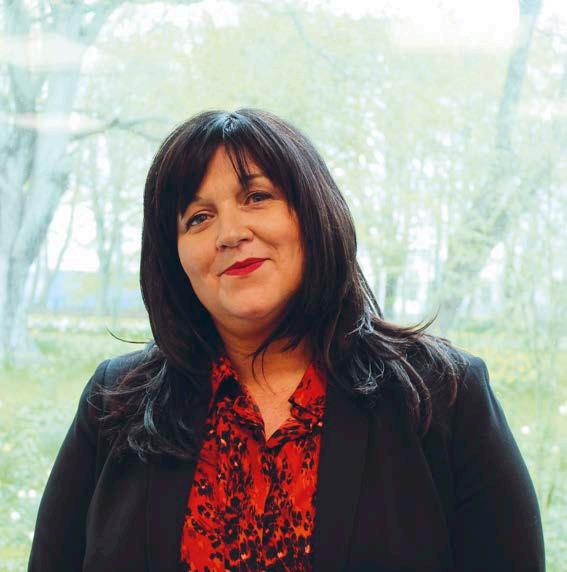
97
Business_ Advertising feature_Business Durham
Workplace Wellness
with The Spa at Ramside






99 12 month Corporate Spa Membership from £159 per person* (minimum of four people) * Names can be changed on a monthly basis to coincide with employee of the month schemes Your spa membership offers you unlimited and unrestricted access to: • 25-metre swimming pool • Thermal experience suites • Hydrotherapy pools • Outdoor spa garden • Exercise classes • Fitness suite To find out more, email membership@ramsidespa.co.uk or call 0191 375 3088 Reward your employees with a corporate gift voucher Scan our QR code, email membership@ramsidespa.co.uk or call 0191 3753088
OUTSIDE

100 THINKING
THE BOX

101 FEATURE
JAMES CRAGGS & TAUTVYDAS BARANAUSKAS
The film industry is alive and kicking in the North East. And young, ambitious companies like Motif are thriving in the sector and helping put the region on the map. From their small, but expanding, base in Gateshead, James Craggs and Tautvydas Baranauskas are producing clever and innovative features which are taking the film and football worlds by storm. With final preparations underway for the World Cup in Qatar, Colin Young finds out more about the pair who are putting the game’s biggest stars on the silver screen.
4James Craggs places an emptiedout television on business partner Tautvydas Baranauskas’ head. The pair pose for the camera.
Next, the co-founders of Motif sit cross-legged in front of a beautifully restored fireplace in their first-floor office in Brighton Road Studios, hidden deep in the streets of Gateshead.
Sitting between them is an enormous pink Darth Vader head (donated by the artist downstairs).
It’s just another day at Motif.
football world, with iconic stars as their guides.
Their first pitch to FIFA, alongside Fever Media, was, James admits, ‘a ludicrous idea’, but the football Gods liked it.
www.motifpictures.co.uk
Words by Colin Young Photography by Christopher Owens
“This is what we do,” says James, as he nonchalantly carries the television into the Motif offices.
“We ask people to do this sort of stuff all the time, so we can hardly say no to anything ourselves now.”
It is fitting we are flitting around the corridors of Brighton Road for Christopher Owens’ photo shoot, which starts outside in the cobbled back streets opposite. We borrow a football from the after-school game on the pitch over the road.
After just two years in business together, James and Tautvydas - or Tauts - are moving up in the film world already - and within the confines of this building too.
But they are firmly rooted in the North East, and just one of the many start-up companies in the industry now showcasing their talents across the globe.
Two framed film posters dominate the wall behind the red, white and black fireplace; ‘HD Cutz’ and ‘Croatia: Defining a Nation’.
These two FIFA commissions have put Motif on the map, while also taking them on adventures in the
Covering the rise of Croatia, and its football team, as they reached the World Cup Finals just seven years after the end of the Balkan War, ‘Croatia: Defining a Nation’ is bulging with heart-breaking and brutally honest testimony from legends of the era; Boban, Suker, Prosinecki, Boro’s very own Boksic.
Inspired by FIFA’s desire to engage with young fans, rather than the old men in blazers still perceived to run the game, they pitched an even more outrageous idea, following the exploits of the barber of several superstars.
In the ‘HD Cutz’ series for FIFA+, we follow Sheldon Edwards - AKA HD Cutz - as he travels across the globe to cut the biggest football stars’ hair; it is a fascinating and rare insight into today’s footballers at ease.
Chasing a man with football’s hottest clippers for the early morning flights to the capitals of Europe, or chilling in his chairs in Clapham, all makes for compelling viewing.
Like the Croatia film, it has a significant guest list, including Pogba, Wan Bissaka, Rudiger, Bellingham and Hudson-Odoi.
James says: “HD Cutz is not really a football show, it’s a factual entertainment show and it needed to have pzazz to it and a really different feel because it is such a different concept.
“It is very outside the normal realms
102
of football.
“That’s what we wanted to do, and we want to ensure we do things in the North East as much as possible and use people up here, so our first choice for director of photography was a guy called Ross Marshall, from Teesside.
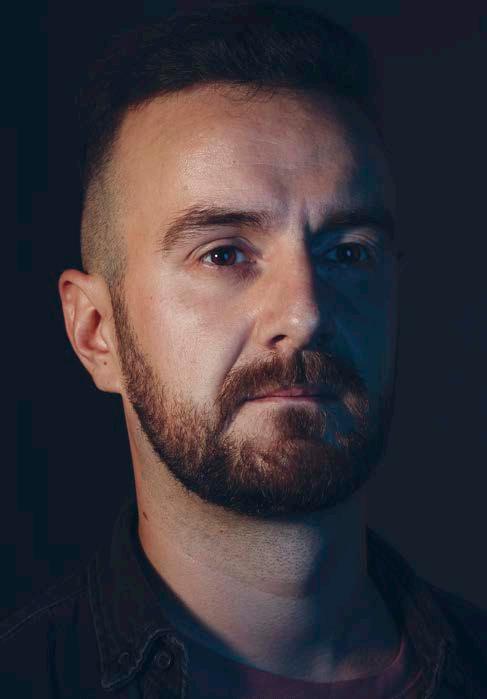
“Wherever we can, we try to keep the money up here because that’s really important to us; one of the mandates I wanted us to have was that we would always look at the North East first.
“All this work is to make us sustainable and, hopefully, genuinely become the company that provides a pathway for people up here to go on and work on high-end stuff.
“It sounds very worthy, but that’s what we want the company to be.”
James, 37, is the football fan and worked previously at
Sunderland AFC, Sky Tyne and Wear, Setanta and The Roundhouse creative agency.
Lithuanian Tauts, who joined Roundhouse in 2018, is not.
He says: “I just love what I’m doing. James has the knowledge and loves football, and he is passionate about those things.
“I like it when it comes to making stuff, and it doesn’t matter whether you love football or not.
“You are telling a story, and if you love what you are doing, you are just going to put everything into it.”
James adds: “I'm very, very fortunate to know Tauts because he's immensely talented.
“I've worked in London, worked at Sunderland, worked at Sky and with proper top-end TV production individuals, and I've never met someone who has the abilities that he has intrinsically.

103
“The way he examines things, the way he sees things, the way he will always see an option.
“If there's a problem, he will go around it, through it, over it. He always finds a way.
“I’ve never met anybody who can answer so many questions in so many different ways.
“He's an incredibly gifted editor, incredibly gifted camera operator and we get on incredibly well.
"I've ensured that I'm absolutely tethered to him.
“I was very fortunate to meet him. We hit it off straight away, and I think we both saw an opportunity to work for ourselves and do our own thing.
“And we wanted to make scripted stuff, comedy sketches, higher-end productions, and we’re driven by ideas, we’re driven by entertainment and driven by producing something that people want to watch.”
When they arrived in the Brighton Road Studios after setting up the business in August 2020, they had one laptop between them and borrowed their first camera from a friend.

But they had contacts and they had ideas. Lots of them.
And with a collective passion to create, they now had the independence to do what THEY wanted.
The ground floor ‘office’ where it all began is now an ideal editing suite and provides storage space.
Tauts has added some colour and hand-painted film posters to the walls.
It must have looked like a dark cage on that first day.
“It was just a completely empty room,” James says.
“No carpet, white walls, absolutely nothing.
“But it was important we had an office and somewhere to call work.
“Home is home for me, and the office is the office.
“I didn’t like working from home during pandemic.
"Tauts had a laptop, we put in five grand between us, we didn't want to borrow any money because you are just servicing debt before you make anything.
“It sounds stupid now, but I had faith in us, and it had reached the stage where my wife Amanda said, ‘you have to go for it’.
“I remember saying to my parents, who are terrible worriers, that the worst thing we can do is fail.”
“But we knew we wouldn’t,” adds Tauts.
“James thinks up the pitches and I usually come in when stuff is there, and he asks for some ideas.
“That’s when the fun begins for me.”
The confines of their new home were never going to suppress their creativity, and Tauts and James set about thinking outside the box while sitting in their own box in Gateshead.
It didn’t take long for them to break free.
The pair met - and hit it off instantly - when Tauts joined The Roundhouse.
They worked together with NewcastleGateshead Initiative on a ‘Creative Cities’ promotion, and were then commissioned to produce the bid film for Channel 4 hubs in the North East.
The spark was lit by a short comedy sketch on drinking culture in Newcastle - ‘We’re Gannin’ Oot Oot’ - which was nominated at the Royal Television Society Awards for North East and Borders Comedy and Entertainment.
After months of conversations on the concept of setting up their own business, they took the plunge in the first COVID-19 lockdown after Tauts had been furloughed.
“It is always a bad time to start a business - you never know what is going to happen - but I believed in what James was saying.
“It was a bit of a risk, but it just made total sense to both of us.”
Last year, ‘Things You Wish You Said In An Argument’, one of two commissions for Channel 4 along with ‘How To Make Your Boyfriend Better’, won the same Royal Television Society honour.
The first commissions for BBC Three were created in March 2021, alongside North East Comedy Hot House, and they made five original episodes of ‘Laugh Lessons’ with partner company Storymade, working with local comics and writers Joby Mageean, Raul Kohli, Amber Doig-Thorne, Will Wyn-Davies and Chess Tomlinson.
Encouraged and backed by Alison Gwynn at North East
104
FEATURE JAMES CRAGGS & TAUTVYDAS BARANAUSKAS
Screen, the work has streamed into the company.
Motif has also taken on new staff; the office where Darth Vader resides is the home for the new recruits; scripted development producer James Boughen, filmmaker Richard W. Scott, junior editor Nat Knowles and intern Greta Maksevičiūtė.
As well as their collective passion for their craft and creativity, James and Tauts share colourful backgrounds; a reflection of their desire to produce something different to their audiences.

James was born in Stroud and has lived in the North East most of his life, his parents Patricia and Peter worked as British Airways cabin staff, before running a shop in Corfu, and his Irish mother is from the ‘Fields of Athenry’; perhaps fittingly she was a club singer in Manchester, known as April St Marie.
Tauts’ story reads like a Louis de Bernieres novel.
Born in a small town in Lithuania, he lived and worked in the US, Canada, Denmark and Spain before returning to his home country, where he worked as a marketing manager in a dental clinic.
He soon escaped to work in a hotel in the Scottish Highlands, where he first started filming, before taking a lifechanging role at The Metropolitan, in Glasgow.
“That's where I got my first gig,” he recalls.
“The bar manager saw a few of my videos, and said, ‘I like what you're doing, is there something you could do for us?’
and I made six cocktail videos for them.
“I didn't know how to do a promo video, so I watched some cocktail videos online and I’d do a 12-hour shift, then film for an hour, go back home, start editing and so on.
“I just loved it.
“I thought, ‘this is it - I have to quit being a waiter and this is my springboard’.”
Unable to find permanent work in Glasgow, Tauts moved to Newcastle to live with his father Virginijus - although mum Virginja was less enamoured with his job at that stage - delivering pizzas and fish and chips around the city.
He did manage to get some video editing work before applying to join The Roundhouse, and James, in 2018.
James adds: “We have more things in the pipeline, and we want to bring, ideally, high-end broadcast, scripted production to the North East, and be a part of the people doing that.
“We are very independent and trying our best to be collaborative and work with people.
“Never did I expect our work to be on a global streaming platform within two years.
“We’ve been incredibly fortunate the way things have opened out, and no one’s got a clue what is going to happen next.
‘We have invested in people, kit and post-production facilities, so we are able to do whatever is thrown at us.”

“Who knows what will happen next,” says Tauts.
“We will just keep thinking outside the box.”
105
John Reece

4What does the deal mean for Pearson Engineering, Responsive Engineering and North East manufacturing?
Rafael Advanced Defense Systems Ltd is a global player in the defence sector.

Combining the skills of all the teams to establish Rafael’s UK headquarters in Newcastle will cement the future of Pearson and Responsive, the Armstrong Works and innovative engineering in the North East.
Rafael is committed to enhancing and expanding Pearson’s manufacturing capabilities in the UK, strengthening its UK supply chain to better support customers, especially the Ministry of Defence and British Armed Forces.
Pearson and Responsive will continue to operate under their own brands and serve their existing markets while benefiting from Rafael’s global footprint and links to their network of more than 8000 employees and 30 subsidiaries worldwide.
It will create more jobs and generate exciting career opportunities within both companies.
4Pearson Engineering has been your family’s business for many years. How exciting is it for the company - and Responsive - to be embarking on a new chapter?
Pearson Engineering has been in the Reece family for 40 years.
Its counter-mine and counter-IED defence equipment has helped save lives in conflict zones around the world, including Kuwait, Iraq and Afghanistan.
Reece Group’s vision was to bring together a family of engineering companies, which would develop ground-breaking products, increase sales and expand into defence manufacturing and other sectors.
With the acquisition of Responsive Engineering, we were able to do just that.
To accommodate our growth, we purchased the iconic Armstrong Works, investing £20 million in transforming it into a world-class facility with the capability to support major manufacturing programmes and continuing that long and proud history of defence manufacturing on Tyneside.
In order to take the companies to the next stage in their journey, they need a new partner, and we believe they have it in Rafael.
4You’ve built up a number of successful engineering businesses during your career. What are some of the lessons you’ve learned?
You need innovative products that solve real-life problems, so always think about your customers.
You also need talented, empowered people to design and build them, so invest in your teams.
If you see an opportunity, even if it looks small, seize it, develop it and do a good job - sometimes it will turn into something bigger than you may have thought.
Never rest on your laurels. Even if you have a successful product, always be thinking about how you can improve it – and make sure you do it before someone else does.
www.pearson-eng.com www.responsive-engineering.com
106
The Last WordFeature
Closing this month’s issue of North East Times Magazine, engineer and entrepreneur John Reece reflects on the start of a new era for two of his businesses - Pearson Engineering and Responsive Engineering - following their multi-million-pound sale to global defence giant Rafael Advanced Defense Systems.

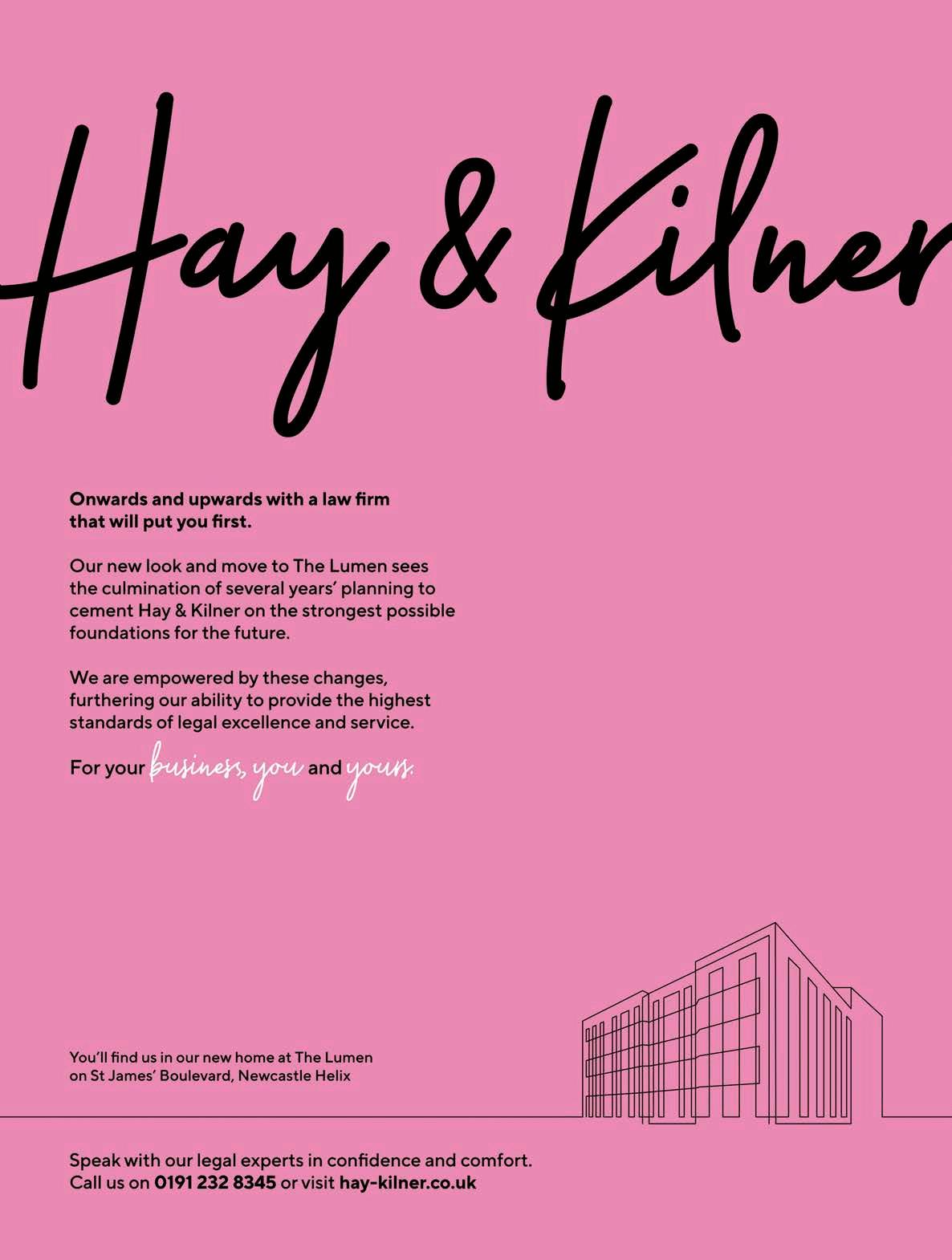





















 Words by Steven Hugill
Words by Steven Hugill
 Words by Steven Hugill
Words by Steven Hugill


 Words by Steven Hugill
Words by Steven Hugill




















































































 www.meliuscyber.com @MeliusCyber
www.meliuscyber.com @MeliusCyber




 Mouldings
Mouldings











































































